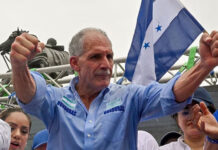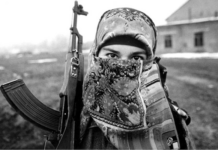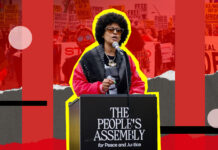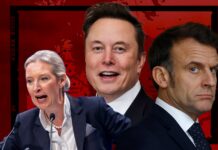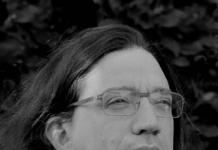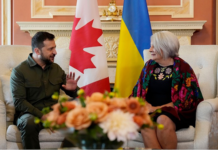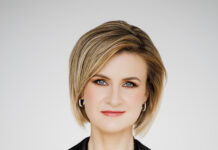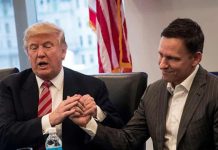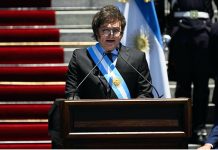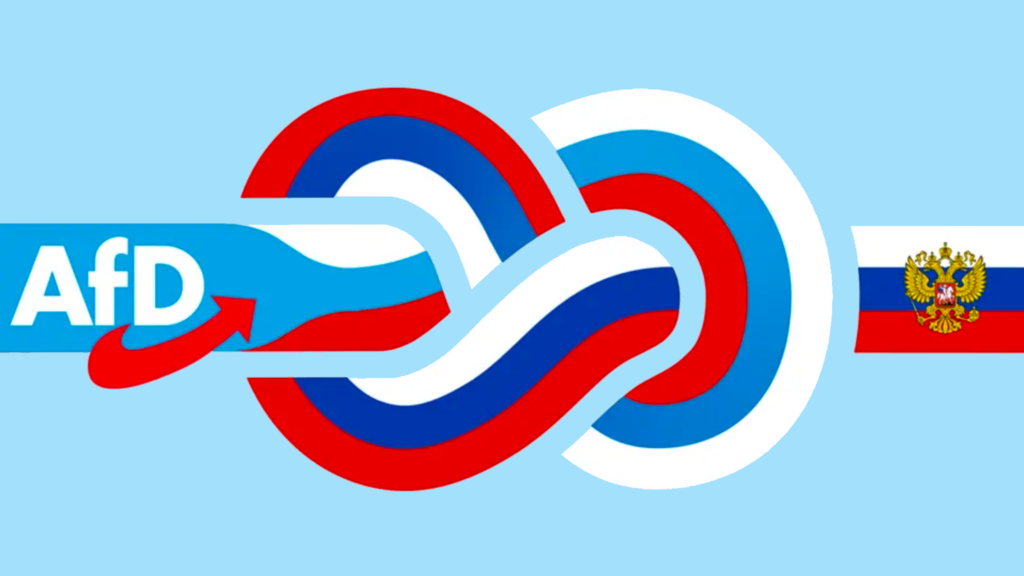
[This paper, also published at Political Capital, focuses on the connections of the Russian and German Right wings. Our goal is to share some of the most important information and analyses available. Some of our readers may be initially wary of criticism of Russia, as U.S. Democratic and Republican imperialist forces have recently been escalating their anti-Russian propaganda for several purposes. Nevertheless, it is important to recognize new correlations of forces that are emerging in the world today and not be afraid to understand and confront new realities.
At CAM, our concerns include “covert action” and the roles of political and military intelligence institutions in serving the interests of reactionary and imperialist interests.
Certainly, although for different reasons than in its Soviet past, Russia today does continue to resist the most aggressive initiatives from U.S. and other Western interests in Central Asia, the Middle East, Eastern Europe, and even in Africa and Latin America.
At the same time, following the fall of the Soviet Union, part of our concern with the “various shades of black” within the international fascist networks—often referred to as the “Black International,” we are interested also in the networks of Russian fascists and ultra-rightwing forces who were nurtured by the CIA since the end of WWII as part of the Agency’s anti-communist projects against the Soviet Union. During their period in exile—from before, during, and after WWI—those Russian networks worked with virulent anti-communist and racist structures and shared many of the anti-Semitic, homophobic, and racist views of the Western European Right.
It should come as no surprise that when those groups returned to Russia they linked up with the formerly underground fascist (and tsarist) networks which reemerged after the collapse of the Soviet Union and which had also been in contact with and received external support from the Western intelligence agencies.
These Russian fascists and reactionary networks are now reconnecting with and supporting their former allies and supporters in the West who had also been protected by the U.S. and Western intelligence agencies. When Marine Le Pen, for example, was unable to raise funding to support her political operations, the Russian networks arranged for loans of over 9 million euros for her. Alternative for Germany’s extremists receive regular media support from Russia Today (RT) and Sputnik. – Editors]
Executive Summary
- The Russian-German far-right relationship encompasses three ecosystems: first, the main German far-right party, Alternative for Germany (AfD), because of its electoral success and ability to influence “high politics”; second, several echo chambers—peripheral “think tank” institutions and individuals without visibility on the broad German political landscape; and third, the sport/martial arts/biker subcultures.
- The AfD has taken a decisively pro-Russian course ever since its inception in 2013, with its main figures repeatedly being invited to Crimea and Donbas and an explicitly pro-Putin stance on matters where the majority of German politicians have sided with official EU policies, particularly with regard to the sanctions that have been in place.
- Both sides appear to be profiting from promotion by the other, which enables the AfD to pretend to be a political player on the international stage and its Russian promoters not to appear as politically isolated as they truly are. Top-level AfD figures, as well as a wide range of Russophile German far-right figures, have been promoted on Russian state media, such as RT and Sputnik. Other promotional methods have included media amplification through bot-nets and the micro-targeting of voters on social media. The Russian media’s amplification of anti-migrant themes, anti-Merkel statements, and discourses opposing the EU, NATO and the United States figures resonate well with the German far right.
- The AfD has been canvassing the Russian-German minority in Germany—which, at approximately 2.5 million people, or around three per cent of the electorate, is the largest immigrant group eligible to vote— as potential voters. The party’s targeting methods include the translation of its party program into Russian, the establishment of Russian-German interest groups within the party (such as the Russian-Germans in the AfD), and the filling of MP positions with Russian-German repatriates.
- The second pillar of the Russian-German far-right relationship encompasses organizations on the periphery of the AfD that link some of the party’s politicians, as well as other far-right proponents, with Russian interest groups. This periphery plays an important role as an echo chamber for pro-Russian narratives. These include, in particular, organizations with a strong Eurasianist bent, such as Analytical Media Eurasian Studies (AMES) around Yuri Kofner and the German Center for Eurasian Studies (GCES), with links to the AfD and allegedly to Russian intelligence. To this should be added several figures particularly engaged in pro-Russian agitation, such as Manuel Ochsenreiter (with contacts to the neo-Eurasianist milieu), Markus Frohnmaier, Heinrich Groth and Waldemar Herdt, all involved in the formation of a political cross-front that is trying to network between elements of the far right and far left on the basis of a shared anti-Americanism.
- The third pillar of the relationship includes several far-right subcultures with a presence in both countries: the neo-Nazi milieu, with groups such as White Rex, and the hooligan and biker scene, most notably the Russian Night Wolves (NW). A unifying element of these scenes is their affinity for Mixed Martial Arts (MMA), particularly the Russian martial arts techniques of Systema and Sambo, which enjoy ever-increasing popularity in Germany.
Introduction
Today, Russia is seen as the “hidden hand” behind the antiliberalism that is sending shock waves through Europe as well as the United States. But while studying the role of Russia in these transformations is important, this should not obscure the main trend: Europe’s current illiberal moods are homegrown, shaped by a crisis of trust in the representative institutions of liberal democracy anddeep transformations of the nation-state, its welfare tradition and its ideological principles in a globalized world. Russia’s role in these transformations has to be understood more as an echo chamber than as a driver—even if some in the Russian establishment try to exploit European and U.S. political weaknesses.
To this should be added that the Russian state and its political establishment, too often presented in the Western media as a top-down pyramid, are in fact quite eclectic conglomerates of divergent interest groups with conflicting views of Russia’s path and role on the international scene—several of which do not support the current policy of befriending the European far right.[1] Last but not least, Russia is hardly unique in developing a policy of influence: China, Turkey, Saudi Arabia and Qatar engage in similar practices—Russia, of course, has an advantage in influence because it is historically, geographically, culturally and economically closer to Europe. Ignoring these three crucial facts—and especially the first one—can only distort analysis of and policy responses to the current crisis. With this in mind, the present paper therefore seeks to discuss the multifaceted ways in which several Russian actors provide support to the German far right.
Volumes have been filled detailing the cyclical patterns of Russian-German relations, which have moved from cooperation and alliance to hostility and outright warfare and back again. But neither anti-Soviet and anti-Slavic Nazi propaganda, the sea of dead in the ensuing World War II, nor the subsequent Red Scare in Western Europe, in particular West Germany, could eradicate the two countries’ fundamental interest in one another.[2] After reunification and into the early 2010s, diplomatic and economic contacts flourished under a strategic partnership. The two countries have developed diverse business linkages, with more than 6,000 German companies currently operating in Russia. This close economic collaboration has brought a certain familiarity to relations across the political spectrum, as well as decisive lobbying efforts by each for the interests of its partner. From 1998 onwards, during Gerhard Schröder’s chancellorship and Russia’s economic upswing under President Vladimir Putin, a cordial relationship developed between the two state leaders, leaving German-Russian relations the best they had been in a long time. It was during the Social Democrat Schröder’s tenure that the most important regular bilateral consultations were initiated,[3] paving the way for the now hotly debated Nord Stream 2 pipeline, which will transport Russian natural gas to Germany via the Baltic Sea.[4]
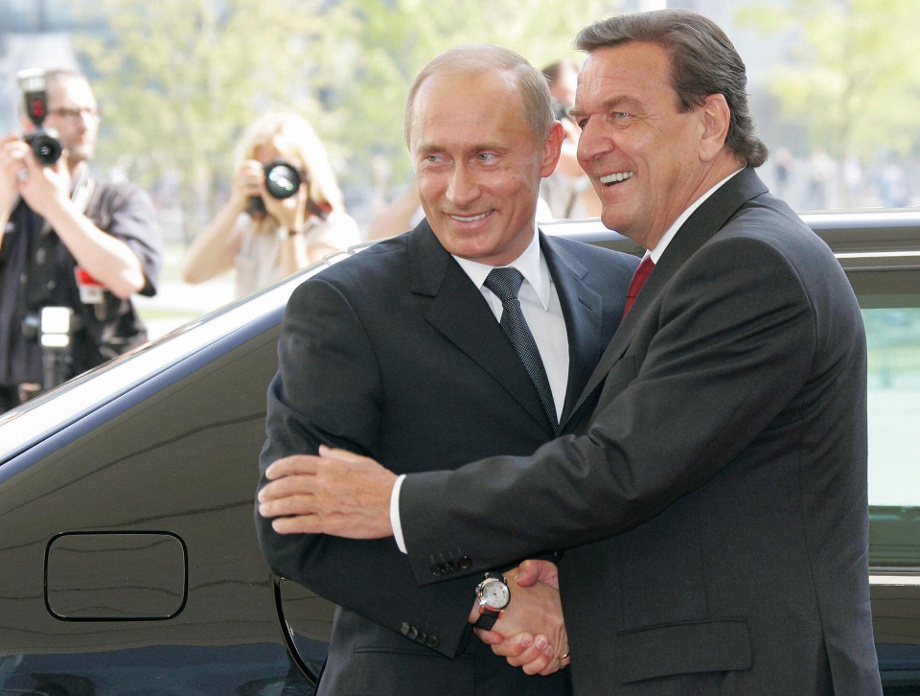
Since 2005, however, relations have been less cordial. Chancellor Angela Merkel has clashed with Putin over human rights and other issues on several occasions.[5] And this is nothing compared to the marked shift in diplomatic and economic relations that occurred due to the Ukraine conflict: The EU’s sanctions on Russia and Russia’s countersanctions caused the bilateral trade volume to decrease from €80 billion in 2012 to a mere €47 billion in November 2016.[6] This shift intensified with the allegations that Russia had been meddling in the democratic process of Germany and other Western countries. These began with reports about hacker attacks, allegedly of Russian provenance, in 2015 and 2016, in which the Bundestag network, military institutions and the communication platform of the federal administration were targeted.[7]
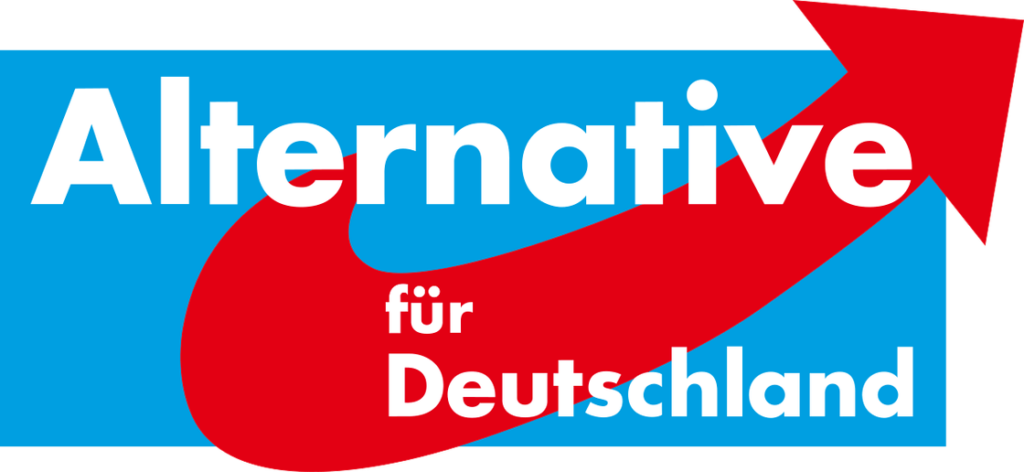
The culmination of the diplomatic crisis came after the German federal election in 2017, in which there were various instances of Russian interference, particularly around the promotion of the far-right Alternative for Germany (AfD). These include tricks ranging from media amplification to bot-nets, the micro-targeting of voters on social media, the targeting of the Russian-German minority as a voter base, and the courting of far-right politicians in Russian state media.[8] In turn, AfD politicians have publicly taken an explicitly pro-Putin stance on matters where the majority of German politicians sided with official EU policies, particularly with regard to the sanctions that have been in place since the annexation of Crimea. In April 2019, a joint investigation conducted by the BBC, Der Spiegel, the German TV channel ZDF and the Italian La Repubblica concluded that one of the main AfD candidates, Markus Frohnmaier, had likely requested Russian funding for his 2017 Bundestag election campaign, and recommendations were sent to a high-level official to Kremlin, Sergei Sokolov, by a former politician and naval counterintelligence officer to provide support for him as he could be “totally controlled” by the Kremlin.[9]
This alliance of Russian political forces with the extreme right-wing AfD, as well as with other far-right actors, has raised numerous questions: Is it, as it appears on the surface, a mutually beneficial arrangement? Is it an alliance on the basis of common values or political ideology? Is the AfD, demagogic and populist as it is, a tool to disintegrate Europe or to push it further to the right, as some claim?
To discuss these questions, this article explores the major interactions between far-right political actors in Germany and their Russian sympathizers in recent years. Researchers deem the AfD to be the most relevant of these,[10][11] but there are also other organizations, networks and individual influencers that should be examined in order to fathom the scope of these new alliances. Many researchers, who interpret these developments as a unilateral attack by the Russian government on the Western democratic system, fail to take into account the fundamentally homegrown aspect of the rise of the German far right and to differentiate between certain factions inside the Russian political ecosystem. This article not only tries to be more accurate in its designations, but also aims to look at German far right-Russian “collusion” in the context of an international neo-conservative resurgence where each side is profiting from the active support of the other. It dissociates three main ecosystems where Russian influence can be expressed: first, the AfD, because of its electoral successes and ability to influence “high politics” (that is, governmental decisions); second, several echo chambers—peripheral “think tank” institutions and individuals without visibility on the broad German political landscape; and third, the sport/martial arts/biker subcultures.
The AfD Ecosystem: Russia’s Pillar of Influence
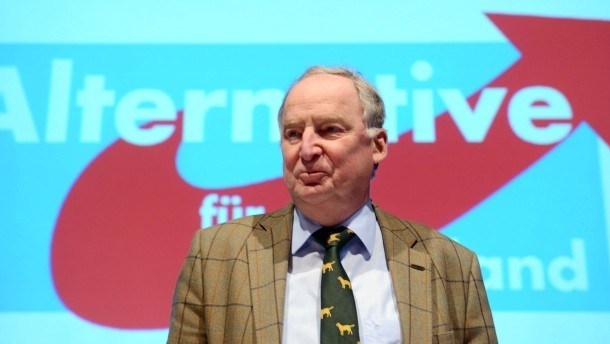
The AfD was founded in April 2013 by a group of right-wing Eurosceptics and moderate economic populists calling for Germany’s departure from the Eurozone, and no bailout for Greece. Since the rise of the völkisch and nationalist inner-party grouping called “The Wing” (Der Flügel) in 2015, it has made a pronounced rightward shift.[12] Instances of openly racist, anti-Semitic and historical-revisionist statements have become rampant among the party’s politicians and leaders, leading to the revival of national-socialist concepts and terminology.[13] Björn Höcke, now de facto sole leader of The Wing, has become known for his racist theorizing, e.g., differentiating between a “life-affirming African propagation type” and a “European placeholder type,” which led racism researcher Paul Jobst to describe him as having a “derogative, racist cadence,” engaging in “demagogic, völkisch-nationalist rhetoric,” and employing “crude fabrications,”[14] a description that would fit many of the party’s front-row agitators. One of the two AfD federal spokesmen, Alexander Gauland, has repeatedly made racist, revisionist and relativizing remarks, such as calling Hitler and the national socialism era only a “bird dropping” in Germany’s one thousand years of history[15] and alluding to the medieval millenarianist concept of the “Thousand Year Reich,” revived during the Nazi era. André Poggenburg, The Wing’s co-leader until August 2018, called people of Turkish origin living in Germany “stateless vermin” and alluded to Left party politicians as “malignant growths on the German nation’s body” (Wucherungen am deutschen Volkskörper).[16]
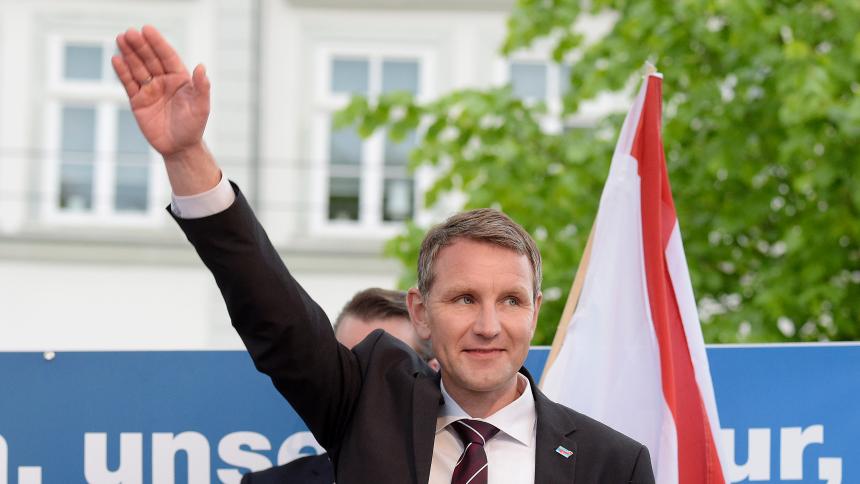
When the AfD burst onto the scene in 2017 with a decisively nationalist and populist campaign, it managed to gain 12.6% of the vote, becoming the largest opposition party in the Bundestag,[17] and has managed so far to keep its popularity on at least the same level. That the AfD opted for a pro-Russian course shortly after its inception is evidenced by a foreign policy position paper submitted by the party’s co-leader, Alexander Gauland, in 2013 in which he revamped elements of Otto von Bismarck’s appeasement policy toward Russia.[18] In order to forestall a two-front war, Bismarck had concluded in 1897 a secret neutrality agreement with Russia (the so-called reinsurance treaty), which provided that each party would remain neutral if the other became involved in a war with a third power, except in the event that Germany attacked France or Russia the Habsburg empire. Strategic partnership with Russia is a pillar of the current party program: “For the AfD, a relaxation of relations with Russia is a prerequisite for lasting peace in Europe. It is in Germany’s interest to include Russia in an overall political security structure without disregarding our own interests and those of our allies. The AfD advocates the termination of the sanctions policy. Economic cooperation with Russia should rather be expanded.”[19]
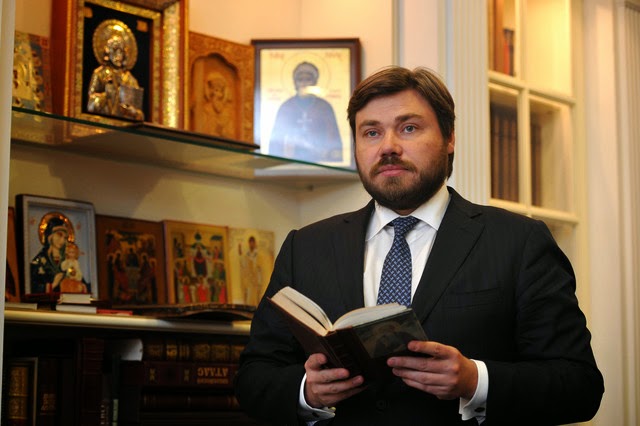
Gauland’s position paper also defined the party’s European policy, calling for an “orderly disintegration of the existing euro area”while maintaining the common internal market. Gauland, as well as many of his party colleagues, subsequently expressed decisively pro-Kremlin views.[20] In 2016, in the framework of an AfD rally in Stralsund, he called for an expansion of political and economic relations with Russia, and described the EU sanctions against Russia in response to the annexation of Crimea as “insanity.”[21] For his lip service, Gauland has received special appreciation from, among others, Russian oligarch and media mogul Konstantin Malofeev, whom the European Commission, the United States, and Ukraine have accused of trying to destabilise Ukraine and finance separatism there in close cooperation with nationalist forces inside the Kremlin. Malofeev stated “the performances of Dr. Gauland signal that Germany will become Germany again, just as Russia becomes Russia again under Putin.”[22] Malofeev’s Switzerland-based St. Basil the Great Foundation assumed Gauland’s[23] travel costs for a trip to meet with members of the Duma, the senator at the Federation Council Andrei Klimov,[24] and leading neo-Eurasianist ideologue and esoteric fascist Alexander Dugin in St. Petersburg in 2015.[25] According to Gauland, the AfD’s party committee was informed it was an “AfD trip.”[26]
Scholar of the European, Russian and Ukrainian far right Anton Shekhovtsov reported that Gauland also appeared at a filmed event in November 2014 organized by Jürgen Elsässer’s cross-front magazine Compact entitled “Peace with Russia—For a Sovereign Europe.” One of the speakers at this event was the oligarch Vladimir Yakunin, who expounded upon “an alleged loss of identity through alienation.”[27] Yakunin’s Berlin-based foundation, Dialogue of Civilizations[28] (DOC), is at the forefront of spreading Yakunin’s conservative and homophobic message among the German political establishment. Yakunin has previously teamed up with Konstantin Malofeev to support various conservative causes in Russia. For example, they both appeared as sponsors of the “International Forum ‘The Great Family and the Future of Humanity”’ in Moscow, organized in close cooperation with the Russian Orthodox Church. During a speech at this event, Yakunin claimed that four percent of Russian children were born homosexual because of a genetic defect, and that this deviation from the sexual norm was medically proven.[29]
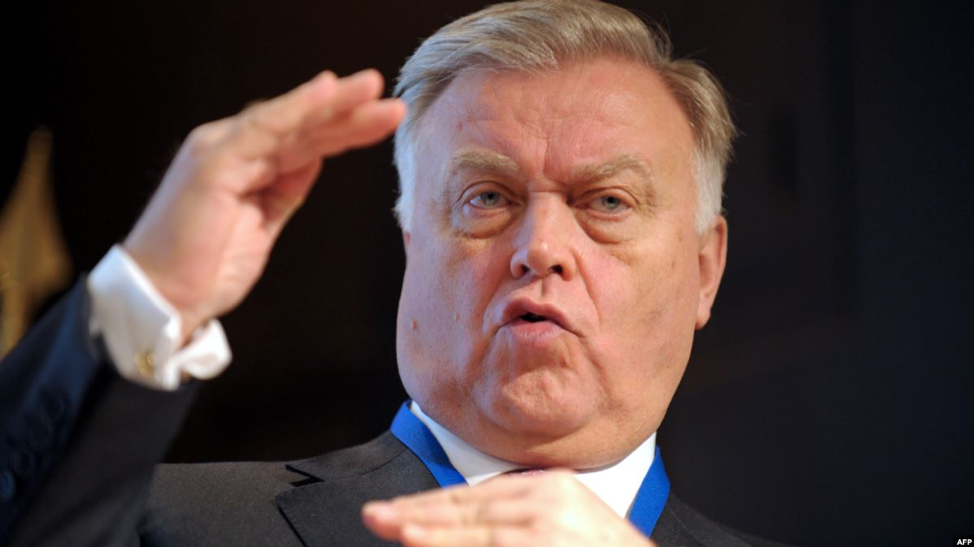
In February 2017, former AfD leader Frauke Petry, along with her husband, Marcus Pretzell, both AfD MPs at the time, along with Julian Flak, member of the AfD state and federal executive board, met chairman of the State Duma Vyacheslav Volodin and chairman of the Duma’s committee on international affairs Leonid Slutskii, as well as Vladimir Zhirinovsky, a well-known right-wing populist politician.[30] Their return flight in a private jet was paid by the Russian hosts, which fanned the flames of claims of collusion between the AfD and Russia.[31] Petry, who was an avid advocate for a strategic partnership with Russia and an alliance with Eurosceptic forces in the European Parliament, particularly the far-right parliamentary group Europe of Nations and Freedom (EFN), has since left the AfD due to what she described as a growing radicalization of the party.
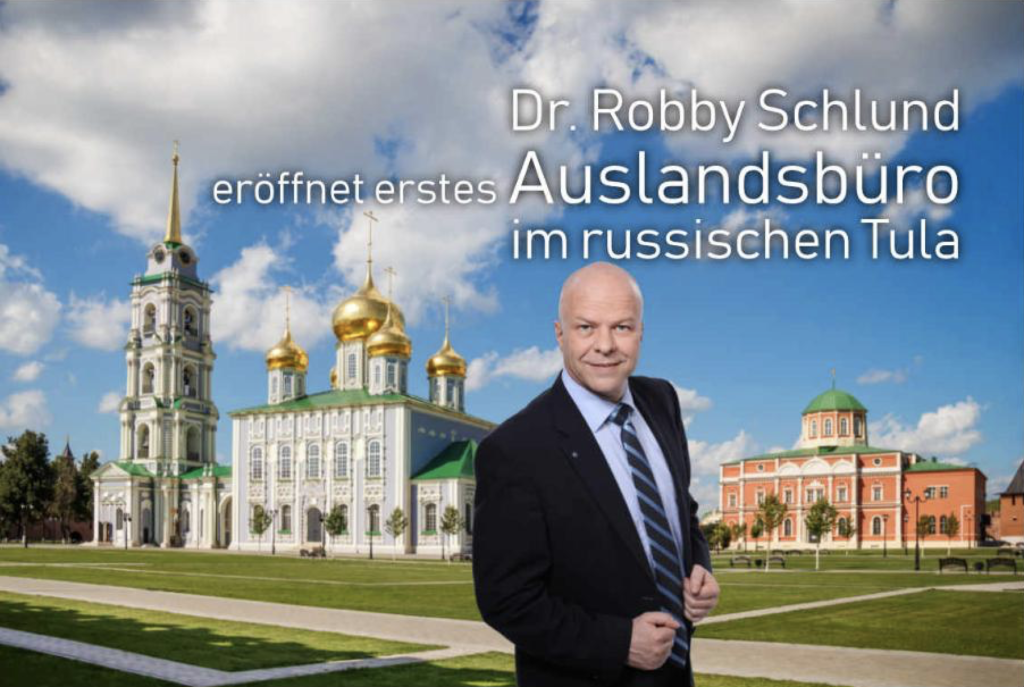
There have also been other high-level meetings between the AfD leadership and representatives of the Russian government. At the end of January 2018, Gauland and chairman of the AfD’s federal board Beatrix von Storch, both lawyers affiliated with The Wing, met the chairman of the Foreign Affairs Committee of the Russian Parliament, Leonid Slutskii, and two of his deputies in Moscow for an “informal exchange of ideas.”[32]
Although not part of the party leadership, MP Robby Schlund has recently become an important figure when it comes to business and party contacts with Russia. On June 14, 2018, Schlund became chairman of the German-Russian Parliamentary Group.[33] His election as chairman was preceded by an official meeting in Moscow on June 9, 2018, with Pavel Zavalnyi, a member of the Russian State Duma and Chairman of the Energy Committee, where they agreed on strategic topics for the group to discuss in the coming legislative period, according to Schlund’s website. This included the creation of “different informal working groups that bundle topics that will be discussed constructively between the members in the future.”[34] A few days later, on June 13, 2018, a meeting with the deputies Makarov and Simanovsky, both members of the State Duma’s Budget Committee, took place at the invitation of the group. “The participants of the meeting discussed in depth about important issues that move parliamentarians in Russia and Germany. Both sides reaffirmed that inter-parliamentary dialogue should be reactivated after a long period of stagnation.”[35] Having served as an election observer in the 2018 Russian presidential elections, and having also participated in the Yalta International Economic Forum (YIEF) 2018, Schlund had evidently begun expanding his Russian contacts before being elected head of the parliamentary group. Since his election, Schlund has not missed an opportunity to post photos and videos of himself with visiting Russian delegates, using these occasions as an AfD publicity stunt.[36]
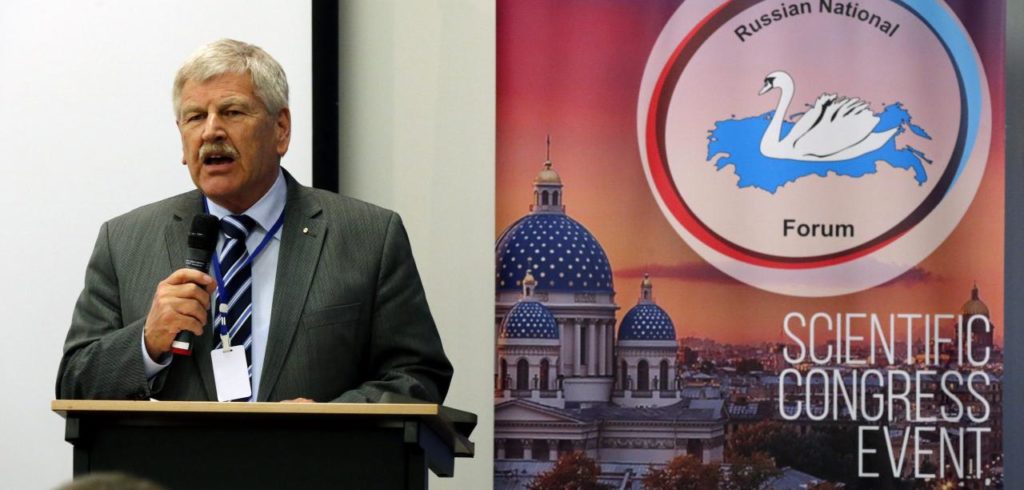
Besides the AfD, there have reportedly also been contacts between the German right-wing extremist National Democratic Party (NPD) and its Russian counterpart, the far-right nationalist Rodina party, led by former Deputy Prime Minister and former Russian ambassador to NATO Dmitrii Rogozin. A conference organized by the Rodina party, the International Russian Conservative Forum, which took place in March 2015, brought together Russian representatives and functionaries of Greece’s neo-fascist Golden Dawn, Italy’s New Force, Bulgaria’s Ataka, the MEP Udo Voigt, former leader of the German National Democratic Party (NPD), and Nick Griffin, former leader of the British National Party. Johann Gudenus, chairman of the parliamentary faction of the Austrian Freedom Party (FPÖ), was also slated to attend the meeting, but he cancelled shortly before the event.[37] Most of these parties are currently represented in the European party Alliance for Peace and Freedom, which held its first congress in the European Parliament just a month before the meeting. The Russian side was represented by “nationalist and monarchist circles, as well as groups of experts,” but no official government representatives.[38]
Russian Media Support for the AfD
The activities of Russian state media, particularly the German versions of RT and Sputnik, as well as their reception in Germany, have been discussed at length in several studies. All of these heavily criticize the former’s journalistic practices, charging RT with biased reporting, scandalization and the dissemination of conspiracy theories and fake news.[39] Whether or not political destabilization is their ultimate purpose, the amplification of anti-migrant themes, anti-Merkel statements, eschatological articles about the decline of Europe and the Western system as a whole, and favorable coverage of far-right figures resonate well with the German far right. Overall, it can be said that there are considerable intersections between German far-right discourses and those of Russian state media. Both share conservative and anti-liberal tendencies, with a common disregard for what are deemed liberal aberrations, such as abortion rights, the LGBTI movement or homosexual marriage. They also share anti-Western and anti-establishment discourses, opposing Merkel, the EU, NATO and the United States. Last but not least, they both aestheticize the power politics represented by “strong man” Vladimir Putin, extremely popular among the German far right and its voters as well, as indicated by a Pew Center poll that found that in Europe, voters of far-right parties are generally more favorable to Russia and Putin than the overall population.[40]
Explicit anti-Merkel agitation by Russian state media first came to public attention in the run-up to the German Bundestag election. Between September 2 and 10, 2017, RT dedicated only around one hour of airtime to Angela Merkel. A quarter of that was neutral reporting; three-quarters of the time, the chancellor appeared in a negative light.[41] The persistence of anti-Merkel statements is shown in recent headlines[42] such as ‘“There Are No Prospects for Merkel’s Policy Anymore,’ Says Expert”[43] and “Willy Wimmer Expects Showdown Soon: ‘Mrs Merkel Should Be Dismissed.’”[44] But it is not only Germany under Merkel that is portrayed as in decline. Sputnik and RT depict the Western world in general, and Europe in particular, as disintegrating at all levels: politically, economically, and morally. In a single day, the news platforms published articles under the following headlines: “End of Europe: Merkel’s Union Partner Accused of ‘German Brexit’ Plot,”[45] “Transatlantic Links Breaking Down” and “EU Turns Into Scattered Archipelago Failing to Find Migration Solutions.”[46]
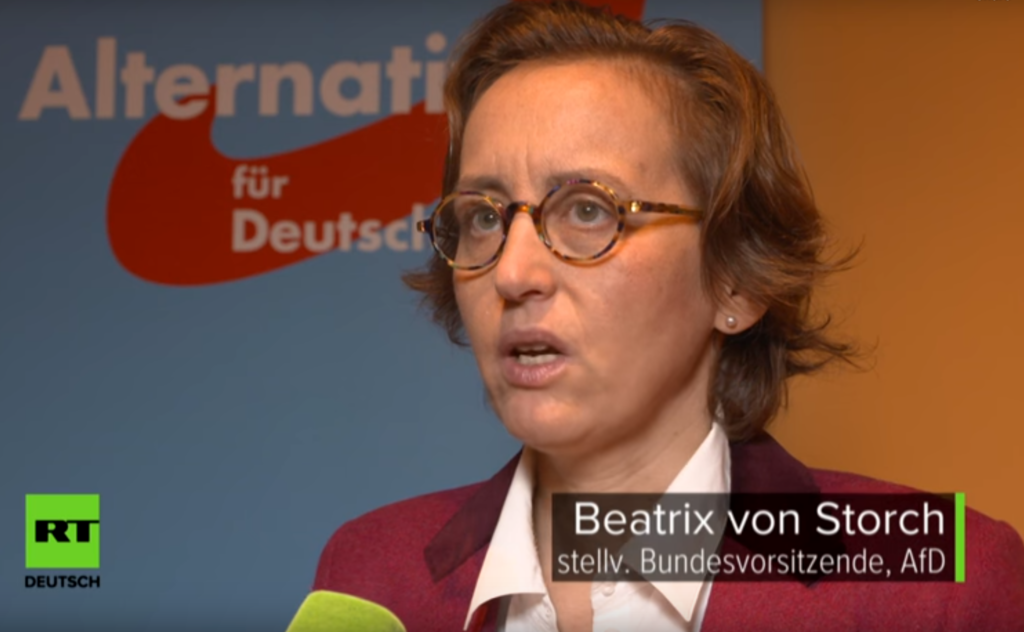
Von Storch is a granddaughter of the SA Standartenführer and last hereditary Grand Duke, Nikolaus von Oldenburg, and of Johann Ludwig Graf Schwerin von Krosigk, who was Reich Finance Minister under Adolf Hitler from 1932 to 1945.
Among the frequently featured AfD politicians on Russian state media are all the top-level party figures, such as Alexander Gauland, Beatrix von Storch, Alice Weidel and Markus Frohnmaier, but also a long list of second-tier AfD functionaries. Even AfD politicians who have been disavowed by mainstream media because of their racist remarks, such as Björn Höcke, are given airtime to present their ideas.[47] Although there is hardly any overlap in terms of their corps of journalists, RT and Sputnik seem to share a pool of German “experts” to interview, among them far-right proponents from the Identitarian movement, the New Right and the neo-Eurasianist orbit, as well as Third Positionists. Examples include one of the most eminent figures of the German New Right (Neue Rechte), the publisher Götz Kubitschek; neo-Eurasianist influencer and editor of the far-right magazine Zuerst! Manuel Ochsenreiter; and cross-front journalists Jürgen Elsässer and Ken Jebsen. The German versions of RT and Sputnik also give airtime to proponents of the international far right, such as Steve Bannon, Tommy Robinson, Paul Joseph Watson, alt-right poster girls Brittany Pettibone and Lauren Southern, and others.
Russian state media do more than simply offer the AfD a stage that mainstream German outlets do not provide. Research shows that RT and Sputnik are most popular on the political fringes in Germany, particularly among the far right, but also among non-voters, a group that has largely lost confidence in mainstream media and politics.[48] The AfD specifically targets this disgruntled “counter-public” as potential voters, and benefits from this group’s increasing entrenchment in an “alternative” media bubble that echoes the party’s discourses. In these circles, mainstream media are decried as “lying press” (Lügenpresse), while Russian state media are frequently referenced as reliable sources.
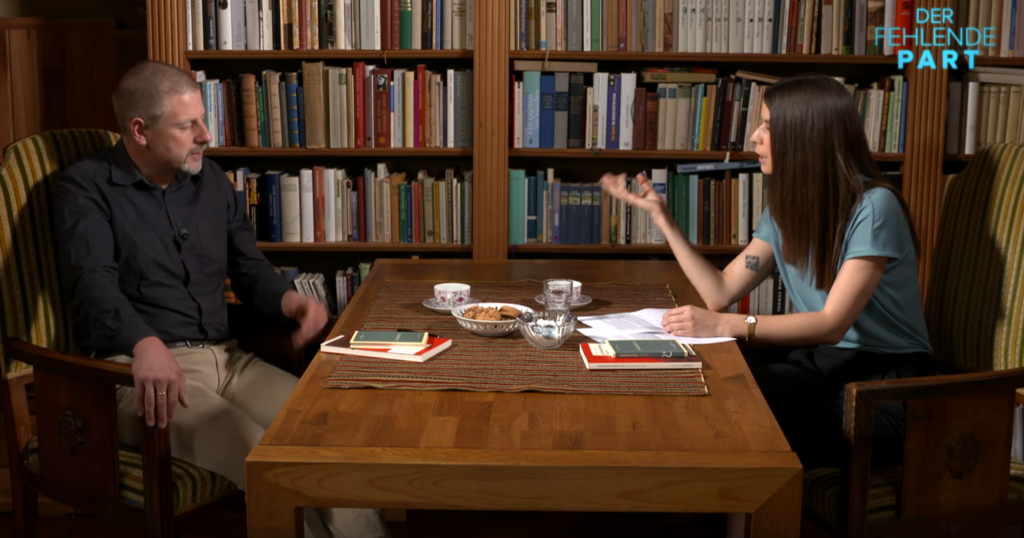
Russian state media likewise profit from their far-right audience in Germany. An analysis shows that next to supporters of the Russian government, their most active amplifiers are far-right and anti-migrant activists, especially from the AfD, some of whom have been known to work together to strategically “harass critics.”[49] “There is significant cross-over and ideological alignment between these communities. Primarily pro-Kremlin accounts also amplify anti-migrant messages; anti-migrant accounts also amplify the Kremlin’s geopolitical messages.”[50]
Amplification occurs not only on the basis of ideological alignment, but also—to a considerable extent—by deploying technological aids, which appear to benefit both the AfD and Russian state media. In the case of Sputnik, for example, anti-migrant stories “were amplified by pro-AfD Twitter accounts displaying automated or ‘bot-like’ activity,” boosting not only the broadcasters’ outreach, but also the AfD’s main political message.[51] Some of the pro-AfD bot net activity could be traced back to a provider inNizhnyi Novgorod who, upon being contacted, revealed that his services were for sale to anyone. The question as to who the original client was therefore remains open.[52] There is a chance (though no evidence) that this particular bot net is connected to the Petersburg-based Internet Research Agency, bankrolled by Yevgenii Prighozin, businessman and financier of the Russian mercenary organization Wagner Group, which has made headlines in the course of the Mueller investigation into Russian collusion during the run-up to the 2016 U.S. presidential election.[53]
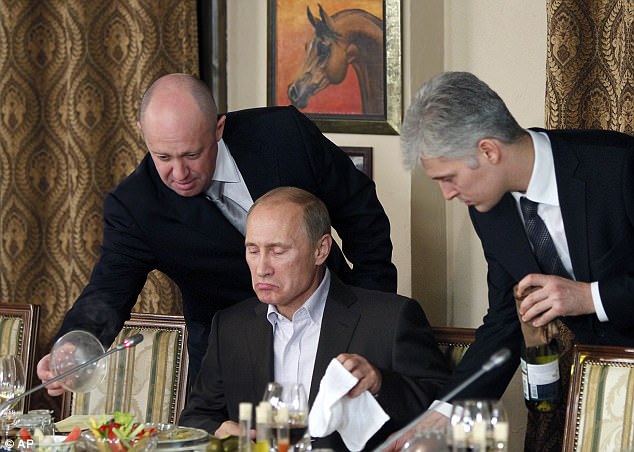
Another instance of Russian media support for the AfD is the case of the Wiesbaden-based TV company Kartina Digital GmbH, which distributes some 160 Russian-language TV programs in Germany. The company had aired AfD campaign advertisements during Russian TV programs in the run-up to the 2017 election, specifically targeting Russian-speaking voters.[54] For example, on September 23, 2017, the AfD’s party logo and a Russian translation of its campaign slogan (“Let’s vote AfD! For our common future”) were displayed during the running program of “Live” with Andrey Malakhov on Rossiya One.[55] One of the shareholders of Kartina Digital, the oligarch Victor Gushan, owns Sheriff, the largest Transnistrian company, which operates gas stations, TV stations, supermarkets, hotels and mobile networks. “Victor Gushan has ties to the Kremlin by way of his holding Sheriff, which is something like a state inside the state within the pseudo-republic of Transnistria,” explained Russia expert Wilfried Jilge of the German Council on Foreign Relations. “And the pseudo-republic is an outpost in Putin’s Russian world.”[56] The federal office of the AfD denied any involvement in the advertising campaign and stated that it does not know the client.
Canvassing the Russian-German Minority
The AfD is the first party to actively court the 2.5-million-strong Russian-German community, which, at around three per cent of the electorate, is the largest immigrant group eligible to vote.[57] The party’s targeting methods include the translation of its party program into Russian, the establishment of Russian-German interest groups within the party and filling MP positions with Russian-German repatriates.[58] Germany’s Russian-German constituency is comprised largely of a wave of immigrants who arrived during the Helmut Kohl era in the 1980s, when German minorities living in the Soviet Union were allowed to resettle. In gratitude to Kohl, and in line with the conservatism prevalent within those communities, a majority of Russian-Germans traditionally voted for the Christian democrat CDU. As they became disgruntled by subsequent developments, such as the interdiction of family reunions and the non-recognition of their qualifications, however, a turn away from the conservative center party took place.[59]
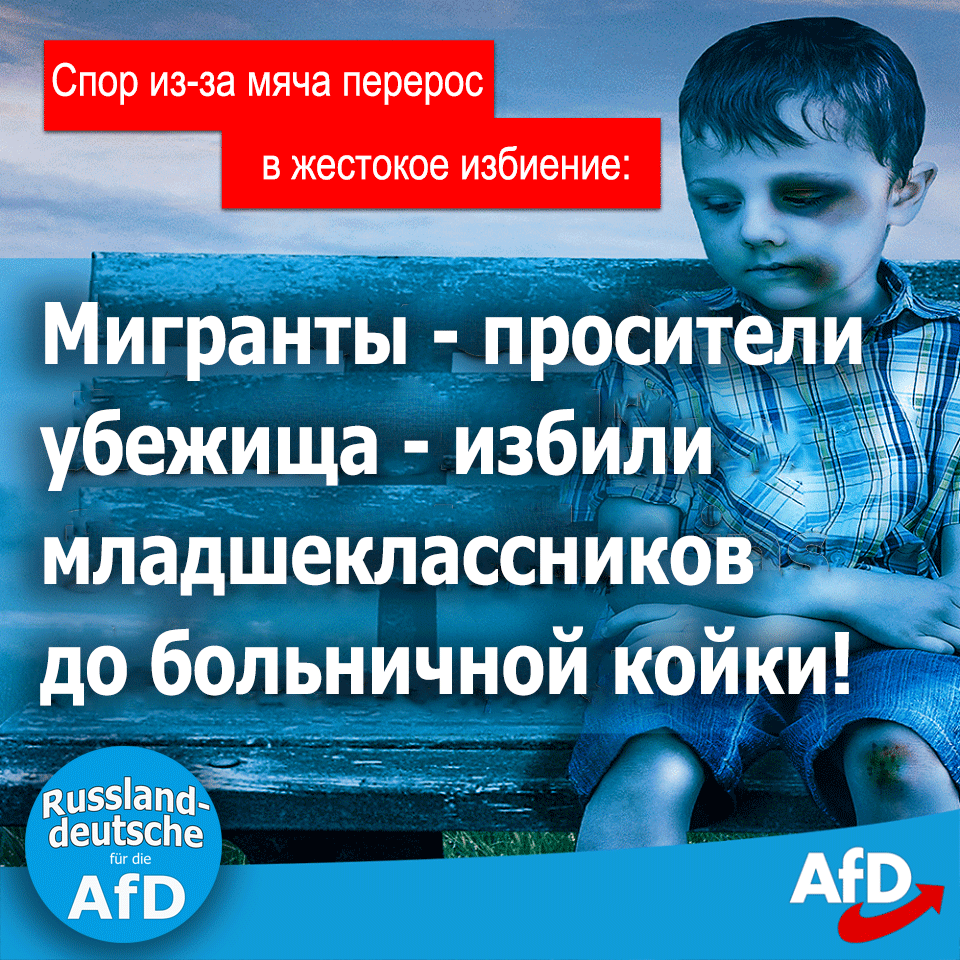
The AfD used this climate of dissatisfaction to lobby for its cause. As a vehicle for this effort, it established inner-party groups on a state and federal level, the first of which was the Russian-Germans in the AfD North Rhine-Westphalia (Russlanddeutsche für die AfD Nordrhein-Westfalen, RGA/NRW), founded in April 2016 and led by municipal AfD politician Eugen Schmidt. Schmidt, a Russian-German of Kazakh origin, has since appeared onmajor Russian TV channels, where he has discussed traditional values and spoken out against refugees.[60] The AfD’s decision to start by targeting Russian-Germans in North Rhine-Westphalia may have been a strategic one, since the state has a large Russian-German community. The success of the targeting is evident from the party’s exceptional performance in this and other regions with a high concentration of Russian-Germans, with results above 40% in certain districts.[61]
Two years after the foundation of the RGA/NRW, a federal group called Russian-Germans for the AfD (Russlanddeutsche für die AfD, RGA) was established in April 2018.[62] The group, also chaired by Eugen Schmidt,offers a bilingual website and serves as an interface between the AfD and the Russian-German community. Among the RGA’s board assessors are two AfD MPs, Waldemar Herdt and Dietmar Friedhoff, both of whom have established extensive Russian contacts. Herdt is a Russian-German of Kazakh origin who after his repatriation to Germany in 1993 became an important spokesman of the Russian-German community. Friedhoff, a member of the AfD since its inception, is a member of the Committee on Economic Cooperation and Development and deputy member of the Defense Committee in the German Bundestag. Both Friedhoff and Herdt were part of the group that monitored the 2018 Russian presidential election, together with other AfD politicians, among them Markus Frohnmaier, Robby Schlund, Anton Friesen and Stefan Kotré.[63] Like Herdt, Friesen, a Thuringian, is a Soviet-born AfD politician with a Bundestag mandate (there are several others on the state level). Having two politicians who were born in the former Soviet Union in the Bundestag is a novelty, since previously Russian-Germans were not represented in Germany’s political institutions in any significant way. This of course speaks to the Russian-German constituency, which may finally feel represented politically.
Visits to Crimea and Donbas
Several delegations of AfD politicians have been invited to Crimea and Donbas to engage in electoral monitoring missions, to acknowledge “referenda”[64] or to attend conferences. In turn, members of the party have gone on the record with Russian and German media to underline the legitimacy of the annexation of Crimea or the futility of the EU’s sanction policy.
Between February 3 and 9, 2018, a delegation of nine AfD politicians visited the annexed Crimea. Although the journey was claimed to be of a “private”nature, it certainly served political purposes. In a press statement about the sanctions imposed on Russia, MP Roger Beckamp said, “We see these sanctions very critically, which, by the way, probably also applies to the AfD as a whole.”[65] No members of the Bundestag were part of the delegation, which was largely comprised of politicians from different state assemblies.[66] Besides RGA leader Eugen Schmidt, one other delegation member, Gunnar Lindemann, has since developed extensive Russian connections and frequently visits Russia. Lindemann, an AfD politician and deputy for Berlin Marzahn in the Berlin City Parliament, represents a district with a large Russian-German community where the AfD could score a record victory. Whereas the Russian public saw Lindemann as a German politician on a diplomatic mission, he has attracted negative attention in the German media for publicly appearing with proponents of the right-wing extremist milieu, among them neo-Nazis and NPD functionaries.[67] Furthermore, there have been reports of Lindemann making xenophobic comments on social media and being a member of groups in which nationalist and anti-Semitic content is rampant.[68]
AfD politicians have also reportedly participated in the Yalta International Economic Forum (YIEF), established in 2015 by the “government of Crimea”with support from the Russian presidential administration. The cast of the 2018 German YIEF participants is telling. With the exception of Die Linke politicians Andreas Maurer and Christos Tsibliaridis, only AfD politicians attended the fourth annual forum, among them Markus Frohnmaier, Gunnar Lindemann, Robby Schlund, Ulrich Oehme, Stefan Keuter, Waldemar Herdt and Eugen Schmidt.[69] Other German participants included cross-front journalist Ken Jebsen,[70] as well as the Russian-German Sergei Filbert, both of whom run websites that are considered decisively pro-Russian.[71] When some delegates were questioned by journalists upon their arrival in Yalta, Roger Beckamp (AfD NRW) stated, “Crimea is not occupied by the Russians. It is now part of Russia again, because people here want to be part of Russia. Most of the people we met are happy to be back home in Russia. The sanctions are the problem that make life difficult for those people.”[72] During a special meeting in the course of the YIEF conference, the AfD delegates met with the highest-ranking politicians from Crimea’s administration, including its president, Sergei Aksionov, as well as Yurii Gempel,[73] whose NGO, German National-Cultural Autonomy of the Crimean Republic (GNCAC), reportedly extended the official invitation to the AfD delegation.[74]
The GNCAC is a Crimean offshoot of the Rebirth (Wiedergeburt) movement, having formed in the perestroika period to represent the interests of the dispersed Russian-German minorities in Russia.[75] The organization is a contact point for Russian-Germans who, their ancestors having been expelled from Crimea in 1941, now want to repatriate. Yurii Gempel, former chairman of Rebirth and now GNCAC, is the current figurehead of the organization. According to its website, the GNCAC received funds “allocated as a grant in accordance with the decree of the President of the Russian Federation” at least up from 2015 for its People’s Diplomacy (Narodnaia Diplomatiia) project entitled “People’s Diplomacy—The Truth about Crimea. Reality against Myths.”[76] The German Die Linke politician Andreas Maurer,[77] as well as the Norwegian Hendrik Rosenlund,[78] appear as the European faces of the Crimean People’s Diplomacy project, and they often travel together to Russia, Crimea and Donbas.
Maurer is largely unknown in Germany, but quite a household name on Russian television and in the press. Between 2017 and 2018, Maurer, who sees in the occupation of the Crimea no annexation “but a reunification,” organized six delegations to the Crimea, as well as one to Donetsk in February 2018.[79] He was also part of the team monitoring the Russian presidential election in 2018. In the period of one year, from September 2017 to summer 2018, he travelled more than ten times to Moscow alone, appearing mostly under the People’s Diplomacy (Volksdiplomatie) banner, which raises the question of who is financing all this lavish travel.[80] Facebook photos showing Maurer with Vladimir Putin and Prime Minister Dmitry Medvedev, among members of the Russian Orthodox biker gang Night Wolves in Crimea, and with governor of Chechnya Ramzan Kadyrov in Grozny hint at how high Maurer’s Russian contacts reach.[81]
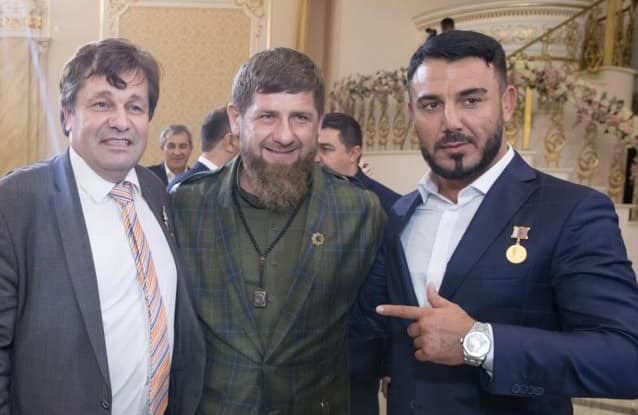
Maurer has also built a large network of European Russophiles, many of them from the neo-Eurasianist and far-right orbit, even though he himself is a politician of Die Linke. Among his Facebook friends are the daughter of neo-Eurasianist ideologue Alexander Dugin, Daria Dugina; one of the leaders of the Belgian Vlaams Belang, Frank Creyelman; the AfD politicians Gunnar Lindemann and Waldemar Herdt; and the Belgian cross-front agitator Kris Roman, with whom he has appeared on various occasions.[82] He can also be seen with the far-right neo-Eurasianist editor Manuel Ochsenreiter, an acquaintance of Roman, as part of a delegation laying flowers at a memorial to the dead residents of Donbas.[83] Although Maurer has recently been handed a seven-month sentence on grounds of electoral fraud in his home district of Quakenbrück, and can be considered politically insignificant in Germany, he is presented to the Russian audience as an important personality.[84] This certainly gives credibility to the Moscow leadership, and makes it appear less isolated internationally than it really is. That Maurer’s and Gempel’s People’s Diplomacy project is in close coordination with Russian governmental supporters is evidenced by their frequent trips to Moscow, most recently in October 2018, when, according to Maurer, they met with State Duma representatives and people from the foreign ministry.[85] It is not entirely clear why Maurer, an ostensibly leftist politician, appears predominantly among far-right figures, but this suggests that there is some kind of cross-front, Third Way activity going on, or else he has a subversive role within Die Linke. It also shows how much ideological boundaries on the European political landscape are currently shifting. The cooperation of the radical right and radical left in Russia-related issues is not a phenomenon that is limited to Germany: Research by Political Capital found that, at the European Parliament, fringes on the left and right are voting most often in favor of Russia.
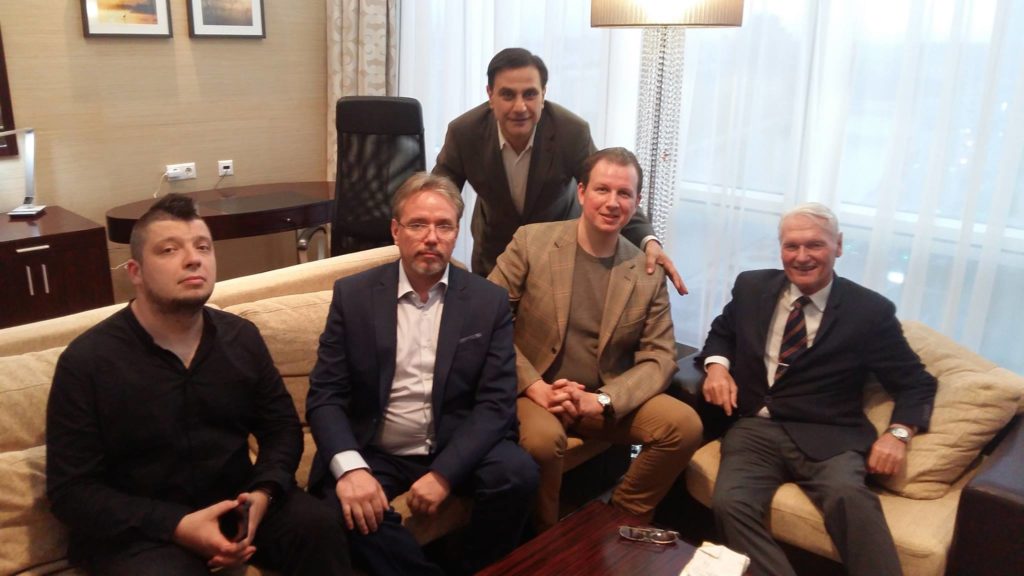
It is possible that the Crimean People’s Diplomacy project is connected to a Russian NGO of the same name (Narodnaia diplomatiia),[86] funded by federal grants with the aim of “monitoring the observance of human rights and freedoms in the territory of the former USSR and Western countries.”[87] Contrary to its official description, the Russian People’s Diplomacy project is not a humanitarian grassroots movement, but an influence campaign headed by extreme right-winger Aleksei Kochetkov, which has been inviting international figures of the far right and left to election-monitoring missions and conferences. Kochetkov has been involved in the right-wing radical scene in Russia since the 1990s. To this day, he writes articles for nationalist publications, and is working for the CIS-EMO, a Kremlin institute for “election observation,” the real purpose of which is to legitimize elections that are not acknowledged by OSCE, particularly in former Soviet countries.[88]
The Echo Chambers Ecosystem: Peripherical Groups and Individuals
There are several organizations on the periphery of the AfD that link some of the party’s politicians, as well as other far-right proponents, with Russian interest groups. This periphery plays an important role as an echo chamber, helping accentuate resonances and amplify the impact of narratives transmitted by these small groups.
German Center for Eurasian Studies
One of these organizations is the German Center for Eurasian Studies[89] (Deutsches Zentrum für Eurasische Studien, GCES), founded in spring 2016 by then-federal chairman of the AfD youth group Young Alternative (Junge Alternative) Markus Frohnmaier, far-right journalist Manuel Ochsenreiter, the Thuringian AfD MP Thomas Rudy, and the Polish neo-Eurasianist publicist Mateusz Piskorski. The GCES can be considered the German branch of Piskorski’s European Center for Geopolitical Analysis (ECAG).[90] For the 2014 Crimean referendum, Piskorski’s ECAG organized an electoral observation delegation including a total of 30 right-wing populist parliamentarians from ten EU countries. According to the German intelligence services, €270,000 was provided to the delegation by Russian sources at the time, and there were indications that the observer mission was significantly influenced by the Russian intelligence services.[91] In a classified report, Piskorski was presented as a paid pro-Russian agitator.[92] Despite Piskorski’s detention in May 2016 by Poland’s Internal Security Agency, the Berlin association began its activities under Ochsenreiter’s leadership.
In July and September 2016, Ochsenreiter, AfD MP Thomas Rudy and AfD Landtag delegate Udo Stein embarked on electoral observation missions to Donetsk and Luhansk. The GCES subsequently stated that the primaries were not violating any provisions of the Minsk Agreement.[93] The event was also reported on the website of Konstantin Malofeev’s think tank Katehon, to which Ochsenreiter and Frohnmaier frequently contribute articles.[94] The GCES’s website names the Polish online platform geopolityka.org, its Serbian counterpart geopolitika.rs,[95] and the Journal of Eurasian Affairs,[96] edited by Leonid Savin, as its cooperation partners, all three outlets belonging to the neo-Eurasianist media multiverse. As of 2018, the Journal of Eurasian Affairs’ advisory board includes Alexander Dugin and Mateusz Piskorski; it also features an illustrious range of far-right authors, such as Manuel Ochsenreiter and Claudio Mutti, the publisher of the Italian neo-fascist quarterly Eurasia, all of whom also contribute articles to Katehon.[97] According to Ochsenreiter, the GCES has been almost inactive and destitute since the arrest of his friend and business partner Piskorski. Nevertheless, the remnants of the GCES continue their own respective projects and, given that Markus Ochsenreiter had been official scientific adviser to MP Markus Frohnmaier, neo-Eurasianist discourses may well have been further anchored in the AfD.
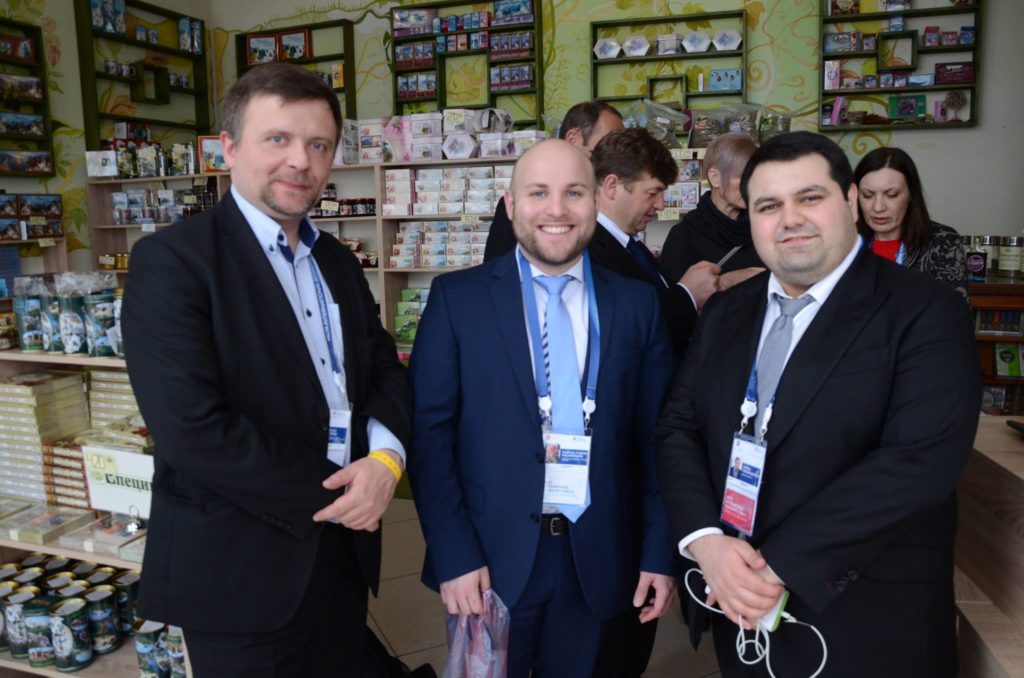
Analytical Media Eurasian Studies (AMES)
The Analytical Media Eurasian Studies (AMES)[98] think tank,led by the Russian-German Yuri Kofner and, according to Weidinger et al., “pushing the Eurasian ideology Dugin established,” brings together several important figures from the German, European and Russian far rights.[99] Kofner, a resident of Munich, spends considerable time in Moscow, where he studied at the prestigious Moscow State Institute of International Relations (MGIMO).[100] Judging from his frequent trips to relevant conferences, visible in his social media activity, his organisation must have access to rather vast resources.[101] The high level of his connections is revealed in pictures of him with Russian Foreign Minister Sergey Lavrov, former Austrian Chancellor Wolfgang Schüssel, and Russian oligarch and financier of the Berlin-based foundation Dialogue of Civilizations Vladimir Yakunin.[102]
Looking at the biographies of the German-speaking members, they appear to be important figures in the Austrian and German far rights.[103] The Austrian Maximilian Dvorak-Stocker, active in the Identitarian movement,[104] is the son of far-right publishing magnate Wolfgang Dvorak-Stocker, owner of the publishing house Leopold-Stocker-Verlag, which has shares in the FPÖ-affiliated far-right web magazine unzensuriert.at. Following in the footsteps of his father, Dvorak-Stocker runs the Ares publishing house, which has a vast catalogue of contemporary far-right authors, particularly from the German and Austrian Neue Rechte,[105] and also publishes the far-right quarterly Neue Ordnung (New Order). The German Philipp Liehs, member of the duelling fraternity Alemannia Leipzig, leads the Renovamen publishing house, which specializes in the German far-right canon, particularly the work of Oswald Spengler, but also translations of contemporary far-right publications such as Alexander Dugin’s Fourth Political Theory and Daniel Friberg’s The Real Right Returns. Liehs is also involved in the Patriotic Platform (Patriotische Plattform), an association of völkisch-nationalist AfD members headed by one of the most important ideological power brokers of the AfD, Hans-Thomas Tillschneider.[106]
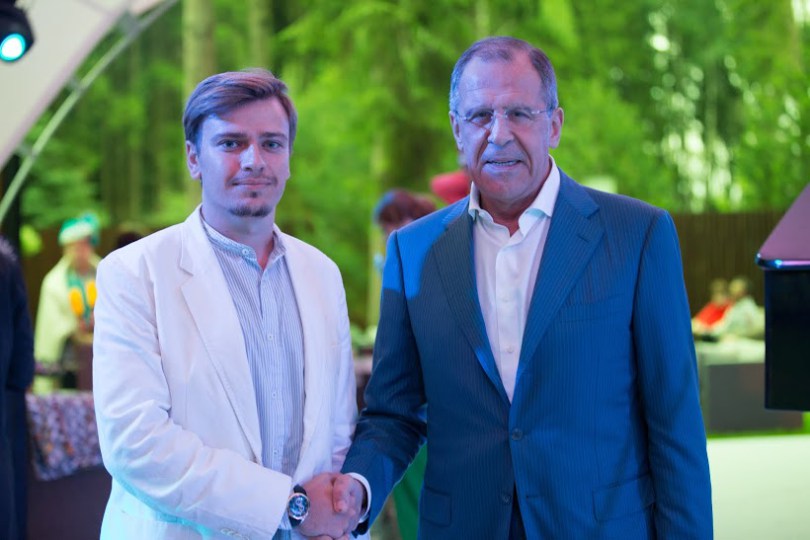
Another member of the AMES board, head of the Austrian Suworow Institute Patrick Poppel, has established direct contacts with the Russian Institute for Strategic Studies (RISI), known for its proximity to the Russian security services.[107] Poppel has taken on the task of fostering the proto-paramilitary Russian Orthodox organization Sorok Sorokov in Austria, and also has ties to the Austrian branch of the Russian Systema martial arts school (see below), several Cossack organisations and the Identitarian movement.Tobias Pfennig, alias Nase, heads the Munich-based Anti-Imperialist Action (Anti-Imperialistische Aktion), a pseudo-antifascist organization that aims to team up with proponents of the radical far right and far left, particularly in Russia, Eastern Europe and Donbas. Not represented on the AMES board, but nevertheless strongly affiliated with its activities, is cross-front agitator and journalist Jürgen Elsässer. With his web magazine, Compact, Elsässer, a former left-wing journalist who has turned to the far right, offers a platform for pro-Russian contributors who are aligned with his vision “Not left, not right, but forward,” among them Yuri Kofner and Patrick Poppel.[108] On October 21, 2015, Kofner posted a photo on Facebook showing him at a Valdai Club[109] meeting with an edition of the Compact magazine in his hands, headlined “War Against Putin” (Krieg gegen Putin).[110] Among the people tagged in the photo were head of the German Identitarians (Identitäre Bewegung) Daniel Fiß, far-right German publisher Kai Homilius, Ochsenreiter, Elsässer, and head of the Austrian Identitarians Martin Sellner (since then suspected of links with the white supremacist responsible for the Christchurch mosque shooting[111]), as well as Poppel and Alexander Markovics from the Suworow Institute. This indicates that a network linking this Russophile far-right cast existed as of 2015. According to Weidinger et al., “The goal seems to be the creation of a pro-Russian counter-public in the German-speaking public, where different actors can appear as ‘experts’ on certain topics”—a counter-public that “can influence the public discourse in Germany and other German-speaking countries.”[112]
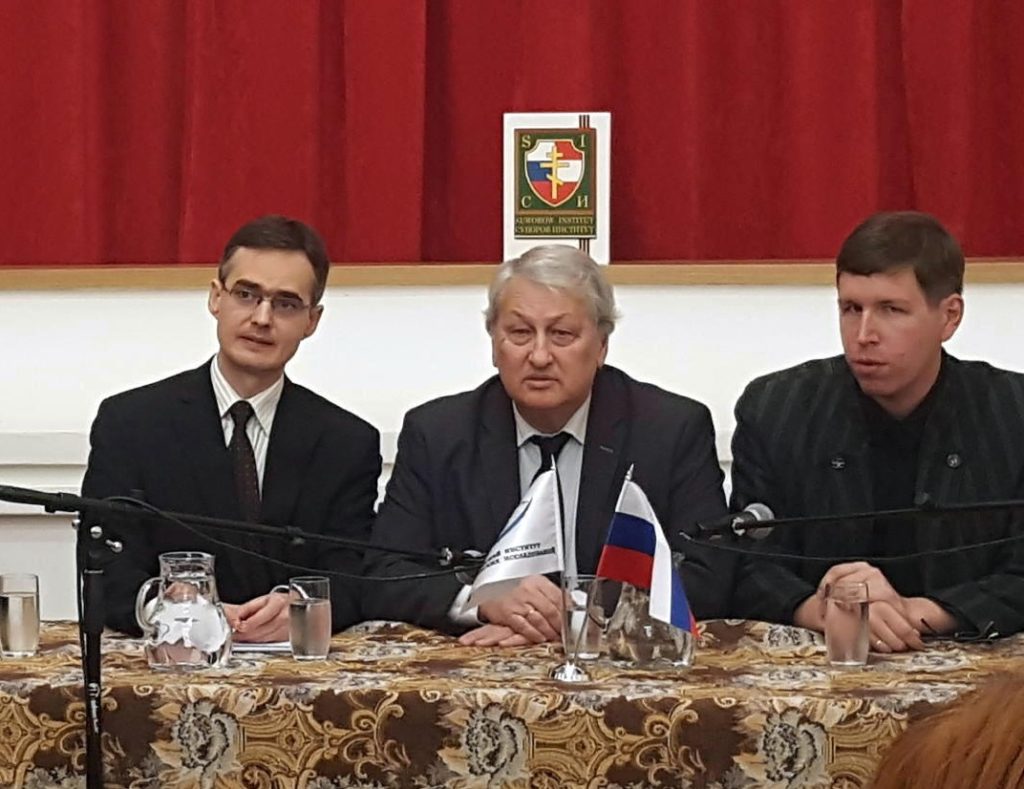
Manuel Ochsenreiter
Manuel Ochsenreiter is one of the most important actors in the German Russophile and neo-Eurasianist far right. From September 2018 until January 2019, he had been an official adviser to AfD spokesman Markus Frohnmaier.[113] Besides contributing to the right-wing extremist publications Junge Freiheit (Young Freedom) and Deutsche Militärzeitschrift (German Military Magazine), he is the editor-in-chief of the German far-right journal Zuerst!, launched in 2010 as the successor to Nation Europa (1951-2009), a notorious German nationalist publication that for almost 60 years acted as a gathering-point for former Nazi elites. The magazine was founded in 1951 by former SS Sturmbannführer and Chief of Anti-Partisan Warfare Arthur Erhardt and the Nazi poet and former SA Obersturmführer Herbert Böhme.
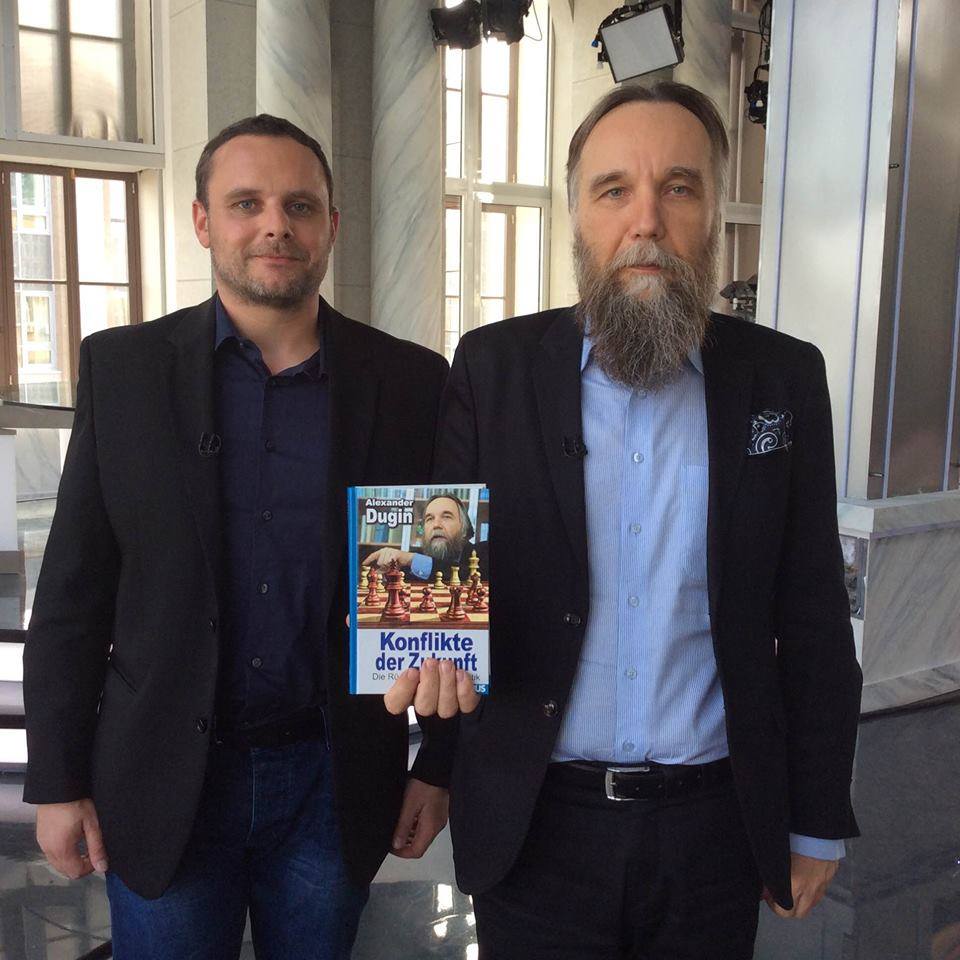
An important contributor was Karl-Heinz Priester, former director of Kraft durch Freude, a large state-operated leisure organization in Nazi Germany. After the war, he became involved in the neo-fascist circles around the European Social Movement.[114] A close collaborator of notorious Nazi intelligence asset Otto Skorzeny, who was living in hiding in Francoist Spain at the time, Priester attempted to utilize the magazine Nation Europa to promote the idea of an ethno-pluralistic united Europe, a “Nation Europa,” ideas that today resonate in the Identitarian movement.[115] Other eminent figures of Nation Europa included former SS Obersturmbannführer Helmut Sündermann, one of the most senior national-socialist journalists, and important propagandists of the Third Reich, as well as Gottlob Berger, notorious former SS Obergruppenführer and general of the Waffen-SS.
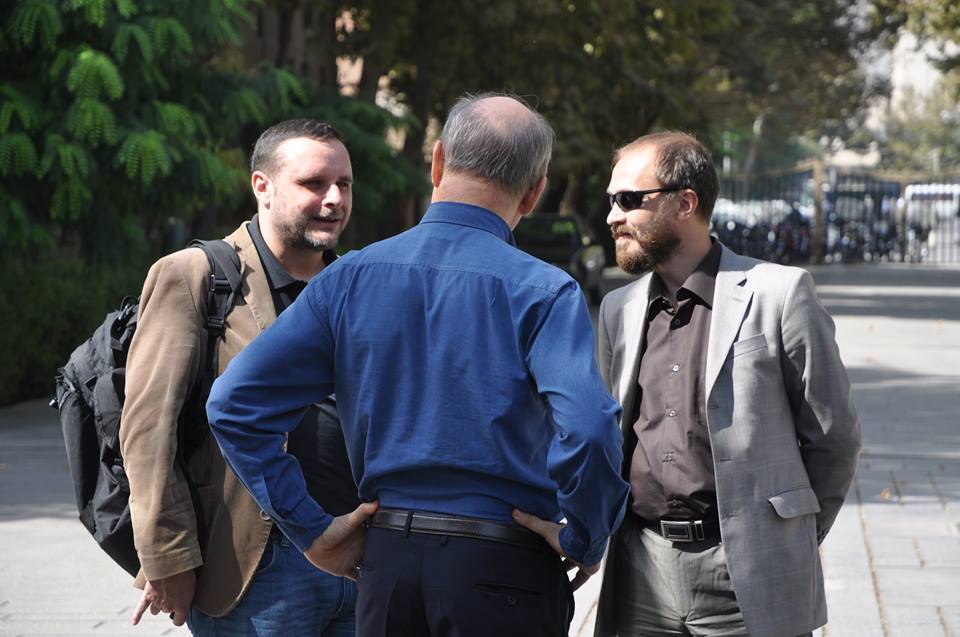
a.497558750347806/498785800225101/?type=3&theater]
While standing in a long line of extremely well-connected Nazis, Ochsenreiter has established contacts to central figures of the neo-Eurasianist far right over the years. His activities on the political scene in the Middle East and in Donbas have not gone unnoticed by the press, and have raised many questions as to his political motives. In his website’s photo gallery, he can be seen at a Ba’ath party meeting in Lebanon in 2009, at a meeting with Hezbollah officials in Lebanon in 2011, with a Shiite cleric in Tehran in 2012, or with Alexander Dugin in Germany in 2013.[116] His contacts to the neo-Eurasianist far right date back to at least 2012, when he attended the second anti-Semitic New Horizons[117] conference in Iran, known for bringing together figureheads of the international far right and the neo-Eurasianist scene.[118] It was there that he met Mateusz Piskorski, with whom he would found the GCES in 2016. Ochsenreiter first appeared with Alexander Dugin in 2013. These contacts intensified in 2014 when Ochsenreiter, Piskorski, Journal of Eurasian Affairs editor Leonid Savin, and editor of the Italian neo-fascist magazine Eurasia[119] Claudio Mutti attended another New Horizons conference in Tehran.[120] Ochsenreiter’s lecture, “The Israeli Lobby in Germany,” may have pleased local attendees: In 2016, a Persian translation of his book, The Power of the Zionist Lobby in Germany, was published by the Iranian Ministry of Culture.
From March 2014, RT began to grant Ochsenreiter extended airtime, interviewing him over a dozen times on the situation in Libya,[121] Ukraine,[122] and Syria.[123] This began with an episode of RT’s talk show Cross Talk entitled “Welcome Crimea!” during which Ochsenreiter compared the annexation of Crimea to the reunification of Germany.[124] From March 6 to 8, 2015, Zuerst! organized a conference in Sachsen-Anhalt that was basically a “who’s who” of the German, Austrian and European far rights, bringing together neo-Nazis, fascists and historical revisionists. Manuel Ochsenreiter and publishing magnate Dietmar Munier, the financier of Zuerst!, announced a “Program of Superlatives” with star guest Alexander Dugin, while at the same time Ochsenreiter began publishing for Malofeev’s Katehon.[125]
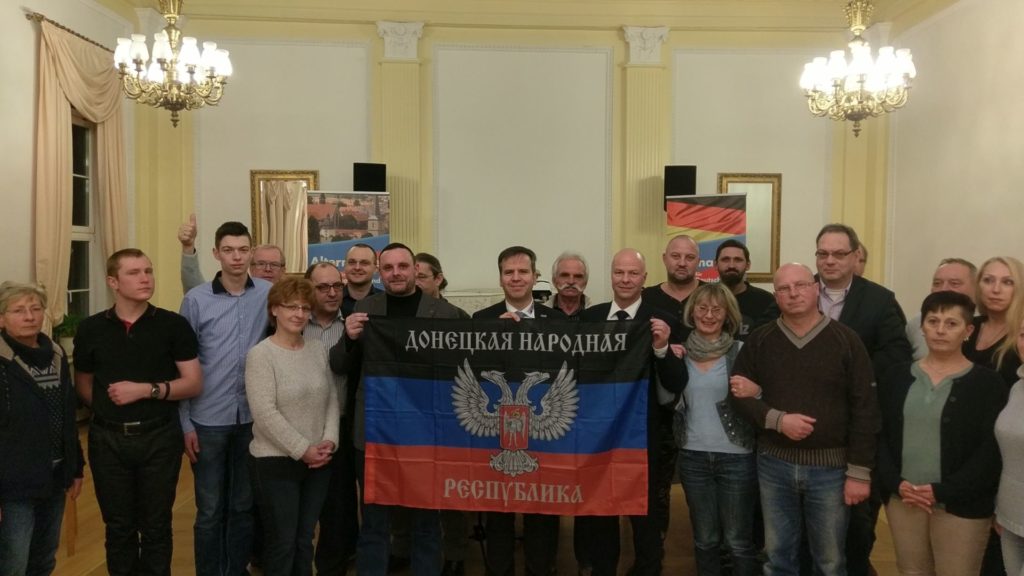
Currently, Manuel Ochsenreiter is a member of the Center for Geostrategic Studies (CGS), a Russian/Serbian think tank with subsidiaries in Moscow and Belgrade. Among its “strategic media partners” the CGS lists a whole range of outlets from the neo-Eurasianist media multiverse.[126] Other “strategic media partners” of the CGS include the French Voltaire Network, and the Canadian Global Research platform, both known for having published far-right conspiratorial content in the past.[127] CGS’s director, the Serbian Dragana Trifkovic, also appears on the “strategic partner” roster of the Russian Center for Strategic Assessment and Forecasts (CSEF).[128]
Yet Ochsenreiter’s contacts also reach into the AfD. Next to having been official scientific adviser to AfD MP Markus Frohnmaier, with whom he founded the neo-Eurasianist GCES think tank in 2016, Ochsenreiter has appeared as a speaker at several AfD events. For example, at an AfD Russia Congress in Magdeburg in August 2017, he lectured on the “War in Donbas and Germany’s Interests.” Besides AfD politicians Waldemar Birkle and André Poggenburg, other speakers included Algis Klimaitis of the AMES and cross-front agitator Jürgen Elsässer.[129] Ochsenreiter attended another AfD event in 2017, an anti-sanctions conference in Freiberg with no less a figure than Alexander Gauland representing the AfD; other attendees included Alexander Yushchenko, a high-ranking member of the Russian Communist Party, as well as members of the Austrian FPÖ, the Belgian Vlaams Belang, the Czech Freedom and Direct Democracy party, and the Italian Lega Nord.[130] In January 2019, Ochsenreiter made headlines with his alleged involvement in a false-flag arson attack on a Hungarian cultural center in Ukraine in February 2018 perpetrated by three Polish men, which was to be blamed on Ukrainian nationalists.[131] One of the accused is said to be a member of the Polish fascist group Falanga, which is close to the pro-Russian Donbas insurgents and has already fought among the separatists in Ukraine.[132] Ochsenreiter is alleged to have “commissioned, planned and funded” the attack, a claim that he utterly denies.[133] When the German Public Prosecutor’s Office brought charges of serious arson against him in relation to the attack, he gave up his post as adviser to Frohnmaier; he may face criminal charges.
Ochsenreiter has also appeared on various occasions with one of the most important pro-Russian far-right agitators in Europe, the Belgian Kris Roman, who manages the New-Solidarist Alternative Geopolitical Think Tank Euro-Rus,[134] which has contacts in Iran, Syria, Belarus, Russia, Serbia and Donbas.[135] According to an investigative report in the Belgian Apache, Roman had “built an impressive neo-Nazi network” as early as 2009, with contacts to Russian far-right proponents such as Alexander (Potkin) Belov, leader of the now-defunct Movement against Illegal Immigration (DPNI), and a number of other DPNI members, as well as American neo-Nazi figures such as David Duke and the British Nick Griffin.[136] His frequent interactions with both far-right and ostensibly left[137] proponents point to a reorientation over the years from staunch neo-Nazi to political cross-front agitator, something to which he himself alludes in a Facebook video.[138] That this change correlated with an increasingly pro-Russian position is evidenced by Roman being baptised into the Russian Orthodox faith in 2015, around the same time that he was first pictured with Alexander Dugin’s daughter, Daria Dugina.[139] From 2016, Roman was prominently featured on Russian domestic TV, such as Rossiya One, Zvezda, and REN TV, as well as on Malofeev’s Tsargrad channel.[140] In 2017 he appeared with Alexander Dugin as a speaker at the notorious far-right neo-Eurasianist Chișinău conference organized by the Moldovan journalist Iurie Roșca.[141] That same year, he also attended a press conference with Kochetkov’s People’s Diplomacy, where he appeared in photos with Johann Gudenus, spokesman of the far-right Austrian FPÖ, and Pierre Malinowski,[142] former parliamentary assistant to Jean-Marie Le Pen and Aymeric Chauprade.[143]
Roman’s and Ochsenreiter’s networks overlap to a considerable degree.[144] Their acquaintance dates back to at least 2015, when they both appeared at a Euro-Rus conference in Moscow along with Dragana Trifkovic of the CGS.[145] In 2017, they both took part in a discussion round by the People’s Council of the Donetsk People’s Republic foreign affairs committee.[146] The latest photos showing them together were taken during a conference organized by the far-right Belgian publisher de blauwe tijger in Antwerp in May 2018.[147]
Ochsenreiter’s extensive connections to the neo-Eurasianist far right are visible from his Facebook contacts. These include Alexander Dugin’s daughter, Daria Dugina; cross-front politician of Die Linke Andreas Maurer; AfD politicians Robby Schlund, Dietmar Friedhoff, André Poggenburg, Thomas Rudy, Waldemar Herdt and Hans-Thomas Tillschneider; and several proponents of the Russian far right, such as Rodina party poster-girl Maria Katasanova, Andrew Kovalenko and Nico Uriwski. A Facebook picture showing Ochsenreiter with Katasanova and Kovalenko is captioned “Russian-German team–our people are everywhere.”[148]
Markus Frohnmaier
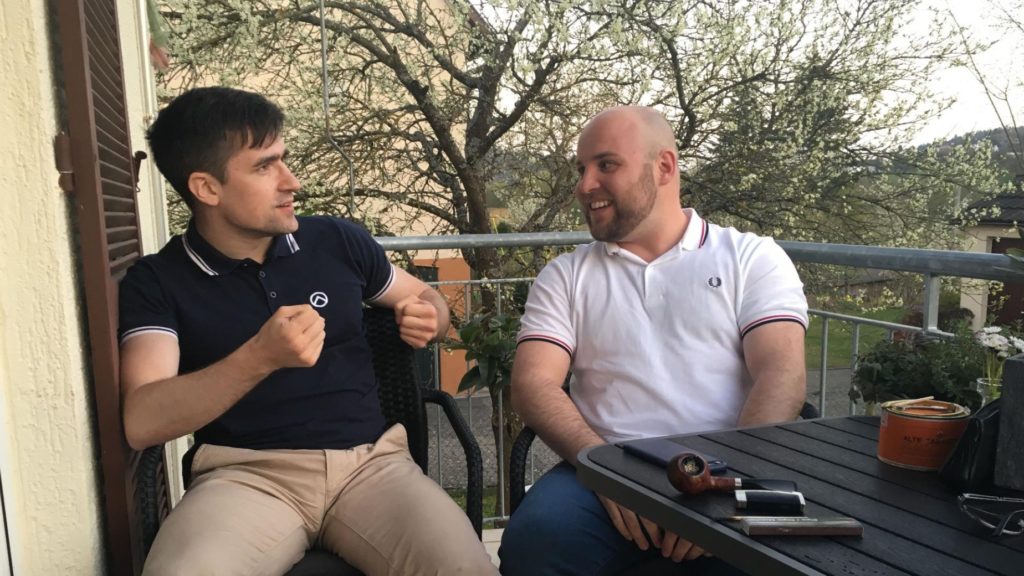
[Credit: https://www.tagesspiegel.de/themen/reportage/frohnmaier-trifft-sellnerwie- die-afd-jugend-mit-den-identitaeren-kungelt/19702108.html]
Markus Frohnmaier, federal spokesman of the AfD’s youth wing, the Young Alternative (Junge Alternative, YA), as well as spokesman for AfD co-leader Alice Weidel, has established excellent Russian contacts in recent years.[149] Often cited in the Russian press, particularly Sputnik and RT, where he has spoken approvingly of the Crimean annexation[150] and critically of NATO’s mandate in the Near East,[151] Frohnmaier has caused public outcries in Germany with his populist and demagogic statements.[152] He has been depicted as “pushing the AfD systematically to the right with a method that could be described as ‘provoke, expand room for maneuver, normalize.’”[153]
Frohnmaier, internally called “Frontmaier,”[154] has overseen the formation of the YA since its emergence in 2014, when it grew out of an AfD student group Frohnmaier had founded, and served as its federal chairman for several years.[155] Currently, the YA is being targeted by the Federal Office for the Protection of the Constitution (Bundesamt für Verfassungsschutz, BfV) due to its reported proximity to several far-right organizations that are already under active surveillance. In order to forestall being probed by the federal office, the AfD decided in September 2018 to dissolve two of its YA subsections, in Bremen and Lower Saxony, respectively. Lower Saxony’s interior minister, Boris Pistorius, echoed the BfV’s concerns, stating that the YA represented a world view “in which minorities such as refugees or homosexuals are systematically devalued and defamed.” There was a “not insignificant ideological and personal overlap” between the AfD’s YA and the Identitarian movement, and the structural proximity of the Lower Saxony YA section to organized right-wing extremism was unmistakable.[156] That Frohnmaier also fits that profile is apparent from, for example, a public meeting between him and Austrian Identitarian leader Martin Sellner[157] or his appointment of far-right neo-Eurasianist editor Manuel Ochsenreiter as his political advisor.[158] Frohnmaier can also be seen in a picture with the Belgian pro-Russian agitator Kris Roman and the couple Valentina Bobrova[159] and Mikhail Ochkin[160] in Moscow.[161] Although their role deserves further research, they appear on photos with a hitherto unidentified but potentially Serbian neo-Chetnik monarchist, ROC-affine organization around the Russian Maksim Markov.[162]
Frohnmaier’s networking activity for the YA began in April 2016, when it was reported that he had met with Duma deputy and top functionary of the United Russia party Robert Shlegel to “explore what form of cooperation could be possible” with United Russia’s youth organization, the Young Guard (Molodaia Gvardiia). In an interview with Der Spiegel, Frohnmaier explained, “Across the European continent, euro-critical and sovereign movements are getting stronger.” The efforts of the YA, he indicated, were directed at “combining these activities in a new youth network” from which “Russia should not be missing.” In foreign policy, he added, Germany must finally “represent its vital national interests” and not be “the kindergarten teacher of the world.”[163] These talks continued in December 2016, when Frohnmaier met with the international secretary of the Young Guard, Daria Sharova, in Moscow.[164]
In July 2016, the YA invited representatives of European right-wing parties, such as the Front National and the FPÖ, to its federal assembly in Bingen. There, Frohnmaier welcomed the president of the United Youth Front (UYF), the building magnate Nikolai Shliamin, and his wife, Ksenia Shliamina, as Russian representatives:[165] “Shliamin…explains that the AfD youth and the United Youth Front have similar views in regards to the traditional family.… As an alternative to the European Union, he calls for a Eurasian coalition, a ‘Europe from Lisbon to Vladivostok.’ The hall applauds.”[166] In the course of the visit, Shliamina wrote on Facebook that they had “agreed” with Frohnmaier “on the development of the Ia Papa (I’m a dad) project,” an initiative supporting young fathers, “throughout Europe.”[167] According to an RT article, the AfD politicians showed interest in the project and “agreed … to translate the site into English to make it more accessible for a European audience.”[168]
In December 2016, Frohnmaier met with Konstantin Petrichenko, director of international relations of the United Russia party, as well as leaders from the UYF.[169] While in Moscow, Frohnmaier also had a meeting with Anton Morozov, a Russian MP and member of its international affairs committee, organized by the UYF. According to Ksenia Shliamina, who posted photos of the meeting on Facebook, they discussed “prospects for cooperation between Russia and Germany in the context of sanctions.”[170] The “development of contacts of youth organizations” had also been discussed by Frauke Petry during her aforementioned meeting with Viacheslav Volodin, Leonid Slutskii and Vladimir Zhirinovsky in February 2017.[171]
But Frohnmaier’s Russian connections go well beyond networking on behalf of the YA. Putin’s confidant, the oligarch Vladimir Yakunin, received him in Paris, and he even appeared among pro-Russian separatists in Eastern Ukraine as part of a panel discussion.[172] In March 2018, Frohnmaier travelled to Moscow as an observer of the Russian presidential election, and one month later he attended YIEF 2018, to which he had already been invited in 2016.[173] During the 2016 iteration of the YIEF conference, Frohnmaier had met his future wife, Daria, a Russian journalist writing for the governmental newspaper Izvestiia.[174]
Waldemar Herdt and Heinrich Groth
When it comes to the Russian-German community, two of its most important spokesmen are the AfD MP Waldemar Herdt, a Russian-German from Kazakhstan, and Heinrich Groth, a Kazakh repatriate of Russian-German origin who is currently officially employed at Herdt’s office.
Heinrich Groth can be considered one of the central influencers in the Russian-German community. From a Russian-German family in Kazakhstan, Groth became a leading figure in the mass movement Wiedergeburt (Rebirth), officially founded in 1989 in Moscow under then-CPSU General Secretary Mikhail Gorbachev. The movement, of which Groth remained chairman until 1993, advocated for the rights of the ethnic German minorities living in Russia.[175] It later came out that, due to Groth’s growing importance in the Russian-German community, the German government had been supporting him financially from at least 1995,[176] paying him a monthly salary (500 DM) and covering the costs of maintaining his office until 2001.[177] Throughout that time, Groth had repeatedly used his influence to put pressure on the German government, arguing, “We are native Germans, and we want to be treated accordingly.”
With his excessive demands, Groth divided the Wiedergeburt movement. For example, he declared that, if the German government would not take greater interest in the community, he would call on the repatriates already living in Germany to vote for the right-wing Republicans or to emigrate to Argentina, with the $20,000 fee charged by Argentina for each arriving family to be paid by Germany.[178] Yet this rhetoric did not lead the German government to cut off their support. In the mid-1990s, Groth moved to Crimea, where he became a leading figure in the Crimean offshoot of Wiedergeburt, the Rebirth Republican Society of the Germans of the Crimea, a support group for Crimean Germans that emerged during the perestroika period, when it became possible for some of the 53,000 Germans evicted from Crimea by Stalin in 1941 to resettle there.[179]
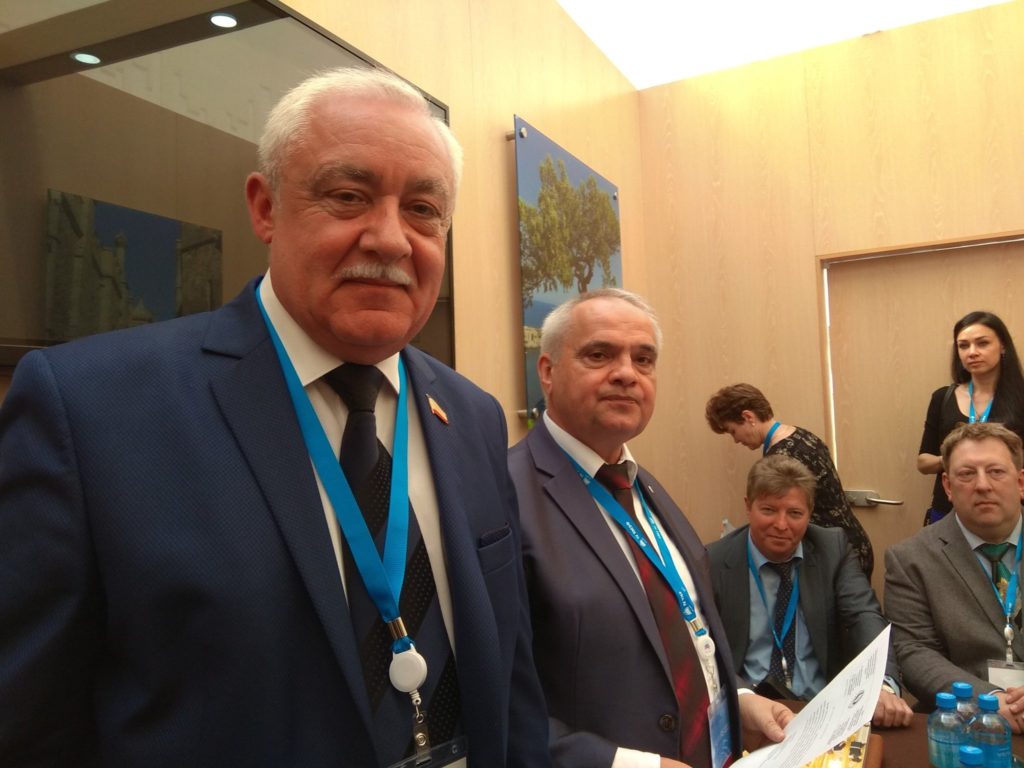
Upon repatriation to Germany in 2002, Groth founded the International Convent of Russian-Germans (Internationaler Konvent der Russlanddeutschen, ICRG),[180] which was behind the now defunct right-wing website Genosse,[181] and tried to gain political influence in the NPD. According to ARD research, Groth is very well integrated into German far-right networks. In January 2016, Groth registered several demonstrations in front of the chancellery in Berlin that brought together several hundred Russian-Germans and right-wing extremists. These demonstrations were organized in connection with what became known as the infamous “Lisa case.”[182] The BfV thinks of the Lisa case as a “disinformation campaign by the Russian authorities.” German counterintelligence had noticed that Russian intelligence services increasingly sought contact with Russian-Germans. The German magazine Focus, writing about Berlin security circles, stated that Groth has been targeted by the counterintelligence department of the BfV for some time.[183] When asked about his connection to Groth, Herdt told Focus, “As the grandfather of the Russian-German movement, he is a very important person.” According to Herdt, he got to know Groth in the context of the “For the German Homeland!” Coordinating Center for Russian Germans (Koordinierungszentrum der Rußlanddeutschen ‘Für die deutsche Heimat!’), founded in January 2017 with the aim of winning Russian-German voters over to the AfD, of which Groth had become the head.[184] Groth also plays a role in the current German debate around several secret consultations between AfD functionaries and BfV head Hans-Georg Maaßen. According to AfD party chairman Alexander Gauland, the latter had contacted Maaßen when the suspicion arose that Heinrich Groth could be a “Russian influence agent” in the AfD parliamentary group. Two weeks later, Gauland received an all-clear signal from Maaßen; Groth subsequently signed an affidavit asserting he had never worked for the Russian secret services.[185]
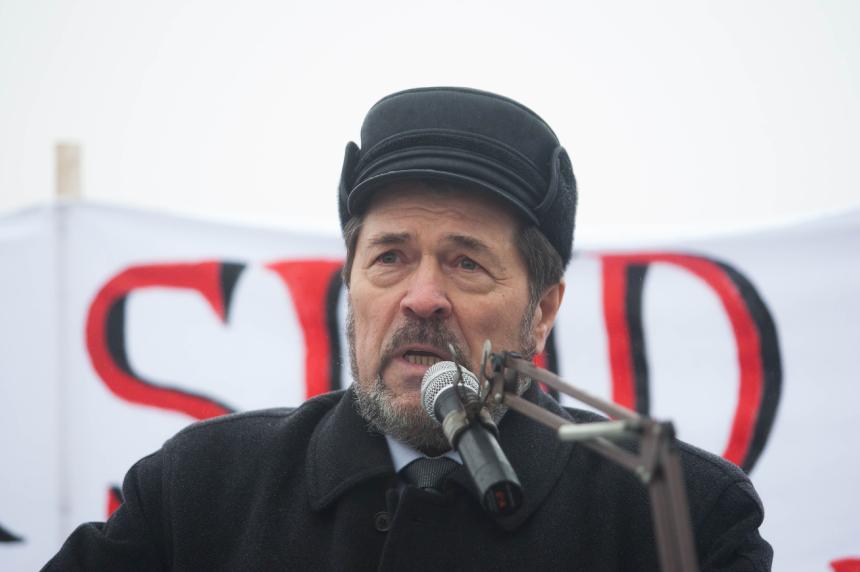
In October 2017, perhaps due to the mounting questions about Groth’s role within the AfD, in October 2017, the ICRG gave Herdt a mandate to represent the interests of the Russian-German community in the AfD, signed by Groth.[186] On April 29, 2018, during the celebrations of the 30thanniversary of the Crimean Rebirth movement, the establishment of the People’s Council of Russian-Germans (Volksrat der Russlanddeutschen) was announced, with AfD MP Waldemar Herdt elected its head.[187] According to Herdt, the main tasks of the People’s Council are “the coordination, promotion and pooling of all political and social activities of the Russian-German ethnic group.”[188] A photo posted by Herdt on Facebook shows that many high-ranking officials and diplomats from Russia and several CIS states, as well as AfD MPs, were present at the celebration during which the People’s Council’s resolution was adopted.[189]
Herdt also used Groth’s far-right platform, Genosse, to lobby for the AfD, on which he attacked the powers-that-be, particularly emphasizing the betrayal of the CDU/CSU: “Today we see that the destruction of the German people and their state became part of the devilish plan of the left-liberal and globalist forces of the political elites of the West engaged in the destruction of the Christian world and European civilization as a whole.”[190]
Tobias Pfennig
Tobias Pfennig, who calls himself Tobias Nase on social media, is a resident of Munich and currently head of the pseudo-antifascist Anti-Imperialist Action (Anti-Imperialistische Aktion, AIA). Although the organization pretends to be on the far left, Pfennig openly venerates dictatorial figures such as Stalin, Assad, Gaddafi, and Saddam Hussein. Pictures of him in a delegation with Bashar al-Assad[191] or at Ramzan Kadyrov’s recent mega-event in honor of the 200thanniversary of Grozny show how close he sometimes comes to his dictatorial role models. Pfennig’s social media activity indicates that he is constantly travelling to Russia and Donbas to hook up with pro-Russian far-left and far-right radical and paramilitary groups, as well as to attend conferences and demonstrations. He is in frequent contact with Yurii Kofner, and is also mentioned as a member of Kofner’s AMES, where he is introduced as “Head of the Antiimperialistische Aktion, the biggest left-wing anti-imperialist movement in Germany.”[192]
An anonymous interview from 2015 gives a good sense of the AIA’s ideological self-placement within Germany’s political left, which it decries as “reformist, capitalist, pro-imperialist, revisionist or all of the above.”[193] An article in The Interpreter had the following to say about the AIA:
The ideology of the “anti-imps,” as they are called in Germany, can be briefly summarized as follows: radical anti-Americanism, a partiality to conspiracy theories, covert (and sometimes overt) anti-semitism, and thoroughly uncritical support for all regimes opposed to the United States and Israel. The official flag of Antiimperialistische Aktion resembles the antifascist flag, but instead of a red-and-black banner in a circle, it depicts the flag of the USSR and the “anti-imperialist” regime which they currently love most. There are variations depicting the flags of Libya, Syria, and Palestine. There has recently appeared an “anti-imperialist” flag on which the Soviet flag is accompanied by the two-headed Novorossiya eagle, and the pantheon of antifascist and anti-imperialist heroes was supplemented not only by Strelkov and Mozgovoi, but also by Ramzan Kadyrov.[194]
There is no information about the size of the organization, but with 25,000 followers on Facebook it seems very well networked.[195] It is unclear when exactly the AIA was established. The first references to its activities appeared in 2012, when the group organized its first rallies. A notable example was in 2012, in the framework of the traditional May Day demonstrations in Munich, where Pfennig made a speech in solidarity with Muammar Gaddafi.[196] As early as 2014, the AIA had contacts with separatists in Donetsk, among them Margarita Seidler, a German volunteer fighting with the militias of the warlord Igor Strelkov.[197] The AIA published a video on its YouTube channel in which Seidler talked about the crash of MH17.[198] According to the expert Matrochka Blog, they were put in contact by one Evelin Piètza,[199] a pro-Russian figure who has appeared on several important cross-front platforms and who, like Pfennig, seems to be drawn to initiatives that unite anti-American and Russophile individuals fromthe German far right and far left. These include the so-called “Vigils for Peace” (Mahnwachen),[200] a weekly anti-NATO “peace” demonstration that brings together decisively pro-Russian proponents, and the Endgame movement (Engaged Democrats against the Americanization of Europe; Engagierte Demokraten gegen die Amerikanisierung Europas, formerly PEGADA), a fiercely anti-American initiative.[201] Piètza has also been featured on RT commenting on the MH17 crash.[202]
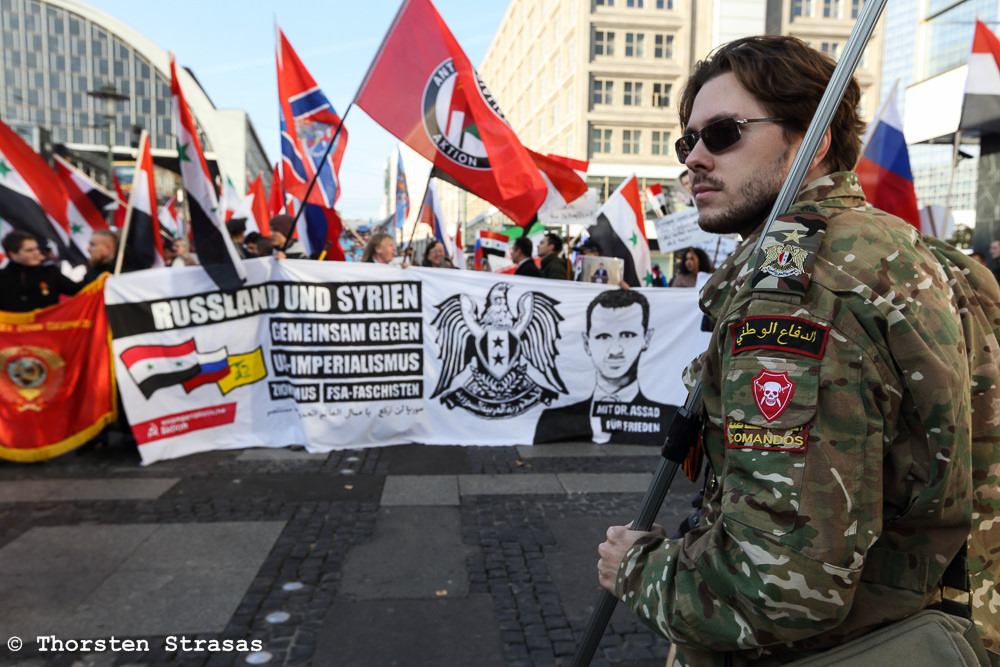
Pfennig’s first traceable visits to Donbas took place around April 2015, when he was featured in an interview on RT expounding about his experiences giving “humanitarian aid” to people in eastern Ukraine.[203] One month later, he participated in the Third Anti-Fascist Congress in Donetsk.[204] Since 2016, the latter has named Kofner’s AMES as a “participating organization.”[205] These were followed by a multitude of other visits in the region. Just recently, Pfennig was in Luhansk, where he appeared together with RT journalist Donald Courter[206] and members of the Central Committee of the U.S. organization Students and Youth for a New America,[207] posing in front of a Stalin painting with a flag sporting Assad’s portrait. The caption of the picture posted on Facebook reads, “With Stalin + Assad in Luhansk.”[208] Courter is also the manager of the cross-front Molotov Club,[209] which recently hosted a conference featuring Pfennig along Kris Roman of the far-right neo-Eurasianist Euro-Rus group.[210]
Whenever Pfennig is not in Donbas or Russia, he can be seen at relevant demonstrations or conferences in Germany and elsewhere in Europe. In October 2015, he appeared at the International Anti-Fascist Forum in Greece with Sergey Markhel from the Rodina party, a driving force behind the international platform Global Rights of Peaceful People.[211] In 2015 and 2016, the AIA attended several demonstrations against Western intervention in Syria and in support of Bashar al-Assad.[212] The organization also participates regularly in counter-demonstrations in the framework of the Munich Security Conference, another platform where elements of the German far right and far left meet under an anti-American, and particularly anti-NATO, banner. Die Linke politician Andreas Maurer,[213] as well as the Identitarian Alexander Markovics from the Austrian Suworow Institute,[214] have been spotted at these rallies.
The AIA has also established contacts with members of the Identitarian movement. In 2016, the AIA prepared a presentation on “Putinism” with the Identitarian Movement Bavaria.[215] Pfennig has further appeared with Austrian Identitarian and Suworow Institute spokesman Alexander Markovics on several occasions. The earliest of these was the 2017 conference “Global Politics, Their Agenda and How to Protect International Peace” in the framework of the 19th World Festival of Youth and Students in Sochi.[216] A photo of the two that Markovics posted on Facebook is captioned, “With Tobias Nase of the Anti-Imperialist Action at the 19th WFYS. Cross-front for a multipolar world and against the American Empire! How many people will get upset about this picture? PS: No, I did not change sides.” The conference participants also included Daria Dugina and Andrew Kovalenko, both important figures in the Russian neo-Eurasianist orbit.[217] On April 21, 2018, Pfennig, Markovics, Patrick Poppel, and Alfred Almeder appeared together in the context of a discussion panel hosted by the Suworow Institute, entitled “Cross-Front, Anti-Imperialism and Refugee Crisis.” The caption of the image posted on Facebook reads: “Left and Right discussed the connection between Western imperialism and mass immigration.”[218]
While the term “cross-front,” used by the members of this movement themselves, goes some way toward helping us grasp this ostensible collaboration between proponents of the far right and far left, it has substantial shortcomings. On the one hand, the main actors in the Russophile network described above—such as Alexander Maurer and Tobias Nase—cannot really be described as “left” in the first place. Furthermore, the majority of this younger generation of Russophile Germans and Austrians—such as Markus Frohnmaier, Manuel Ochsenreiter, Patrick Poppel, Alexander Markovics, Yurii Kofner, Philipp Liehs and Maximilian Dvorak-Stocker—are from the extreme right. Thus, this network appears to be more of a “fake cross-front.” The idea behind this could be to pretend that there is consensus between the far right and far left with regard to countering the dominance of the United States, NATO and Israel.
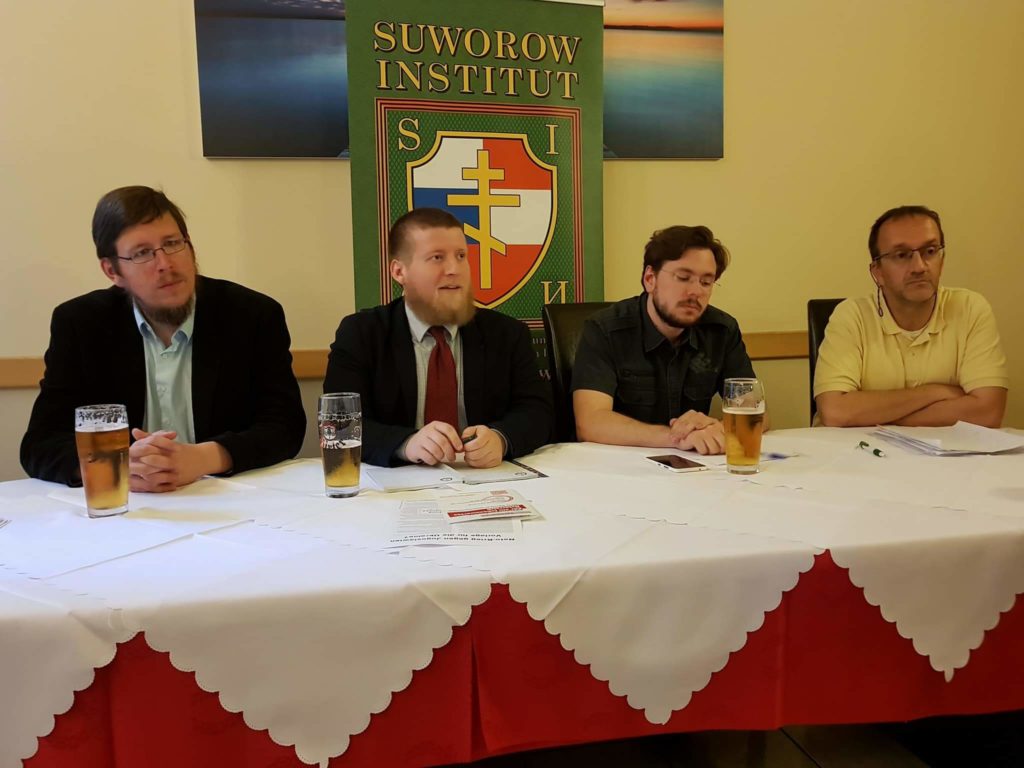
The Subculture Ecosystem: Night Wolves, Systema and Mixed Martial Arts
With the fall of the Iron Curtain, Russian and German far-right subcultures began to cross-fertilize one another. This concerns particularly the neo-Nazi milieu, with groups such as White Rex, as well as the hooligan and biker scene, most notably the Russian Night Wolves (NW), which has offshoots in both countries. A unifying element of these scenes is their affinity for Mixed Martial Arts (MMA), particularly the Russian martial arts techniques of Systema and Sambo, which enjoy ever-increasing popularity in Germany.
Biker Clubs and Systema Martial Arts
One of the best-known of these groups is the motorcycle club Night Wolves (NWs), the first official biker club of the USSR, for a time patronized by Vladimir Putin himself. The club, ruled with an iron hand by Alexander Zaldostanov since the early 1990s, can be classified as a patriotic, nationalist, anti-Western, Russian Orthodox, patriarchal and homophobic paramilitary organization. As of 2014 the club, to which only men are admitted, had around 5,000 members in 15 countries.[219]
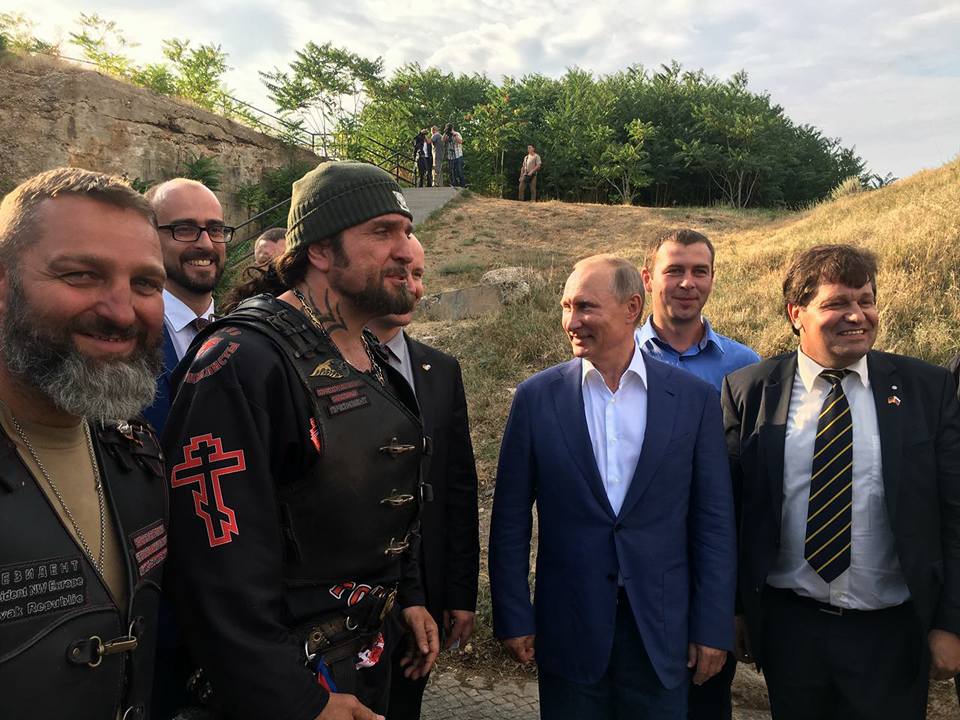
The NWs are fairly well researched. Lauder classified them as a tool of Russian “Non-Linear Warfare” (NLW) exemplifying “a larger trend by the Russian government to outsource activities to non-state actors that are traditionally conducted by state intelligence and defence entities.”[220] By this he meant that the NWs represented “a carefully curated facade meant to provide a semblance of rebelliousness, all while the group serves as a tool of the state.”
A few years after the biker gang began forming in 1983 among rock music fans and motorcycle enthusiasts, the club became dominated by former surgeon Alexander Zaldostanov. Upon marrying a German citizen in 1985, Zaldostanov moved to Germany for a few years.[221] While working in the former West Berlin as a bouncer at the Schöneberg punk rock club Sexton, he became acquainted with the local Hells Angels scene.[222] Upon his return to the Soviet Union in 1991, Zaldostanov created an impressive corporate empire built on his experiences in Germany. He opened his own Sexton club and started a very lucrative business selling biker gear. His position gained him de facto control of the motorcycle scene in Russia at the time, and his open appraisal of Boris Yeltsin guaranteed the NWs political protection. In August 1991, the NWs appeared for the first time as “mercenaries” of the Kremlin, defending it from an attempted communist coup.[223] During the 1990s the NWs were still oriented toward the Danish Hells Angels, with which Zaldostanov maintained close relations, and had a rather pro-Western outlook. It was not until the beginning of the 2000s that the NWs began to transform into a state-affiliated patriotic and nationalistic organization. This turn is often claimed to be due to Zaldostanov’s adoption of the Russian Orthodox faith after an accident: He reportedly met an Orthodox priest who told him that he must save Russia.[224]
With this reorientation, Putin’s grey cardinal, Vladislav Surkov, began to take an interest in the NWs. (Lauder co-credits Surkov with the conceptualization of NLW, together with General Valerii Gerasimov, the Chief of the General Staff of the Russian Armed Forces.)[225] Surkov organized and financed NW concerts, arranged for television appearances and brought them to the attention of Vladimir Putin, who has since appeared with Zaldostanov in public many times.[226] The NWs regularly host spectacular shows, attracting tens of thousands of people, featuring a peculiar mix of hyper-patriotic and religious kitsch, martial aesthetics and personality cult, including Stalin speeches, and mock battles. With the appearance of the feminist group Pussy Riot in 2012, the NWs reappeared as defenders of the powers-that-be. Following the now-infamous punk prayer, NWs demonstratively protected Russian Orthodox churches from any future desecrations. By 2014, NW members had become involved in military operations in Crimea, “collecting intelligence, distributing propaganda, organizing protest and self-defence units, and coordinating with Russian Special Operations Forces,” as well as conducting “joint operations with the Spetsnaz units,” according to Lauder.[227] In Europe, they have attempted to become an active paramilitary organization in several Central European countries.[228]
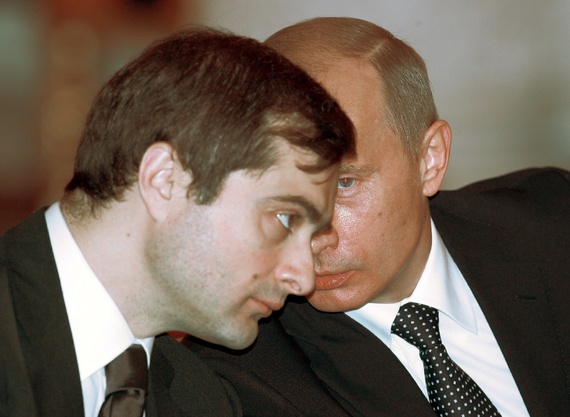
Surkov was First Deputy Chief of the Russian Presidential Administration from 1999 to 2011, during which time he was widely seen as the main ideologist of the Kremlin. His
moniker could be “political technologist of all of Russia.” He allowed: “My portfolio at the Kremlin and in government has included ideology, media, political parties, religion, modernization, innovation, foreign relations, and—here he pauses and smiles—modern art.” [Source: https://www.theatlantic.com/international/archive/2014/11/hidden-author-putinism-russia-vladislav-surkov/382489/]
There are various contact points between the Russian NWs and their German sympathizers. They most visibly converge in the so-called Victory Ride to Berlin. This ride, which has been taking place since 2015, celebrates the Soviet Union’s victory over Nazi Germany, following the 6,000-kilometer route taken by the Red Army across Eastern and Central Europe during the Second World War. The closing event takes place at the Treptow war memorial in Berlin, bringing together German and Russian NW groups as well as supporters from throughout Germany. Among these supporters are members of the Druzhba initiative, an explicitly anti-American and Russophile German network that organizes “peace trips” to Russia. Its head, Rainer Rothfuss, a frequent traveller to Moscow who can be seen in photos visiting the Russian Foreign ministry,[229] among other institutions, seems to have a direct line to Zaldostanov. In August 2016, the latter arranged for Rothfuss to deliver his “Druzhba message of peace” in front of 13,000 people during a techno concert in Sevastopol.[230] Rothfuss in turn organized a trip to a NW bike show there. The tour program included a stopover in Simferopol to participate in the commemoration day of the expulsion of German people from the Crimea, at the invitation of Yurii Gempel of the GNCAC. Die Linke politician Andreas Maurer and Christoph Hörstel, head of the minority party Neue Mitte and a frequently quoted expert on RT, also appear in photos and videos of a get-together with Zaldostanov and Vladimir Putin in Crimea.[231]
There are several German NW groups, of which the Russian-German Wolves (Russlanddeutsche Wölfe, RGW), which have various local subsections, are the most prominent.[232] The leader of the RGWs is the Russian-German Dmitri Zaiser, a former Bundeswehr soldier who is now a reserve officer in the Russian army.[233] Zaiser is also head of a martial arts school called Systema Wolf, with training centers in Germany and Switzerland, which teaches a particular brand of the martial arts form Systema,[234] increasingly popular among German far-right groups.[235] In 2014, German media quoted members of security circles as saying that Systema was controlled by the Russian military intelligence service (the GRU) and specifically targeted members of the police, military and judiciary in order to recruit them into the service of the GRU.[236]
Systema Wolf (SW), the Systema school strongly interconnected with the RGWs, is a subsidiary of Zaiser’s company Wolf Security,[237] which in turn appears to be affiliated with the Russian Wolf Security Holding,[238] which operates around 20 Systema schools in Russia, Europe and Asia.[239] According to its website, SW also conducts training for various international special forces units, such as the Russian paratroopers of the Ministry of the Interior as well as Serbian, Hungarian and Taiwanese anti-terror units.[240] SW further cooperates with the private training center Vityaz,[241] which runs a paramilitary training ground about 140 km from Moscow.[242] In addition, SW has contact with NWs in the Donbas region. For example, in 2014, Swiss and German SW members travelled to a training camp in Crimea after its annexation, where they were hosted by local NWs.[243] That there is a convergence between SW and the RGWs is evident from their iconography. The SW uses the same logo as the RGWs, a wolf head on a medallion with two crossed swords in the background.[244] The RGWs’ neo-pagan affiliations can be deduced from their website, which references Odin and Celtic druids in its welcome message.[245]

SW also has connections to the Russian-German minority party The Unity (Die Einheit), founded by Dimitri Rempel in 2013. A Deutschlandfunk article from 2016 states that the local branch of The Unity and of the RGWs, as well as the SW Systema Academy, all shared the same address in the German town of Ludwigsburg.[246] That same year, Zaiser, together with Alexander Steinle from The Unity and Roland Schneider, former leader of the German-Russian Brotherhood (Deutsch-Russische Bruderschaft), were convicted of identity fraud. They had used both the name and the logo of the Fellowship of Russian-Germans (Landsmannschaft der Russlanddeutschen), an influential Russian-German interest group, by creating a website and a Facebook group in its name, which they used to advertise ‘fascist and paramilitary organizations,” according to the Fellowship’s lawyer.[247]
The extent to which there is a centralized organization behind Systema cannot be established, but there are some indications pointing in that direction, for example, in the Czech Republic. A journalist from Focus drew the following picture from substantial documentation:
The former security officer can prove that the Czech domestic intelligence service BIS closely monitors Russian combat schools as well as Cossack clubs, which rave about Russia’s old glory. Intelligence officer Igor M., who has been placed at the Russian embassy in Prague disguised as a diplomat, controls more than 30 of these supposed sports and cultural associations.[248]
The Czech case thus shows parallels to Austria, where there appear to be intricate connections between Systema, the NWs, Cossack organizations, and Russian Orthodox youth groups, best represented by the Suworow Institute.[249]
The Chechen Connection to MMA
Not only Systema, but Mixed Martial Arts in general seem to be a platform for Russian intelligence activity. A 2016 ZDF documentary by the esteemed German journalist Egmont Koch purports that Chechen FSB agents were smuggled into Germany disguised as political refugees.[250] Koch’s informant, ostensibly a high-ranking former FSB agent, stated that he had been working in an FSB department that was issuing false documents, including false criminal convictions and police investigations, to Chechen sportsmen, mostly from the martial arts scene, so that they could prove they were politically persecuted and apply for asylum in the West.[251] One of these martial arts sportsman, Timur Dugazaev, chairman of the Chechen Cultural Association in Kiel, was identified during Koch’s inquiries. Although Dugazaev applied for political asylum in 2002, he and his friends appear publicly as patriots and supporters of the head of the Chechen Republic, Ramzan Kadyrov, of whom Dugazaev is a close confidant. In an interview with Dugazaev, the latter admits that he and his friends had lied on their visa applications to get through the visa process. He further admitted that he was in direct contact with Kadyrov and reported back to him on any suspicious developments.[252]
Another interviewee was the Estonia-born Alexander Semyonov, who has been living in Germany since 1990. He organized a pro-Russian and pro-Kadyrov demonstration in Hamburg on January 30, 2016. Russian media portrayed the event as evidence of “growing resistance in Germany to the government’s anti-Russian politics” instead of as a pro-Kadyrov rally. Semyonov also confirmed that pro-Kadyrov sportsmen had come to Germany as refugees.[253]
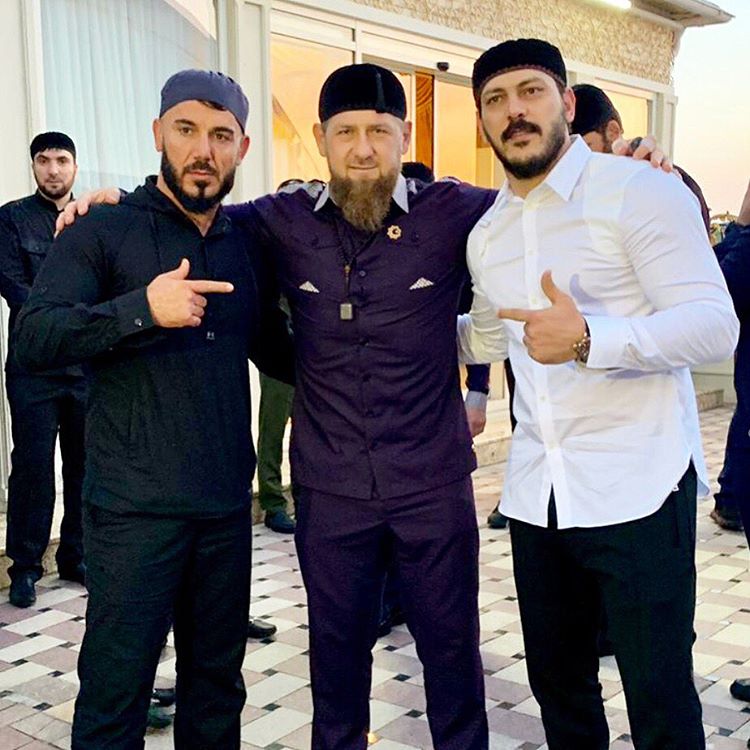
Kadyrov is the de facto head of the Night Wolves in Chechnya. He joined the organization in August 2014,[254] and in May 2015, during the inauguration of the Chechen NW branch in Grozny, was declared the chapter’s honorary leader by Alexander Zaldostanov.[255] Although largely shunned by European politicians due to reports of forced disappearances and torture that constitute crimes against humanity, he has nevertheless managed to establish several political connections in Western Europe. Some of these individuals came together in October 2018 to celebrate the 200thanniversary of Grozny, a pompous and costly event attended by Vladimir Putin and an illustrious range of international guests, among them Die Linke politician Andreas Maurer, AIA head Tobias Pfennig,[256] and Timur Dugazaev. One photo shows Maurer and Dugazaev at a martial arts venue in Grozny;[257] another features the two with Ramzan Kadyrov.[258] In a Facebook video, Maurer mentioned that he has twice had the opportunity to speak with Kadyrov personally and will extend his People’s Diplomacy project to Chechnya in the future.[259] He also described how the militaristic state-sponsored local youth organization Akhmat Sila has become omnipresent in Grozny, noting how impressed he was with their contribution to orderly behavior among the local youth.
In the course of the event, Maurer can also be seen with Eliseo Bertolasi,[260] a former editor of Geopolitica Rivista, the publication of the Russian-Italian neo-Eurasianist Institute of Advanced Studies and Sciences (Instituto di Alti Studi in Geopolitica e Scienze Ausiliare) think tank.[261] In the accompanying Facebook post, Maurer called Bertolasi a “People’s diplomat.”[262] Bertolasi contributes to Malofeev’s think tank, Katehon, and is featured on the AMES board. Since 2013 he has been the Italian Sputnik correspondent for Donbas and has written for the Russian online journal International Affairs[263] (Mezhdunarodnaia zhizn’).[264] Bertolasi appeared at the “Russia, Ukraine and the World” conference in August 2016 with Tobias Pfennig, Kris Roman and Aleksei Weitz of the Russian Night Wolves, which took place in the same facilities as meetings of the Molotov club.[265]
Skinheads MMA: The White Rex Case
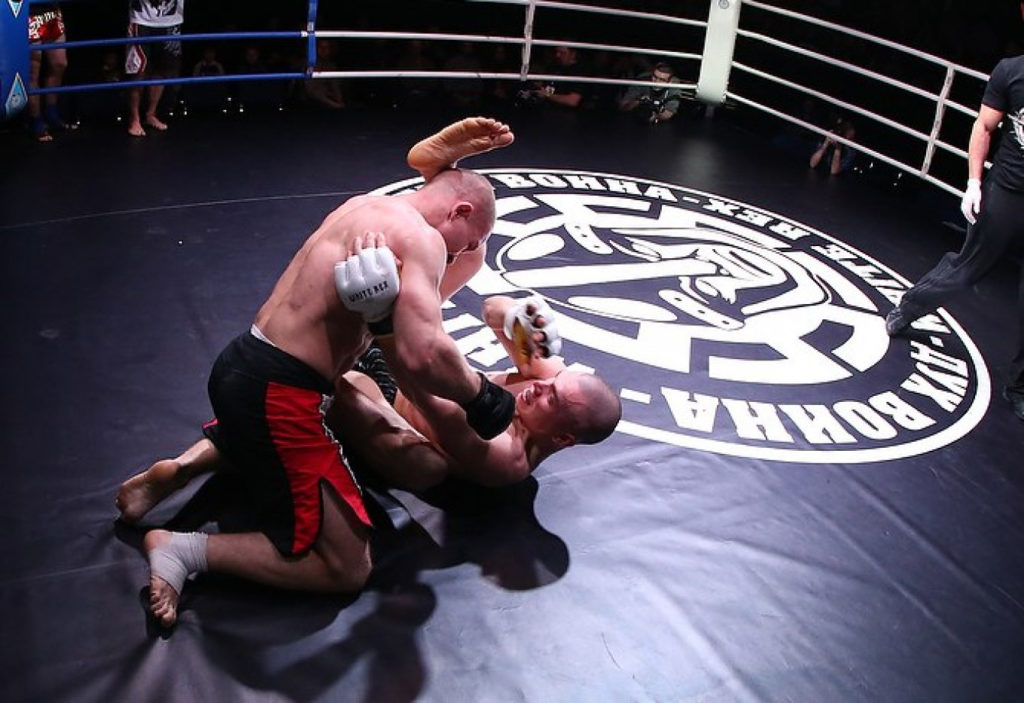
White Rex (WR), a Russian clothing brand and organizer of martial arts tournaments founded in 2008 by Denis Nikitin, has become an international white-supremacist neo-Nazi network. WR has staged dozens of tournaments in Russia and Europe since its establishment, intended, according to the brand, to promote the “spirit of the warrior” in the “White Peoples of Europe” and the “anchoring of sport in the healthy part of our European youth.”[266] In advertising videos, WR makes use of martial symbolism, including Nazi runes forbidden in Germany. The logo consists of a stylized Viking against the background of a so-called Kolovrat, a sun symbol used by Russian neo-Nazis that is reminiscent of the swastika or the Black Sun. Also on offer are clothing items featuring allusions to the creed of the white supremacists, the “14 words” (coined by the American David Eden Lane),[267] or sporting the number “88” (which stands for “Heil Hitler”).
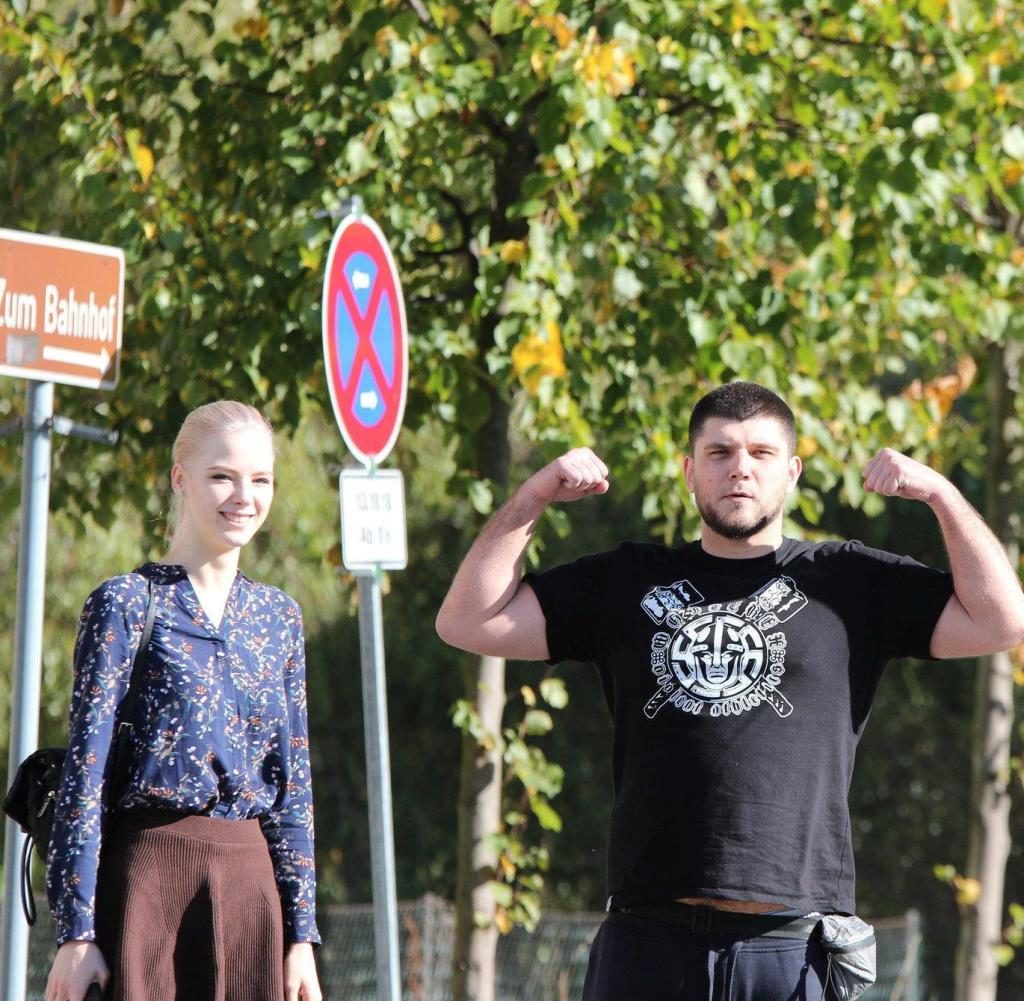
The first contacts between the German far right and the Russian White Rex scene came in the early 2010s. In 2011, for example, German neo-Nazi hardcore bands[268] were invited to share the stage with well-known Russian neo-Nazi bands such as “OHS” and “You Must Murder” in Moscow. During the event, White Rex collected donations for imprisoned neo-Nazis.[269] In 2012, the Bavarian Daniel Weigl, former member of the now-forbidden neo-Nazi organization Free Network South (Freies Netz Süd) and founder of the clothing brand Walhall Athletik, led a group of German neo-Nazis to one of the WR tournaments, while the Dortmund neo-Nazi hooligan Timo Kersting was listed in 2013 as a fighter at one of the Russian tournaments.[270]
In 2013, WR expanded its operations to Europe with the foundation of national teams, including in the Czech Republic. In 2013, the first event outside of Russia was scheduled in Rome on the invitation of Casa Pound, featuring mainly fighters from Italy, Germany and Russia.[271] The event was attended by German neo-Nazis like Andy Knape, former chairman of the NPD youth organization Young Nationalists (Junge Nationalisten). Brand founder Nikitin also ran several seminars in Germany and Switzerland with participants rooted in local extreme right-wing organizations and parties.[272]
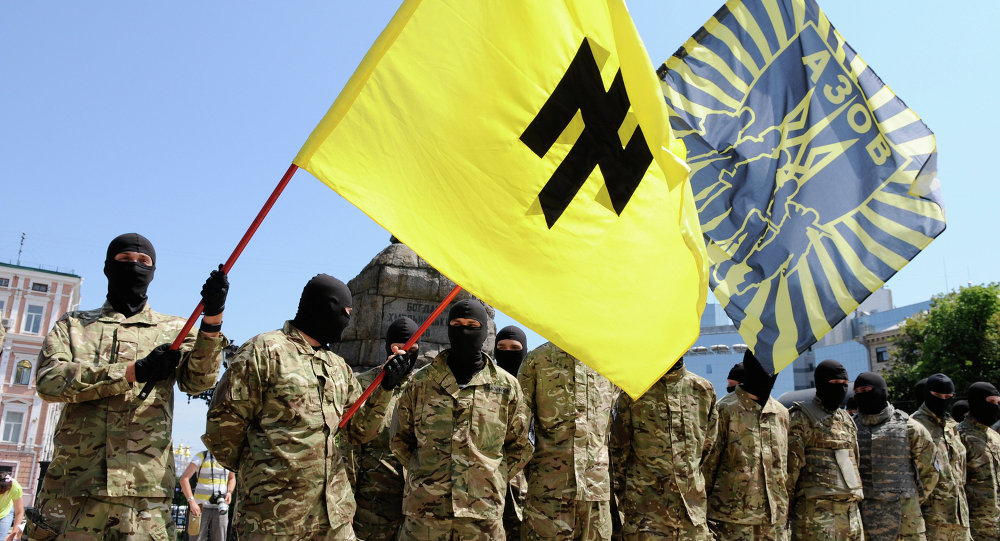
Following the Euromaidan events, Nikitin seems to have sided with anti-Russian neo-Nazi groups in Ukraine, where he appears to live now,[273] but has continued to visit Germany for MMA tournaments and other relevant events. In 2017, he appeared at the largest German far-right rock festival, Rock Against Over-Alienation (Rock gegen Überfremdung), in Thuringia.[274] In 2018, as in previous years, Nikitin fought at the Battle of the Nibelungs (Kampf der Nibelungen), one of the biggest neo-Nazi martial arts tournaments in Germany, which takes place in Ostritz, in Saxony. In 2018, WR appeared as the main sponsor on the tournament posters and Nikitin gave a speech. According to the expert blog Runter von der Matte, the WR team comprised two Ukrainian fighters from the Kyiv-based KRBK team, while the well-known Ukrainian MMA professional Robert Vorobiev appeared as their coach.[275] According to the blog:
The KRBK team, which also participates in hooligan fights for FC Dynamo Kyiv, organizes “Fury MMA” tournaments with the Cossack House in Kyiv. The Cossack House is an important base for the fascist Asov battalion and its parliamentary arm, National Corps.… For the European neo-Nazi scene, the location is an important meeting point. In October 2017, a delegation of the neo-Nazi party “Der III. Weg” visited the premises. Among them was the far-right martial artist Kai-Andreas Zimmermann. The connection of the Kiev KRBK team around Robert Vorobiev to the fascist “Asov battalion” is particularly explosive because Vorobiev is simultaneously giving close combat and MMA seminars to the sports department of the Ukrainian Navy.[276]
As during previous visits to Germany, Nikitin and Vorobiev stayed in Berlin following the Battle of the Nibelungs. These visits were facilitated by Sascha Böhm, who seems to be Nikitin’s manager and driver in Germany. Although shying away from the limelight, Böhm is clearly associated with the neo-Nazi milieu. In 2017, for example, he and his girlfriend attended the Rudolf Hess Memorial March in Berlin Spandau; he could also be identified as a participant in the BN in Ostritz.[277]
Concluding Remarks
In the 2011-2014 period, France seemed to be the main Western European country in which Russian actors sought to promote the national far right. Marine Le Pen’s enthusiasm for Russia and Vladimir Putin, her vocal support for Moscow in the Ukrainian crisis and her quite successful policy of “de-demonizing” or normalizing the National Front constituted an impressive, mutually reinforcing dynamic that impacted Russian leverage over some European political actors. With the growth of Russia-friendly far-right parties throughout Western Europe, Russia’s activism to engage with and promote these proponents seems to have shifted to Germany, Italy and Austria, although the Paris-Berlin axis still occupies a unique place for Moscow given its pivotal role in European decision-making.[278] The role of Euro-sceptic and pro-Russian electoral platforms in the May 2019 European elections give us a better overview of Russia’s potential leverage in a key European institution.
Thanks to Germany’s position as a European leader, Chancellor Merkel’s delicate position and the sudden political activism of its substantial Russian-speaking diaspora, the country has the capacity to deeply impact the relationship between Europe and Russia. Efforts to influence decision-makers are hardly new to the Kremlin: They were a feature of the Soviet decades and were only shelved during the early post-Soviet decades when a young Russia found itself a weak player on the international stage. Nor are such efforts unique to Russia: They are common to many powers interested in seeing their interests well-defended on the European scene. The tools used by different Russian actors to reach out to various German constituencies confirm that the Russian side has developed the skills to make the most of its leverage over Germany, playing on all registers in order to secure its interests.

Political Capital have already published a series of reports on the connections between the far right and Russia in many European countries, including Hungary, Austria, Slovakia, Czech Republic, Poland, Greece and France (the latter one co-authored by Marlene Laruelle). This study, focusing on the connections between the German far right and Russia, is a new piece of this series. This research is conducted by the authors, but Political Capital institute is proud to serve as a publication platform for this extensive and original analysis.
[1]See for instance Veronika Krasheninnikova, member of the High Council of United Russia, “L’Extrême droite européenne est un danger pour la Russie, ” Le Courrier de Russie, March 20, 2019, https://www.lecourrierderussie.com/politique/2019/03/l-extreme-droite-europeenne-est-un-danger-pour-la-russie/.
[2]Maja Heidenreich, Kultur der Partnerschaft: Perspektiven der deutsch-russischen Kulturbeziehungen (Stuttgart: ifa-Edition, 2011), 13.
[3]Among them the annual German-Russian Government Consultation, the Petersburg Dialog, and the German-Russian Strategic Working Group for Business and Finance.
[4]It was after he was voted out of office in 2005 that Schröder “hastily signed the deal” and immediately thereafter became leader of the Nord Stream AG’s shareholder committee, and in 2017 also of Rosneft. Rick Noak, “The Russian Pipeline to Germany that Trump Is So Mad About, Explained,” The Washington Post, July 11, 2018, https://www.washingtonpost.com/news/worldviews/wp/2018/07/11/the-russian-pipeline-to-germany-that-trump-is-so-mad-about-explained.
[5]Mark Landler, “Putin Prompts Split in German Coalition,” New York Times, May 22, 2007, https://www.nytimes.com/2007/05/22/world/europe/22europe.html?_r=1.
[6]“Russische Föderation—Beziehungen zu Deutschland,” Auswärtiges Amt, May 1, 2017, https://web.archive.org/web/20170501084551/https://www.auswaertiges-amt.de/sid_3178BC51B6613220D4F7AEB90134EE81/DE/Aussenpolitik/Laender/Laenderinfos/RussischeFoederation/Bilateral_node.html.
[7]Patrick Beuth, Kai Biermann, Martin Klingst, and Holger Stark, “Bundestags-Hack: Merkel und der Schicke Bär,” Zeit Online, May 10, 2017, https://www.zeit.de/2017/20/cyberangriff-bundestag-fancy-bear-angela-merkel-hacker-russland.
[8]Anne Applebaum et al., “‘Make Germany Great Again’: Kremlin, Alt-Right and International Influences in the 2017 German Elections,” Institute for Strategic Dialogue, Institute of Global Affairs, 2017, http://www.isdglobal.org/wp-content/uploads/2017/12/Make-Germany-Great-Again-ENG-061217.pdf.
[9]Gabriel Gatehouse, “German far-right MP ‘could be absolutely controlled by Russia,’” BBC, April 5, 2019, https://www.bbc.com/news/world-europe-47822835.
[10]Claus Leggewie, Anti-Europäer Breivik, Dugin, al-Suri & Co. (Bonn: Bundeszentrale für politische Bildung, 2017), 89.
[11]Applebaum et al., “‘Make Germany Great Again,’” 10.
[12]Der Flügel, http://www.derfluegel.de.
[13]Joachim Scharloth, “Ist die AfD eine populistische Partei? Eine Analyse am Beispiel des Landesverbandes Rheinland-Pfalz,” Aptum, 2017, http://www.scharloth.com/publikationen/AfD_Scharloth.pdf.
[14]Paul Jobst, “Der Niedergang—der Umsturz—das Nichts. Rassistische ‘Demagogie’ und suizidale Perspektive in Björn Höckes Schnellrodaer IfS-Rede,” in Kulturkampf von rechts. AfD, Pegida und die Neue Rechte, ed. Helmut Kellershohn and Wolfgang Kastrup (Munster: Unrast, 2016), 122–146.
[15]Philip Kuhn, “Empörung über Gauland: ‘Perfide AfD-Strategie, deutsche Geschichte umzuschreiben,’” Die Welt, June 3, 2018, https://www.welt.de/politik/deutschland/article176936864/Kritik-an-Gauland-SPD-General-Klingbeil-sieht-perfide-AfD-Strategie.html.
[16]Melanie Amann, “AfD: Rechter Flügel wirft rechtsaußen Poggenburg raus,” Spiegel Online, August 10, 2018. http://www.spiegel.de/politik/deutschland/afd-rechter-fluegel-wirft-rechtsaussen-poggenburg-raus-a-1222531.html.
[17]“CDU/CSU Remains Strongest Parliamentary Group in the Bundestag Despite Losses,” German Bundestag, September 27, 2017, https://www.bundestag.de/en/#url=L2VuL2RvY3VtZW50cy90ZXh0YXJjaGl2ZS9lbGVjdGlvbi0yMDE3LzUyNzI4NA==&mod=mod453306.
[18]Günther Lachmann, “Positionspapier: Die AfD will zurück zu Bismarcks Außenpolitik,” Die Welt, September 10, 2013, https://www.welt.de/politik/deutschland/article119895035/Die-AfD-will-zurueck-zu-Bismarcks-Aussenpolitik.html; Applebaum et al., “‘Make Germany Great Again,’” 10.
[19]See the AfD party program of September 24, 2017: https://www.afd.de/wp-content/uploads/sites/111/2017/08/AfD_Wahlprogramm_2017_A5-hoch.pdf.
[20]“AfD-Parteitag: ‘Die Krim ist nun einmal Ur-Russisches Territorium.’” Die Welt, June 17, 2017, https://www.welt.de/politik/deutschland/article165650240/Die-Krim-ist-nun-einmal-ur-russisches-Territorium.html.
[21]“Parteinachwuchs von AfD und Putin-Partei kooperieren,” Deutsche Welle, April 23, 2016, https://www.dw.com/de/parteinachwuchs-von-afd-und-putin-partei-kooperieren/a-19210127.
[22]Friedrich Schmidt, “Oligarch Malofejew: Zurück zu Zar und Bismarck,” Frankfurter Allgemeine Zeitung, March 12, 2016, http://www.faz.net/1.4118520.
[23]Justus Bender and Morten Freidel, “AfD-Russlandreise: ‘Petry ließ sich kaufen,’” Frankfurter Allgemeine Zeitung, May 22, 2018, http://www.faz.net/1.5602127.
[24]Severin Weiland, “Rechtspopulisten: Wie die AfD mit Russland liebäugelt,” Spiegel Online, December 15, 2015, http://www.spiegel.de/politik/deutschland/afd-vize-alexander-gauland-will-kein-geld-von-russland-a-1067703.html.
[25]Melanie Amann and Pavel Lokshin, “Moscow’s Fifth Column: German Populists Forge Ties with Russia,” Spiegel Online, April 27, 2016, http://www.spiegel.de/international/germany/german-populists-forge-deeper-ties-with-russia-a-1089562.html; Weiland, “Rechtspopulisten.”
[26]Ibid.
[27]Other attendees included Natalya Narochnitskaya, John Laughland “of the Paris-based Russian soft-power think-tank Institute of Democracy and Cooperation,” former SPD politician turned conspiracy author Andreas von Bülow, leader of the right-wing extremist NPD Frank Franz, and Franz’s party colleague Sebastian Schmidtke. See Anton Shekhovtsov, “Far-Right International Conferences in 2014,” Searchlight (Winter 2014), http://www.academia.edu/9862674/Far-Right_International_Conferences_in_2014; “Putins Freunde in Europe,” ZDF.de, http://webstory.zdf.de/putins-geheimes-netzwerk/putins-freunde-in-europa/.
[28]Yakunin founded the DOC with political scientist Peter W. Schulze and the Austrian lawyer and ex-Secretary General of the Council of Europe Walter Schwimmer. “Managing Director of Yakunin’s Berlin Foundation DOC is the Geneva-based Leonhard O’Brien, whose company ‘Salamander Group’ specializes in Liechtenstein foundations and is based in the British Virgin Islands. Within a few weeks, the name of the foundation organized as non-profit Ltd. had changed several times. DOC emerged from the Munich-based asset management company AD HOC 16/1, which in turn was founded by SHS Asset Management. SHS belongs to the group of Munich lawyer Stefan Schlawien and his partners.” ZDF.de, “Putins Freunde in Europe.”
[29]Ibid.
[30]Andreas Rossbach, “Warum AFD-Politiker auf der Krim sind,” Der Freitag, February 4, 2018, https://www.freitag.de/autoren/andreas-rossbach/will-die-afd-die-krim-zurueck; Mona Jaeger and Friedrich Schmidt, “Frauke Petry besucht Moskau: Zu Gast bei Freunden,” Frankfurter Allgemeine, February 21, 2017, http://www.faz.net/aktuell/politik/inland/frauke-petry-besucht-nationalisten-in-moskau-14889021.html.
[31]Severin Weiland, “Moskau-Trip: Bundestagsverwaltung will Erklärung für AfD-Reise mit Privatjet,” Spiegel Online, May 30, 2018, http://www.spiegel.de/politik/deutschland/afd-bundestag-will-infos-zu-moskau-flug-von-frauke-petry-a-1210189.html.
[32]“AfD: Von Storch und Gauland treffen russische Abgeordnete,” Handelsblatt, January 26, 2018, https://www.handelsblatt.com/politik/deutschland/afd-bundestagsabgeordnete-von-storch-und-gauland-treffen-russische-abgeordnete/20897470.html?ticket=ST-4691403-ON2FdDSBTAcecW9W2prp-ap1; Jens Schneider, “Alexander Gaulands seltsame Verwandlung,” Süddeutsche Zeitung, November 28, 2015, https://www.sueddeutsche.de/politik/alternative-fuer-deutschland-die-verwandlung-1.275789; Dietmar Neuerer, “Beatrix von Storch: AfD-Europaabgeordnete im Zwielicht,” Handelsblatt, September 22, 2014, https://www.handelsblatt.com/politik/deutschland/beatrix-von-storch-afd-europaabgeordnete-im-zwielicht/10736364-all.html.
[33]The German-Russian Parliamentary Group consists of around 70 German and 70 Russian members.
[34] “Vorsitz der Deutsch-Russischen Parlamentariergruppe,” website of AfD MP Robby Schlund, June 15, 2018, http://robby-schlund.de/2018/06/15/vorsitz-der-deutsch-russischen-parlamentariergruppe/.
[35]Ibid.
[36]Facebook page of Robby Schlund, https://www.facebook.com/robby.schlund.
[37]Anton Shekhovtsov, “The Far Right International Russian Conservative Forum to Take Place in Russia,” Anton Shekovtsov (blog), March 10, 2015. https://anton-shekhovtsov.blogspot.com/2015/03/freedom-party-of-austria-will.html.
[38]Jadwiga Rogoża, “The Kremlin ‘Hosts’ the European Extreme Right,” Center for Eastern Studies (OSW), March 25, 2015, https://www.osw.waw.pl/en/publikacje/analyses/2015-03-25/kremlin-hosts-european-extreme-right.
The list of participants is available at “Forum natsistov v Peterburge: priekhal Mil’chakov, Le Pen i ‘Iobbik’ reputatsiei riskovat’ ne stali,” Unian, March 23, 2015, https://www.unian.net/world/1058622-forum-natsistov-v-peterburge-priehal-milchakov-le-pen-i-yobbik-reputatsiey-riskovat-ne-stali.html.
[39]Ben Nimmo, “The Kremlin’s Amplifiers in Germany: The Activists, Bots, and Trolls that Boost Russian Propaganda,” Atlantic Council’s Digital Forensic Research Lab, June 22, 2017, https://medium.com/dfrlab/the-kremlins-amplifiers-in-germany-da62a836aa83; Monika L. Richter, “The Kremlin’s Platform for ‘Useful Idiots’ in the West: An Overview of RT’s Editorial Strategy and Evidence of Impact,” European Values, September 18, 2017, https://www.europeanvalues.net/wp-content/uploads/2017/09/Overview-of-RTs-Editorial-Strategy-and-Evidence-of-Impact.pdf; Susanne Spahn, “Russischsprachige im Fokus: Wie Russland und die AfD Einfluss nehmen,” ISPSW Strategy Series 548 (May 2018), http://www.ispsw.com/wp-content/uploads/2018/05/548_Spahn.pdf; Applebaum et al., “‘Make Germany Great Again.’”
[40]Kyle Taylor, “Europeans favoring right-wing populist parties are more positive on Putin,” Pew Research Center, January 24, 2017, http://www.pewresearch.org/fact-tank/2017/01/24/europeans-favoring-right-wing-populist-parties-are-more-positive-on-putin/.
[41]Frank Herold, “Auslandsmedien im Informationskrieg: Russia Today will nicht informieren, sondern verunsichern,” Der Tagesspiegel, May 27, 2018, https://www.tagesspiegel.de/medien/auslandsmedien-im-informationskrieg-russia-today-will-nicht-informieren-sondern-verunsichern/22599796.html.
[42]Picked from the headlines during a one-month period in June-July 2018.
[43]“‘There Are No Prospects for Merkel’s Policy Anymore’—Says Expert,” Radio Sputnik, July 5, 2018. https://soundcloud.com/radiosputnik/there-are-no-prospects-for-merkels-policy-anymore-expert.
[44]“Willy Wimmer erwartet baldigen Showdown: ‘Frau Dr. Merkel gehört vom Platz gestellt,’” RT Deutsch, June 5, 2018, https://deutsch.rt.com/meinung/71504-willy-wimmer-frau-dr-merkel/.
[45]“‘End of Europe’: Merkel’s Union Partner Accused of ‘German Brexit’ Plot,” Sputnik International, June 24, 2018, https://sputniknews.com/europe/201806241065721755-germany-refugee-merkel-csu-spd/.
[46]“EU Turns Into Scattered Archipelago Failing to Find Migration Solutions,” Sputnik International, June 24, 2018, https://sputniknews.com/europe/201806241065729230-eu-migration-solution/.
[47]“‘Damit können sich die Ostländer identifizieren’: Björn Höcke über sein Rentenkonzept,” RT Deutsch, July 1, 2018, https://www.youtube.com/watch?v=f9nyfCEdABU.
[48]Harald Neuber, “Linke, Nichtwähler und AfDler bei RT Deutsch,” Telepolis, September 22, 2015, https://www.heise.de/tp/features/Linke-Nichtwaehler-und-AfDler-bei-RT-Deutsch-3375581.html.
[49]Nimmo, “The Kremlin’s Amplifiers in Germany.”
[50]Ibid.
[51]Applebaum, “‘Make Germany Great Again,’” 6.
[52]Henk van Ess and Jane Lytvynenko, “This Russian Hacker Says His Twitter Bots Are Spreading Messages to Help Germany’s Far Right Party in the Election,” BuzzFeed News, September 24, 2017, https://www.buzzfeednews.com/article/henkvaness/these-russian-hackers-say-theyre-using-twitter-bots-to-help.
[53]Matthew Choi, “U.S. Blacklists Russian Entities Tied to Election Meddling,” Politico, September 20, 2018, https://www.politico.com/story/2018/09/20/trump-blacklists-russian-entities-meddling-833012.
[54]“Oligarchenfirma Verbreitet AfD-Wahlwerbung,” ZDF, May 29, 2018, https://www.zdf.de/politik/frontal-21/pressemitteilung-oligarchenfirma-verbreitet-afd-werbung-100.html.
[55]Adel Kalinichenko, “Advertising for neo-Nazis,” The New Times, September 29, 2017, https://newtimes.ru/articles/detail/119403/.
[56]Ibid.
[57]Between 1950 and 2014, a total of 4,517,052 late repatriates from Eastern European countries and their relatives resettled in the Federal Republic, of whom 2,369,506 came from the former USSR. “Sachstand: Russlanddeutsche in der Bundesrepublik—Zahlen, Rechtsgrundlagen und Integrationsmaßnahmen,” Wirtschaftliche Dienste, Deutscher Bundestag, 2016, https://www.bundestag.de/blob/424502/e534deaef41f3f1f1efcf098f64cb013/wd-3-036-16-pdf-data.pdf, 3.
[58]Spahn, “Russischsprachige im Fokus.”
[59]Stephan Stuchlik and Lutz Polanz, “Russlanddeutsche und die AfD: Die neue Lieblingspartei der Aussiedler?” Das Erste, May 16, 2017, https://www1.wdr.de/daserste/monitor/sendungen/russlanddeutsche-102.html.
[60]Applebaum et al., “‘Make Germany Great Again,’” 17.
[61]Bastian Schlange, “Russlanddeutsche und die AfD: die konservative Alternative,” Correctiv (blog), May 23, 2017, https://correctiv.org/blog/ruhr/artikel/2017/05/23/ltw-russlanddeutsche-waehlen-afd-nrw/.
[62]“Bundesweite Bewegung ‘Russlanddeutsche für die AfD’ gegründet,” Russlanddeutsche für AfD NRW, April 29, 2018, https://russlanddeutsche-afd.nrw/aktuelles/2018/04/bundesweite-bewegung-russlanddeutsche-fuer-die-afd-gegruendet/.
[63]Facebook page of Robby Schlund, https://www.facebook.com/media/set/?set=a.1650147658355873. Archived at http://archive.is/UaEQO.
[64]Katja Riedel, Andrea Becker, Georg Heil, and Sebastian Pittelkow, “Die Russland-Verbindungen der AfD,” tagesschau.de, August 16, 2017, https://www.tagesschau.de/inland/afd-russland-101.html.
[65]Eugen Schmidt, “Krim-Reise von AfD-Landtagsabgeordneten,” Russlanddeutsche für AfD NRW, January 20, 2018, https://russlanddeutsche-afd.nrw/aktuelles/2018/01/krim-reise-von-afd-landtagsabgeordneten/.
[66]Ibid. The delegation included Roger Beckamp, Dr. Christian Blex, Helmut Seifen, Nick Vogel, Dr. Hugh Bronson, Harald Laatsch, Gunnar Lindemann, Rainer Balzer and Eugen Schmidt.
[67]Ingo Salmen, “Bernd Pachal aus Marzahn-Hellersdorf: Weihnachtsmarkt-Video zieht Hass-Kommentare nach sich,” Der Tagesspiegel, December 16, 2016, https://www.tagesspiegel.de/berlin/bernd-pachal-aus-marzahn-hellersdorf-weihnachtsmarkt-video-zieht-hass-kommentare-nach-sich/14989222-2.html.
[68]Lisa McMinn, “Nach der Berlin-Wahl: Zu rechts für die AfD,” tagesspiegel.de, September 22, 2016, www.tagesspiegel.de/berlin/nach-der-berlin-wahl-zu-rechts-fuer-die-afd/14588990.html.
[69]Christoph Kluge, Tilman Steffen, and Steffen Dobbert, “Russland-Sanktionen: Links-Rechts-Allianz auf der Krim,” Zeit Online, April 19, 2018, https://www.zeit.de/politik/ausland/2018-04/russland-sanktionen-wirtschaftskonferenz-krim-afd-linke/komplettansicht.
[70]Wolfgang Storz, “‘Querfront’—Karriere eines politisch-publizistischen Netzwerks,” Otto Brenner Stiftung, August 15, 2015, https://www.otto-brenner-stiftung.de/wissenschaftsportal/informationsseiten-zu-studien/studien-2015/querfront/.
[71]Ken FM, ken.fm; Golos Germanii, https://golos-germanii.ru/.
[72]Kirsten Ripper, “AfD-Politiker: ‘Die Krim ist nicht besetzt,’” Euronews, February 5, 2018, http://de.euronews.com/2018/02/05/afd-poltiker-die-krim-ist-nicht-besetzt-.
[73]A Facebook post by Gunnar Lindemann reads: “Meeting with president of the Crimean republic Sergey Aksyonov, deputy president of the Crimean Republic Igor Nikolaevich, deputy president of the Crimean Republic Alla Pashkunova, minister of economy of the Crimean Republic Natalia Chaban, minister of culture of the Crimean Republic Arina Novoselskaya, deputy Yuri Gempel, and representative of the Russian Foreign Ministry Sergey Lankin.” Facebook page of Gunnar Lindemann, February 8, 2018, https://www.facebook.com/afdlindemann/posts/1130359570439390. Archived version at http://archive.is/qVwmd.
[74]Andreas Rossbach, “Warum AFD-Politiker auf der Krim sind,” Der Freitag, February 4, 2018, https://www.freitag.de/autoren/andreas-rossbach/will-die-afd-die-krim-zurueck.
[75]A successor organization to the Crimean Association of Soviet-Germans, founded in 1989/1990, and renamed Rebirth Republican Society of the Germans of the Crimea in 1993.
[76]Original URL: http://deutsche-krim.ru/narodnaya-diplomatiya/. Archived version: https://web.archive.org/web/20180303061441/http://deutsche-krim.ru/narodnaya-diplomatiya/.
[77]Facebook page of Andreas Maurer, https://www.facebook.com/andreas.maurer.522.
[78]Facebook page of Hendrik Rosenlund, https://www.facebook.com/profile.php?id=100014011124736.
[79]Kluge, Steffen, and Dobbert, “Russland-Sanktionen.”
[80]The “Volksdiplomatie” Facebook page (https://www.facebook.com/pg/volksdiplomatie), as well as numerous other websites and blogs predominantly dealing with topics concerning the Donbas, are administered by Frank Gottschlich.
[81]Facebook post by “Support Ost-Wölfe 15:23,” August 19, 2017, https://www.facebook.com/ostwolf1523/posts/2158675121025910. Archived version at http://archive.is/xad7v; Facebook post by Andreas Maurer, November 4, 2018, https://www.facebook.com/photo.php?fbid=2101674519877837. Archived version at https://ibb.co/j0V9hf.
[82]For example, on June 11, 2017, he appeared at a Euro-Rus BBQ in Dendermonde, Belgium with a whole cast of Russian diplomats, among them Consul-General of the Russian Federation in Belgium (Antwerp) Evgeny Egorov; Vice-Consul of the Russian Federation in Belgium (Antwerp) Alexey Kunitsky; Assistant to the Ambassador of the Russian Federation in Belgium (Ukkel) and Head of Protocol Andrey Telegin; adviser of the Ambassador of the Russian Federation in Belgium (Ukkel) Dmitry Michailov; and Father Daniel Maes (Syria). Facebook post by Kris Roman, June 11, 2016, https://www.facebook.com/kris.roman.7/media_set?set=a.10213327413556863.1073742371.1143833637&type=3. Archived version at http://archive.is/3n08t.
[83]“Delegaty iz stran ES i Abkhazii vozlozhili tsvety k memorial pogibshim zhiteliam Donbassa,” Dan News, May 12, 2018, https://dan-news.info/obschestvo/delegaty-iz-stran-es-i-abxazii-vozlozhili-cvety-k-memorialu-pogibshim-zhitelyam-donbassa.html. Archived version at http://archive.is/aqTWM.
[84]Jean-Charles Fays, “Linken-Kreisfraktionschef soll mandat abgeben: Quakenbrücker Wahlfälschung: Andreas Maurer verurteilt,” Osnabrücker Zeitung, June 11, 2018, https://www.noz.de/lokales/samtgemeinde-bersenbrueck/artikel/1257710/quakenbruecker-wahlfaelschung-andreas-maurer-verurteilt.
[85]Facebook video by Andreas Maurer, October 29, 2018, https://www.facebook.com/andreas.maurer.522/videos/vb.100001059296674/2091875677524388/?type=3.
[86]Russian “People’s Diplomacy” website, www.publicdiplomacy.su. Archived version at http://archive.is/DEl37.
[87]“Fond razvitiia institutov grazhdanskogo obshchestva ‘Narodnaia diplomatiia,’ OGRN 1107799003190,” OPRF, 2016, http://grants2016.oprf.ru/operators/inpgo/requests/zhurnal/rec1291/.
[88]Anton Shekhovtsov, “Far-Right Election Observation Monitors in the Service of the Kremlin’s Foreign Policy,” in Eurasianism and the European Far Right. Reshaping the Europe–Russia Relationship, ed. Marlene Laruelle (Lanham, MD: Lexington, 2015).
[89]German Center for Eurasian Studies, http://germancenter.net/.
[90]Both Marlene Laruelle and Anton Shekhovtsov have extensively discussed the ECAG and related organizations such as CIS-EMO and the Belgian Eurasian Observatory for Democracy and Elections (EODE) that have been engaged in “independent” electoral observation. See Shekhovtsov, “Far-Right Election Observation Monitors.”
[91]Riedel et al., “Die Russland-Verbindungen der AfD.”
[92]Report by the German Federal Intelligence Service and the Federal Office for the Protection of the Constitution (Bundesamt für Verfassungsschutz, BfV).
[93]“Primaries in Donbass: Succesful Observation Mission,” German Center for Eurasian Studies, October 1, 2016, http://germancenter.net/2016/10/01/primaries-donbass-succesful-observation-mission/.
[94]“Vorwahlen im Donbass: Erfolgreiche Beobachtungsmission,” Katehon, October 2, 2016, http://katehon.com/de/news/vorwahlen-im-donbass-erfolgreiche-beobachtungsmission.
[95]Geopolitika, geopolitika.rs.
[96]Journal of Eurasian Affairs, http://www.eurasianaffairs.net/.
[97]As evidenced by Journal of Eurasian Affairs 5, no. 1 (2018): 2, http://www.eurasianaffairs.net/magazine/. Direct link to document at https://issuu.com/altuhoff/docs/ea-5-web/2.
[98]The organization’s website, www.greater-europe.org, was called Center for Continental Cooperation/Think Tank as of April 2016 and was renamed to Center for Eurasian Studies in 2017 before receiving its current name, as can be seen by several successive snapshots of the website: http://archive.is/http://greater-europe.org/.
[99]Bernhard Weidinger, Fabian Schmid, and Péter Krekó, “Russian Connections of the Austrian Far-Right,” Political Capital, April 2017, http://www.politicalcapital.hu/pc-admin/source/documents/PC_NED_country_study_AT_20170428.pdf, 35.
[100]The following partner organizations mentioned on the AMES website have been recorded over the course of time, some of them clearly among the ideological cadres of the German far right: Center for Eurasian Studies, Eurasian Movement of the Russian Federation, the Workshop of Eurasian Ideas Fund, Valdai Discussion Club, Institute for State Policy (Institut für Staatspolitik), Suworow Institute, Moscow State Institute of International Relations, Compact Magazine, Russian International Affairs Council (RIAC), Europe Identity, Identitarian Movement (Identitäre Bewegung), Renovamen Publishing (Renovamen-Verlag), Byzantine Club, Young German, Arcadi, the IV International Anti-Fascist Conference (IAC) in the Lugansk People’s Republic. The AfD and Antaios Publishing (Antaios Verlag) were mentioned not under “Partners” but under “Links.” Archived version of the Center for Continental Cooperation website, March 28, 2017, https://archive.fo/xAoEY.
[101]Weidinger, Schmid, and Krekó, “Russian Connections of the Austrian Far-Right,” 35.
[102]Archived version of the Center for Continental Cooperation website, April 16, 2016, https://archive.fo/IUVVJ. See also Weidinger, Schmid, and Krekó, “Russian Connections of the Austrian Far-Right,” 35.
[103]Besides Kofner, listed members of the AMES currently include Algis Klimaitis (Vilnius), Eliseo Bertolasi (Italy), Olga Zinovieva (Germany), Charles Bausman (USA), Patrick Poppel (Austria), Alex Khamidov (“Cerdagne”), Philipp Liehs (Germany), Maximilian Dvorak-Stocker (Austria), Tobias Pfennig (Germany), Alexey Yakovlev (Germany), Alexander Sotnichenko (Russia) and Olga Podberezkina (UK).
[104]Fabian Schmid and Markus Sulzbacher, “Identitäre Grüße aus Moskau: Rechtsextreme Allianz mit dem Osten,” Der Standard, June 10, 2016, https://derstandard.at/2000038542175/Identitaere-Gruesse-aus-Moskau-Rechtsextreme-Allianz-in-den-Osten.
[105]Ares-Verlag, https://www.ares-verlag.com/autoren/.
[106]“Patriotische Plattform neu aufgestellt!” Patriotische Plattform, November 9, 2016, https://patriotische-plattform.de/1404/aktuelles/patriotische-plattform-neu-aufgestellt-2/.
[107]Photos posted on the Suworow Institute website show Patrick Poppel together with Leonid Reshetnikov, who had just recently retired as director of the RISI and subsequently joined the supervisory board of Konstantin Malofeev’s think tank Katehonat a time when Alexander Dugin was still a member of the board. Poppel had appeared with Reshetnikov as speaker at the conference “Worldwide Christian Persecution” on March 10, 2016 in Moscow sponsored by the RISI. At another occasion they can be seen together in Vienna, when Reshetnikov visited the Suworow Institute in October 2016. http://www.suworow.at/berichte/. Archived version at http://archive.is/3p43D.
[108]Mohamed Amjahid, Sabine Beikler, and Jörn Hasselmann, “Friedensbewegung mit Brauntönen,” Der Tagesspiegel, April 21, 2014, https://www.tagesspiegel.de/berlin/neue-montagsdemos-friedensbewegung-mit-brauntoenen/9786662.html.
[109]Valdai Club, www.valdaiclub.com. See also Marlene Laruelle, “Russian Soft Power in France: Assessing Moscow’s Cultural and Business Para-Diplomacy,” Carnegie Council for Ethics in International Affairs, January 8, 2018.
[110]Facebook post by Yuri Kofner, October 21, 2015, https://www.facebook.com/photo.php?fbid=10208284893028928. Archived version.
[111]“Austria far-right activist condemned over swastika,” BBC, April 5, 2019, https://www.bbc.com/news/world-europe-47822454.
[112]Weidinger, Schmid, and Krekó. “Russian Connections of the Austrian Far-Right,” 35.
[113]Danijel Majic, “AfD: Referent vom rechten Rand,” Frankfurter Rundschau, October 24, 2018, http://www.fr.de/politik/afd-referent-vom-rechten-rand-a-1606895.
[114]Roger Griffin and Matthew Feldman, Fascism: The “Fascist Epoch” (Abingdon: Taylor & Francis, 2004), 181.
[115]Stephen Dorril, Blackshirt: Sir Oswald Mosley and British Fascism (London: Penguin Books, 2007), 592.
[116]Website of Manuel Ochsenreiter, http://manuelochsenreiter.com/gallery. Archived version at https://web.archive.org/web/20180825191921/http://manuelochsenreiter.com/gallery.
[117]Website of the “New Horizon” conference, http://newhorizon.ir/. Archived version at http://archive.is/HckTG.
[118]Speakers ‘included World Workers Party member Caleb Maupin, Alt Right journalist Tim Pool, Holocaust denier Kevin Barrett, […] Leonid Savin, and Claudio Mutti […] The banner image for last year’s New Horizon features Aleksandr Dugin.’ Alexander Reid Ross, “The Multipolar Spin: How Fascists Operationalize Left-Wing Resentment,” Southern Poverty Law Center, March 9, 2018, https://www.splcenter.org/hatewatch/2018/03/09/multipolar-spin-how-fascists-operationalize-left-wing-resentment. Archived version at https://web.archive.org/web/20180309225139/https://www.splcenter.org/hatewatch/2018/03/09/multipolar-spin-how-fascists-operationalize-left-wing-resentment.
[119]Website of “Eurasia Rivista.” Archived version, https://web.archive.org/web/20161122221909/http://www.eurasia-rivista.com:80/.
[120]Facebook post by the Eurasian Artists Association, October 3, 2014, https://www.facebook.com/EurasianArtistsAssociation/photos/a.497558750347806/498785800225101/. Archived version at http://archive.is/VNA3o.
[121]“Interview with Manuel Ochsenreiter,” YouTube video, 4:33, posted by “RT Question More,” October 10, 2013, https://www.youtube.com/watch?v=uY2H2QAmBqc.
[122]“RT interviews Manuel Ochsenreiter,” YouTube video, 4:17, posted by “RT Question More,” April 18, 2014, https://www.youtube.com/watch?v=qIG_EsGmfCQ.
[123]“Manuel Ochsenreiter Syria,” YouTube video, 4:42, posted by “Maria Kvantrishvili,” August 22, 2013, https://www.youtube.com/watch?v=yKmucLgdIcI.
[124]Adam Holland, “RT’s Manuel Ochsenreiter,” The Interpreter, March 21, 2014, http://www.interpretermag.com/rts-manuel-ochsenreiter/.
[125]Other speakers included Barbara Rosenkranz, a FPÖ national assembly member, economist and writer Menno Aden, journalist and writer Jan von Flocken, former Bundeswehr colonel Klaus Ulrich Hammel, the anti-Muslim far-right author and speaker Akif Pirinçci, and the historical revisionist writers James Baque from Canada and Walter Post from Germany. “Rosenkranz Bei Deutschen Rechtsextremen,” Dokumentationsarchiv des österreichischen Widerstandes, February 2015, http://www.doew.at/erkennen/rechtsextremismus/neues-von-ganz-rechts/archiv/februar-2015/rosenkranz-bei-deutschen-rechtsextremen.
[126]CGS, https://www.geostrategy.rs/rs/o-nama (accessed September 13, 2018).
[127]Ross, “The Multipolar Spin.”
[128]Center for Strategic Assessment and Forecasts (Tsentr strategicheskikh otsenok i prognozov), http://csef.ru.
[129]“Russlandkongress der AfD-Fraktion in Magdeburg am 12. August 2017,” AFD-Fraktion, http://www.afdfraktion-lsa.de/russlandkongress2017/.
[130]Applebaum et al, “‘Make Germany Great Again,’” 10.
[131]Shaun Walker, Christian Davies and Emily Schultheis, “Polish far-right trial raises spectre of ‘false flag’ tactics,” January 27, 2019, https://www.theguardian.com/world/2019/jan/27/polish-far-right-trial-raises-spectre-of-false-flag-tactics-german-journalist-russia-ukraine-fire-court?CMP=share_btn_tw.
[132]Christian Fuchs and Daniel Müller, “Terrorvorwurf von Mitarbeiter,” January 17, 2019, https://www.zeit.de/politik/deutschland/2019-01/afd-politiker-manuel-ochsenreiter-brandanschlag-ukraine-terror-vorwurf.
[133]Ibid.
[134]The Euro-Rus website existed from January 2008 to August 2016. The Euro-Rus YouTube channel is still active. Original URL: http://www.eurorus.org. Archived version at https://web.archive.org/web/*/http://www.eurorus.org/. Rusmedia (blog), https://eurorushomepage.wordpress.com/. Euro-Rus YouTube channel, https://www.youtube.com/user/eurorustv.
[135]On an archived version of the Euro-Rus website are listed the “European Friends of Belarus,” “European Friends of Iran,” “European Friends of Russia,” “European Friends of Serbia” and “European Friends of Syria,” but only the subsite “European Friends of Serbia” is available as an archived version: https://web.archive.org/web/20110606065115/http://www.eurorus.org:80/index.php?option=com_content&view=section&id=13&Itemid=238&lang=en. See also “2018-08-18 Euro-Rus Russia Tour 2018 interview Anna Ilyasova & Kris Roman,” YouTube video, 1:26:02, posted by “Euro-Rus TV,” October 30, 2018, https://www.youtube.com/watch?v=1Aen5lLJmtY.
[136]Tom Cochez, “Het beloofde blanke land,” Apache, November 10, 2009, https://www.apache.be/2009/11/10/het-beloofde-blanke-land/.
[137]Amongst his “left” contacts are the Linke politician Andreas Maurer, with whom he appeared on various occasions, and Tobias Pfennig of the pseudo-antifascist Anti-Imperialist Action (Anti-Imperialistische Aktion,AIA). Together with Pfennig, Roman attended the Moscow-based cross-front Molotov Club discussion round.
See the Facebook page of the Molotov Club in May 2018, https://www.facebook.com/intnatMolotovClub/. Archived version at http://archive.is/kjw7l.
[138]“2017-06-11 Euro-Rus BBQ ‘Russia Day,’” YouTube, 45:27, posted by “Euro-Rus TV,” June 16, 2017, https://www.youtube.com/watch?v=w63VLBIe-xk.
[139]Facebook post by Kris Roman, June 25, 2015, https://www.facebook.com/photo.php?fbid=10206947741069038. Archived version: http://archive.is/kYHja.
[140]Facebook post by Kris Roman, October 26, 2016, https://www.facebook.com/photo.php?fbid=10210947804588126. Archived version: http://archive.is/qVWiY.
[141]“LIVE: Experții internaționali discută la Chișinău despre viitorul Europei,” Sputnik Moldova, May 26, 2017, https://ro.sputnik.md/society/20170526/12840424/live-experti-chisinau-viitorul-europei.html.
[142]Pierre Malinowski appears to be the partner of Maria Katasanova, poster girl of the Russian far-right Rodina party. In 2015, he, together with Aymeric Chauprade, actively assisted the escape from the Dominican Republic of two pilots who were arrested in 2013 while boarding a plane carrying 26 suitcases of cocaine; an Interpol red notice was issued against him. This does not seem to impede him from frequently traveling between France, and Russia, as his social media activity shows. In November 2018, he could be seen in photos shaking hands with Vladimir Putin, captioned, “What emotion when the President took me by the arm to tell me that he followed my work and that he thanked me profoundly.” A February 2017 photo also shows him with the Night Wolves’ leader, Alexander Zaldostanov, and Russian war veterans. “Dominican Republic Issues Arrest Warrant for French MEP in ‘Air Cocaine’ Case,” France Info, November 23, 2015, https://www.france24.com/en/20151123-air-cocaine-french-mep-arrest-warrant. See also Facebook page of Pierre Malinowski, https://www.facebook.com/pierre.malinowski.7. Facebook post by Pierre Malinowski showing him together with Vladimir Putin, November 11, 2018, https://m.facebook.com/story.php?story_fbid=2467010063326181&id=100000516351988. Archived version at http://archive.is/oRi72. Facebook post by Pierre Malinowski showing him shaking hands with Vladimir Putin, November 14, 2018, https://m.facebook.com/story.php?story_fbid=2471089412918246&id=100000516351988. Archived version http://archive.is/KTGae. Facebook post by Pierre Malinowski showing him together with Alexander Zaldostanov, February 17, 2017, https://m.facebook.com/photo.php?fbid=1639732999387229&id=100000516351988&set=ecnf.100000516351988&source=49. Archived version at http://archive.is/lxjl8.
[143]Facebook post by Kris Roman, June 22, 2017, https://www.facebook.com/photo.php?fbid=10213455377595884. Archived version at http://archive.is/QWk9J.
[144]For example, they have the following Facebook friends in common: Andreas Maurer, Andrey Afanasyev, Dimitri Rempel, Emmanuel Leroy, Iurie Rosca, Leonid Savin, Andrey Iryschkow, Konstantin Dobrilovic and Tim Kirby.
[145]Facebook post by Dragana Trifkovic, October 14, 2015, https://www.facebook.com/TrifkovicDragana/posts/10208193417460984. Archived version at http://archive.is/4FUo0.
[146]Facebook post by Kris Roman, July 1, 2017, https://www.facebook.com/photo.php?fbid=10213554101623923. Archived version at http://archive.is/MMLul.
[147]Facebook post by Kris Roman, May 9, 2017, https://www.facebook.com/photo.php?fbid=10216413306742264. Archived version at http://archive.is/PiWPR.
[148]Facebook post by Maria Katasanova, April 24, 2018, https://www.facebook.com/photo.php?fbid=2091851294424843&set=ecnf.100007999786288&type=3&theater. Archived version at http://archive.is/4NTzO.
[149]Maria Fiedler, “Frohnmaier trifft Sellner: Wie die AfD-Jugend mit den Identitären kungelt,” Der Tagesspiegel, April 22, 2017, https://www.tagesspiegel.de/themen/reportage/frohnmaier-trifft-sellner-wie-die-afd-jugend-mit-den-identitaeren-kungelt/19702108.html.
[150]“Markus Frohnmaier: ‘Krim kommt nicht mehr zurück, das muss man akzeptieren,’” YouTube video, 4:28, posted by “RT Deutsch,” April 20, 2018, https://www.youtube.com/watch?v=DvJGFdPL9fU (accessed September 12, 2018).
[151]“Markus Frohnmaier im RT Deutsch-Gespräch: Wir haben mit NATO-Mandat den Nahen Osten destabilisiert,” YouTube video, 5:54, posted by “RT Deutsch,” December 28, 2016, https://www.youtube.com/watch?v=agTK2a1_F5s (accessed November 13, 2018).
[152]Henry Bernhard, “AfD-Kundgebung in Erfurt ‘Wenn wir kommen, wird aufgeräumt!’” Deutschlandfunk, October 29, 2015, http://www.deutschlandfunk.de/afd-kundgebung-in-erfurt-wenn-wir-kommen-wird-aufgeraeumt.1773.de.html?dram:article_id=335345.
[153]Claudia von Salzen, “AfD-Abgeordnete als ‘Wahlbeobachter’ in Russland—und auf der Krim,” DerTagesspiegel, March 18, 2018, https://www.tagesspiegel.de/politik/praesidentschaftswahl-in-russland-afd-abgeordnete-als-wahlbeobachter-in-russland-und-auf-der-krim/21085526.html.
[154]Maik Großekathöfer, “AfD-Nachwuchs Frohnmaier: Ein junger Mann, der Populist werden will,” Spiegel Online, October 9, 2016, http://www.spiegel.de/spiegel/afd-nachwuchs-markus-frohnmaier-a-1115685.html.
[155]Rafael Binkowski, “Wie Markus Frohnmaier Feuer gefangen hat,” Stuttgarter Zeitung, February 25, 2015, https://www.stuttgarter-zeitung.de/inhalt.aufstrebende-partei-wer-steckt-hinter-der-afd-page1.3df730c1-bfa2-4599-bd89-86e66b5901b6.html.
[156]“Zwei AfD-Jugendorganisationen werden aufgelöst,” tagesschau.de, September 3, 2018, https://www.tagesschau.de/inland/afd-verfassungsschutz-117.html.
[157]Fiedler, “Frohnmaier trifft Sellner.”
[158]Majic, “Referent vom rechten Rand.”
[159]Facebook page of Valentina Bobrova, https://www.facebook.com/profile.php?id=100009340780226.
[160]Facebook page of Mikhail Ochkin, https://www.facebook.com/profile.php?id=100010331472970.
[161]Facebook post by Kris Roman, January 24, 2017, https://www.facebook.com/photo.php?fbid=10211911710765178. Archived version at http://archive.is/EU1ur.
[162]Facebook page of Maksim Markov, https://www.facebook.com/maksim.markov.16. Archived version at http://archive.is/d8b6A. For photos of Maksim Markov, see https://www.facebook.com/maksim.markov.16/photos. Archived version at http://archive.is/Ur6G2.
[163]“Rechtspopulisten: AfD-Jugend und Putin-Jugend verbünden sich,” Spiegel Online, April 23, 2016. http://www.spiegel.de/politik/deutschland/afd-jugend-und-putin-jugend-verbuenden-sich-a-1088721.html.
[164]“Russia Seeks to Influence European Politics Through Youth Wings of Far-Right and Far-Left Parties,” Bellingcat, April 27, 2017, https://www.bellingcat.com/news/uk-and-europe/2017/04/27/russia-seeks-influence-european-politics-working-youth-wings-far-right-far-left-parties/.
[165]United Youth Front, http://omf-russia.ru (formerly http://omfront.ru). The 29-year-old entrepreneur Nikolai Shliamin is president of the Putin-affiliated United Youth Front (Ob”edinennyi molodezhnyi front), founded in January 2016. The deputy chairman of the youth organization is his wife, Ksenia Shliamina. Shliamin welcomed the annexation of Crimea to Russia and called for the establishment of a monument to the controversial Crimea referendum of 2014. Ksenia Shliamina was press spokeswoman of the Novorossija Spasidonbass Foundation, which called for the annexation of Eastern Ukraine to Russia. See ZFD.de, “Putins Freunde in Europe.”
[166]ZFD.de, “Putins Freunde in Europe.”
[167]Facebook post by Ksenia Shliamina, June 25, 2016, https://www.facebook.com/photo.php?fbid=10209993017288722. Archived version at https://archive.is/EOWAu. Ia Papa (ЯПАПА), http://ipapa.pro/.
[168]Alsu Menibayeva, “Shkola molodogo ottsa: v Rossii sozdadut proekt ‘Ia papa,’” RT Russia, February 20, 2017, https://russian.rt.com/russia/article/360880-rossiya-proekt-ya-papa.
[169]Facebook post by Ksenia Shliamina, December 25, 2016, https://www.facebook.com/photo.php?fbid=10211729934270561. Archived version at https://archive.is/XK53H.
[170]“Yesterday a joint meeting of the LDPR (Liberal Democratic Party of Russia), the YUF and the youth wing of the AFD took place. We talked with State Duma Deputy Anton Morozov, a member of the Committee on International Affairs, about the prospects for cooperation between Russia and Germany in the context of sanctions. Meeting organizers: United Youth Front.” Facebook post by Ksenia Shliamina, December 21, 2016, https://www.facebook.com/photo.php?fbid=10211692273289060. Archived version at https://archive.is/Dk4HO.
[171]Jaeger and Schmidt, “Frauke Petry besucht Moskau.”
[172]ZFD.de, “Putins Freunde in Europe.”
[173]Facebook post by Robby Schlund, March 8, 2018, https://www.facebook.com/robby.schlund/posts/1650147811689191. Archived version at http://archive.is/7abcs.
[174]Großekathöfer, “AfD-Nachwuchs Frohnmaier.”
[175]“Dr. Heinrich Groth: 30-jähriges Jubiläum der Rehabilitationsbewegung und der Gesellschaft der Deutschen aus Russland ‘WIEDERGEBURT,’” rd-zeitung.eu, May 15, 2018, http://rd-zeitung.eu/de/dr-heinrich-groth-30-jaehriges-jubilaeum-der-rehabilitationsbewegung-und-der-gesellschaft-der-deutschen-aus-russland-wiedergeburt/.
[176]“Deutscher Bundestag: Drucksache 13/5457. Antwort der Bundesregierung auf die Große Anfrage der Abgeordneten Annelie Buntenbach und der Fraktion BÜNDNIS 90/DIE GRÜNEN,” Deutscher Bundestag, August 28, 1996, http://dip21.bundestag.de/dip21/btd/13/054/1305457.asc.
[177]Christian Neef, “Spätaussiedler Aus Russland: Putins Propagandist in Deutschland,” Spiegel Online, February 6, 2016, http://www.spiegel.de/panorama/leute/russlanddeutsche-im-propagandadienst-von-wladimir-putin-a-1075795.html.
[178]Ibid.
[179]“The Society carried out extensive work on the revival of [German] culture: cultural centers, Sunday schools, and the Hoffnung newspaper were organized. German broadcasts began to appear on Crimean television and radio, and five German Lutheran evangelical communities were created.”—http://deutsche-krim.ru/o-nemeckoy-nka-kryma/. Archived version at https://web.archive.org/web/20180330221308/http://deutsche-krim.ru:80/o-nemeckoy-nka-kryma.
[180]“Deutscher Bundestag Drucksache 18/7770. Kleine Anfrage der Abgeordneten Ulla Jelpke, Wolfgang Gehrcke, Christine Buchholz, Inge Höger, Katrin Kunert, Martina Renner, Jörn Wunderlich und der Fraktion DIE LINKE.
Beteiligung von Russlanddeutschen an Demonstrationen gegen Flüchtlinge,” Deutscher Bundestag, February 26, 2016, http://dip21.bundestag.de/dip21/btd/18/077/1807770.pdf.
[181]Genosse, http://genosse.su. Archived versions at https://web.archive.org/web/20180330001932/http://genosse.su/; http://archive.li/genosse.su.
[182]When in January 2016 a Russian-German girl named Lisa claimed that she had been kidnapped and raped by three foreigners after having gone missing for a day, the case was picked up by Russian officials and media to accuse Germany of tolerating and covering up child abuse, which in turn provoked demonstrations of Russian-Germans in several German cities. Although the police subsequently proved the story was completely made up, the damage had been done: Even Russian foreign minister Sergey Lavrov gave a public statement accusing the German government of covering up the case. See Stefan Meister, “The ‘Lisa Case’: Germany as a Target of Russian Disinformation,” NATO Review, 2016, https://www.nato.int/docu/review/2016/Also-in-2016/lisa-case-germany-target-russian-disinformation/EN/index.htm.
[183]“AfD beschäftigt prorussischen Propagandisten im Bundestag,” FOCUS Online, February 24, 2018, https://www.focus.de/magazin/archiv/politik-afd-beschaeftigt-prorussischen-propagandisten-im-bundestag_id_8514047.html.
[184]Ibid.
[185]“Verfassungsschutz und AfD: Gauland berichtet von drei Gesprächen mit Maaßen,” Der Spiegel, September 11, 2018, http://www.spiegel.de/politik/deutschland/afd-alexander-gauland-berichtet-von-drei-gespraechen-mit-hans-georg-maassen-a-1227567.html.
[186]“Obrashchenie deputata Bundestaga Val’demara Gerdta. Mandat doveriia,” Genosse, http://genosse.su/main/1697-obraschenie-deputata-bundestaga-valdemara-gerdta-mandat-doveriya.html. Archived version: https://web.archive.org/web/20180201210242/genosse.su/main/1697-obraschenie-deputata-bundestaga-valdemara-gerdta-mandat-doveriya.html.
[187]“Volksrat gegründet, AfD-Mann führt: Neuenkirchener Herdt ist Vorsitzender der Russlanddeutschen,” Osnabrücker Zeitung, May 21, 2018, https://www.noz.de/lokales/neuenkirchen-voerden/artikel/1214969/neuenkirchener-herdt-ist-vorsitzender-der-russlanddeutschen-1.
[188]Ibid.
[189]Among them one may notice Roman Vassilenko, deputy foreign minister of Kazakhstan; Bolat Nussupov, ambassador of Kazakhstan to Germany; Sergej Netschajew, ambassador of Russia to Germany; Heinrich Groth, chairman of the Rebirth association; Valeri Dill, Chairman of the People’s Council of Germans in Kyrgyzstan; Ganbat Bontoi Damba, ambassador of Mongolia to Germany; and AfD MP Wilhelm von Gottberg.
Facebook post by Waldemar Herdt, July 16, 2018, https://www.facebook.com/WaldemarHerdtMdB/photos/a.530696600631839.1073741828.498777540490412/624192121282286/?type=3&theater. Archived version at http://archive.is/pFv9c. “The participants, among them Members of Parliament, two members of the Berlin State Parliament, a large number of representatives of the Russian-German association for the AfD, as well as several AfD members, adopted the resolution of the People’s Council of the Russian-Germans.” Waldemar Herdt’s website, https://www.waldemar-herdt.de/newpage4.
[190]Genosse, “Obrashchenie deputata Bundestaga.”
[191]Facebook post by Tobias Nase, February 9, 2018, https://www.facebook.com/photo.php?fbid=571448073206463. Archived version: http://archive.is/J10yT.
[192]See “Members,” Greater Europe, http://greater-europe.org/members.
[193]“Interview with German Group—Antiimperialistische Aktion,” Donbass Föreningen (blog), October 6, 2015, https://donbassforeningen.wordpress.com/2015/10/06/interview-with-german-group-antiimperialistische-aktion/. Archived version at http://archive.is/oQhNz.
[194]“‘Novorossiya’s’ ‘Leftist’ Friends,” The Interpreter, May 30, 2015, http://www.interpretermag.com/novorossiyas-leftist-friends/.
[195]Facebook page of the Anti-Imperialistische Aktion. https://www.facebook.com/antiimperialistische.aktion/.
[196]At the time, the AIA was accompanied by another group called AnaRKomM—Anarchist Soviet Communists Munich (Anarchistische Rätekommunisten München). “Grüne Ballons für Libyen—Soliaktion in München,” YouTube video, 2:00, posted by “Anti-Imperialistische Aktion,” March 28, 2012, https://www.youtube.com/watch?v=odFzhElT4RU.
[197]“E. Ukraine Forces Close-Up: Meet Margarita Seidler, Female Voice for Strelkov’s Cause,” RT International, May 3, 2015, https://www.rt.com/op-ed/254649-margarita-seidler-volunteer-strelkov-battalion/.
[198]“Margarita Seidler, Donetsk—Wer ist schuld am Absturz der Boeing 777,” YouTube video, 8:32, posted by “Anti-Imperialistische Aktion,” July 21, 2014, https://www.youtube.com/watch?v=XGHUvG_wzQo.
[199]Facebook page of Evelin Piètza, https://www.facebook.com/ReinaDeLosDuendes.
[200]The Center for Technology and Society (Zentrum Technik und Gesellschaft) at the Technical University of Berlin conducted a survey among the “Vigils for Peace” participants. According to the results, 38% of participants identified themselves more with the left, while 39% rejected the left-right political schema entirely. Among their preferred parties were The Left, the Pirate Party, and the Alternative for Germany. One-third of participants said they did not vote. Priska Daphi et al., “Occupy Frieden—Eine Befragung von Teilnehmer/innen der “Montagsmahnwachen für den Frieden,” Zentrum Technik und Gesellschaft an der Technischen Universität Berlin, archived version at https://web.archive.org/web/20140714195813/https://protestinstitut.files.wordpress.com/2014/06/occupy-frieden_befragung-montagsmahnwachen_protestinstitut-eu1.pdf, 18 and 19. See also the website of the Vigils for Peace initiative, https://mahnwachen.info/.
[201]Facebook page of the Endgame movement, https://www.facebook.com/EnDgAmEU.
[202]“MH17-Leak: Warum schweigt die Bundesregierung?” RT Deutsch, November 24, 2014, https://deutsch.rt.com/6935/der-fehlende-teil/der-fehlende-part-mh17-leak-warum-schweigt-die-bundesregierung-e09/.
[203]“Ostukraine—zwischen Bomben und humanitärer Hilfe,” YouTube video, 13:52, posted by “RT Deutsch,” March 29, 2015, https://www.youtube.com/watch?v=pH58HyihQJc.
[204]“IIIe congrès antifasciste de Donetsk,” Novorossia Today, May 18, 2015, http://novorossia.today/iiie-congres-antifasciste-de-donetsk/. Archived version at http://archive.is/mAzx4.
[205]That is, organizations that participated in the 4th International Anti-Fascist Conference, http://antifascist-conference.antiimp.org/index.php?module=organisations. Archived version at http://archive.is/r8kMZ.
[206]Facebook page of Donald Courter, https://www.facebook.com/DonCourter.
[207]Students and Youth for a New America, https://www.synamerica.com/.
[208]Photo posted by Tobias Nase on Facebook, June 30, 2018, https://www.facebook.com/photo.php?fbid=651791678505435&set=a.107388272945781. Archived version at http://archive.is/8wkUH.
[209]Facebook page of the Molotov Club, https://www.facebook.com/intnatMolotovClub/. Archived version at http://archive.is/kjw7l.
[210]Video posted on the Facebook page of the Molotov Club, May 1, 2018, https://www.facebook.com/intnatMolotovClub/videos/190801048213895/.
[211]“International Antifascist Forum,” Fact.International, October 14, 2015, http://fact.international/2015/10/international-antifascist-forum/. Archived version at http://archive.is/MQ92P.
[212]Facebook post by Tobias Nase, August 23, 2016, https://www.facebook.com/photo.php?fbid=308473222837284. Archived version at http://archive.is/jeXgs.
[213]https://matrochka.wordpress.com/2016/08/15/rechte-allianzen-aufdecken/#jp-carousel-39010 (website defunct).
[214]Facebook post by Alexander Markovics, February 17, 2018, https://www.facebook.com/photo.php?fbid=2079939862024018. Archived version at http://archive.is/oxyJd.
[215]“Rechte Allianzen aufdecken!” Antifa Aufbau, http://antifa-aufbau.de/portfolio/rechte-allianzen-aufdecken/. Archived version, http://archive.is/I6iu9.
[216]Photo posted by Alexander Markovics on Facebook, October 20, 2017, https://www.facebook.com/photo.php?fbid=1917664538251552. Archived version at http://archive.is/urD4v.
[217]Facebook post by Daria Dugina (Dari Dashjbh Dashjbhtp), October 24, 2017, https://www.facebook.com/photo.php?fbid=1485678238167639. Archived version at http://archive.is/RVQvU.
[218]Photo posted by the Suworow Institute on Facebook, April 22, 2018, https://www.facebook.com/Suworow.Institut/photos/a.775308515860591/1801851009872998/. Archived version at http://archive.is/DyY7l.
[219]In Russia, Ukraine, Latvia, Germany, Bulgaria, Romania, Serbia, Australia, Slovakia, Belarus, Philippines, Bosnia and Herzegovina, Montenegro, Czech Republic and Macedonia.
[220]Matthew A. Lauder, “‘Wolves of the Russian Spring’: An Examination of the Night Wolves as a Proxy for the Russian Government,” Canadian Military Journal 18, no. 3 (Summer 2018), https://www.eurasiareview.com/07072018-wolves-of-the-russian-spring-examination-of-night-wolves-as-proxy-for-russian-government-analysis/.
[221]His wife Mathilde is, according to various Russian sources, the daughter of a director of the Stuttgart Mercedes-Benz company.
[222]Stefan Scholl, “Rocker mit Putins Ruhmesorden,” Berliner Zeitung, April 15, 2015, https://www.berliner-zeitung.de/nachtwoelfe-chef-alexander-saldostanow-rocker-mit-putins-ruhmesorden-896918.
[223]Lauder, “‘Wolves of the Russian Spring,’” 8.
[224]Klaus-Helge Donath, “Wo wir sind, ist Russland,” taz, April 17, 2015, http://www.taz.de/!5012340/.
[225]Lauder, “‘Wolves of the Russian Spring.’”
[226]Peter Pomerantsev, “Forms of Delirium: Peter Pomerantsev Circles the Kremlin,” London Review of Books 35, no. 19 (October 10, 2013), https://www.lrb.co.uk/v35/n19/peter-pomerantsev/forms-of-delirium.
[227]Lauder, “‘Wolves of the Russian Spring,’” 9.
[228]See for instance, for the case of Slovakia, Mitchell A. Orenstein and Peter Kreko, “How Putin’s Favorite Biker Gang Infiltrated NATO,” Foreign Affairs, October 15, 2018, https://www.foreignaffairs.com/articles/russian-federation/2018-10-15/how-putins-favorite-biker-gang-infiltrated-nato.
[229]Facebook post by Rainer Rothfuss, June 13, 2018, https://www.facebook.com/rainer.rothfuss.9/posts/10216688089811539. Archived version at http://archive.is/rd5CL.
[230]Sandra Aid and Silvio Duwe, “Unkritische Berichte: Wenn Frieden für Propaganda missbraucht wird,” NDR.de, November 11, 2017, https://www.ndr.de/fernsehen/sendungen/zapp/Unkritische-Berichte-Wenn-Frieden-fuer-Propaganda-missbraucht-wird,russland1106.html.
[231]Facebook post by Andreas Maurer, August 18, 2017, https://www.facebook.com/andreas.maurer.522/posts/1583425461702748. Archived version at http://archive.is/SHwxr; Facebook post by Andreas Maurer, August 19, 2018, https://www.facebook.com/andreas.maurer.522/posts/1584024681642826. Archived version at http://archive.is/PHG82; “German Center Party Leaders Meet with Night Wolves Leader on Crimea: August 17, 2017,” YouTube video, 0:51, posted by “Christoph Hörstel,” August 19, 2017, https://www.youtube.com/watch?v=G7RTM1PQDtU; “With Night Wolves to Putin Meeting: Christoph Hörstel, German Center, August 18, 2017,” YouTube video, 0:28, posted by “Christoph Hörstel,” August 19, 2017, https://www.youtube.com/watch?v=vJHY-hrVBTg.
[232]A list of all Facebook pages associated with the “Russian-German Wolves,” https://www.facebook.com/search/str/russlanddeutsche+w%C3%B6lfe/keywords_pages; Yuliya Zabyelina, “Russia’s Night Wolves Motorcycle Club: From 1%ers to Political Activists,” Trends in Organized Crime (June 2017), https://www.researchgate.net/publication/317569926_Russia’s_Night_Wolves_Motorcycle_Club_from_1ers_to_political_activists.
[233]Before creating Security Wolf, Zaiser allegedly worked in the so-called “Special Officers Group Berlin” (Sonderoffiziersgruppe Berlin), a German special operations force, between 2001 and 2008. See Katharina Heinrich, “Wer von Russlanddeutschen profitieren will,” Deutschlandfunk, April 4, 2018, http://www.deutschlandfunk.de/deutschland-wer-von-russlanddeutschen-politisch-profitieren.724.de.html?dram:article_id=350215.
[234]Systema is a martial arts form practiced worldwide and originally developed in Russia. It teaches techniques ranging from hand-to-hand combat, knife fighting, and firearms training to survival in extreme situations. In Germany, there were 63 Systema training centers as of 2017, each dedicated to one of the various Systema training styles (Systema Ryabko, ROSS System etc.).
[235]“Russische Schläferzellen? Experte warnt vor russischen Kampfsportschulen in Deutschland,” Focus, May 27, 2017, https://www.focus.de/politik/deutschland/experte-das-sind-schlaeferzellen-sicherheitsgefahr-durch-russische-systema-kampfsportclubs-in-deutschland_id_7183952.html.
[236]Josef Hufelschulte, “Würgen, schlagen, töten lernen,” Focus, May 26, 2014, https://www.focus.de/magazin/archiv/report-wuergen-schlagen-toeten-lernen_id_3870339.html; “Willige in Kampfsport-Clubs? Russischer Geheimdienst geht in Deutschland auf Agenten-Suche,” Focus, May 25, 2014, https://www.focus.de/politik/ausland/agenten-suche-in-deutschland-russischer-geheimdienst-heuert-systema-schueler-an_id_3870926.html.
[237]Wolf Security, https://www.wolfsecurity.ch/. The company record of Wolf Security is available at https://www.firmenwissen.com/en/az/firmeneintrag/8048/1424345456/WOLF_SECURITY_INHABER_D_ZAISER.html.
[238]“Putin’s Rocker: Schweizer boxen im Zeichen der Nachtwölfe,” 20 Minuten, May 8, 2015. Archived version at https://web.archive.org/web/20160425212129/http://www.20min.ch/schweiz/news/story/Schweizer-boxen-im-Zeichen-der-Nachtwoelfe-28314971.
[239]Russian Wolf Security Holding, http://spezpodgotovka.ru/. Archived version at http://archive.is/rZrul.
[240]“Kooperation,” Systema Wolf, https://www.systemawolf.de/center/kooperation/. Archived version at https://www.docdroid.net/3Ev0dv7/kooperation-systema-wolf-webseite.pdf.
[241]Vityaz was formerly a Russian anti-terror unit assembled in 1980 for a mission at the 12th Olympic Summer Games in Moscow, out of which the special unit “Vityaz” emerged. Today, Vityaz is a private training centre led by former commander S.I. Lysyuk that offers training to private security personnel, as well as to special forces.
Original URL: https://www.systemaschweiz.ch/systema-wolf-1/ausbildungszentrum-vityaz/. Archived version at https://web.archive.org/web/20181020203311/https://www.systemaschweiz.ch/systema-wolf-1/ausbildungszentrum-vityaz/.
[242]Josef Hufelschulte, “Würgen, schlagen, töten lernen,” Focus, May 26, 2014, https://www.focus.de/magazin/archiv/report-wuergen-schlagen-toeten-lernen_id_3870339.html.
[243]20 Minuten, “Putin’s Rocker.”
[244]The logo of the Russian-German Wolves can be found at https://www.facebook.com/rwmc.eu/photos/pcb.2007508789478232/2007508602811584. Archived version at http://archive.is/QzL08. The System Wolf logo can be found at https://www.systemaschweiz.ch/systema-wolf/. Archived version at https://web.archive.org/web/20180910132733/https://www.systemaschweiz.ch/systema-wolf/.
[245]Welcome message of the Russian German Wolves MC’s (Russlanddeutsche Wölfe MC Deutschland) website, https://www.rwmc.eu:
“Among many peoples, the wolf is considered a power animal. The German god-father Odin is often depicted with a wolf’s head. Celtic druids revered the wolf’s pronounced sense of family as the protector and leader of his clan. Just like its master and god-father Odin-Wodan, the wolf has a connection to the otherworld and to the different areas of consciousness. It stands for growth and a willingness to learn from people. The wolf inherits a great spiritual power, which it can pass on, thus enabling the human being, corresponding in spirit to the wolf as power animal, to become a teacher for others, and guide them—a ‘Leading Wolf.” The wolf embodies the elemental force of freedom and adventure. The wolf is very much connected with its environment. It perceives the heartbeat of the earth. The moon gives it strength, hence often the symbolic image of a howling wolf under the moonlight. But the wolf also symbolizes the dark side of our existence and reminds humans to acknowledge such. The wolf as a power animal comes when you need strength during confrontations or when you have to acknowledge the strength of a community, without denying yourself or your dreams. The wolf brings spiritual energy and intuition.”
[246]Ibid.
[247]Mia Schmidt, “Identitätstäuschung im Internet: Russlanddeutsche klagen gegen Mitglied,” Stuttgarter Nachrichten, April 22, 2016, https://www.stuttgarter-nachrichten.de/inhalt.identitaetstaeuschung-im-internet-russlanddeutsche-klagen-gegen-mitglied.707c8d34-312a-45e4-8107-3f909af30219.html.
[248]Hufelschulte, “Würgen, schlagen, töten lernen.”
[249]The Suworow Institute is mentioned as cooperation partner of Systema Austria, and vice versa, and hosted a lecture introducing Systema in October 2015. Suworow’s head, Patrick Poppel, visited Systema Austria several times, and interviewed its leader, Alexander Heermann. Systema Austria, https://www.systema-austria.at/coop-partner/national/. Archived version at https://web.archive.org/web/20181022123832/https://www.systema-austria.at/coop-partner/national/; “Partner Organizations of the Suworow Institute,” http://www.suworow.at/befreundete-organisationen/. Archived version at http://archive.is/80u9K; “Wir müssen uns selbst schützen können!” YouTube video, 7:46, posted by “Suworow TV,” January 21, 2016, https://www.youtube.com/watch?v=awn6gNYJ4AE (accessed October 31, 2018).
[250]The documentary bases its inquiries on the testimonies of a former high-ranking Russian FSB agent, called “Igor” to protect his identity, who provides Koch with credible proof of his former activity. Some of the information Igor provided could be proven in the course of Koch’s inquiries; other parts could not be established. Egmont R. Koch, “Putin’s New Cold War—A Russian Spy Blows the Whistle,” ZDF, 2016, https://www.zdf.de/dokumentation/zdfzoom/zdfzoom-putins-kalter-krieg-100.html.
[251]Koch, “Putin’s New Cold War.” Timestamp [7:11]:
Igor: Athletes from Chechnya live in Germany and Austria. They do judo, sambo, martial arts or wrestling. They’re the children of former Kadyrov militants. We snuck them in as spies. We gave them money to donate to local mosques. They quickly assimilated, gaining trust and influence. Contacting them was forbidden for a year. That way, they wouldn’t raise suspicion. After a year, we could assign them duties.
[252]Ibid. Timestamp [24:21]:
Koch: So you also monitor Chechens?
Dugazaev: Yes. Definitely.
K: Do you do that in mosques?
D: Yes. There’s a mosque in Kiel. Many Chechens worship there. Other refugees come too, so it’s always full. I can speak with people from Chechnya. Just a few minutes is enough to see which way they lean, and whether they’re dangerous. These people could come to Chechnya as suicide bombers. We don’t want that. It’s bad for Chechnya.
K: Do you send this information to Chechnya or maybe even to the Russian secret service?
D: We don’t need the secret service. I’m in direct contact with the Chechen president. What he tells me is sufficient.
K: Do you also keep an eye on people, who oppose Kadyrov?
S: (laughs) No. That’s not our goal in Germany, so we don’t do it.
[253]Ibid. Timestamp [18:40]:
Semyonov: Many of them are athletes.
Koch: And they came seeking asylum?
S: I think so. As far as I’m aware they came as refugees seeking asylum.
K: But they are pro-Kadyrov?
S: I’d say so.
K: How can that be?
S: [doesn’t answer]
K: They’re granted asylum because they’re politically persecuted in their own country.
S: [doesn’t answer]
K: So you haven’t heard about cases of tortures in Chechnya?
S: I’ve heard it happens, but not from these people. I read about it.
K: What about the fact that Chechens flee because of this torture and because of Kadyrov’s unjust regime? Is that also news to you?
S: I’m hearing it for the first time from you.
K: For the first time?
S: Yes.
[254]“Kadyrov Shows Some Love to ‘Night Wolves’ Biker Gang,” The Moscow Times, December 21, 2014, www.themoscowtimes.com/news/article/kadyrov-shows-some-love-to-night-wolves-biker-gang/513710.html.
[255]Gabrielle Tétrault-Farber, “Strongman Leader Kadyrov Named Honorary Chief of Chechen Night Wolves,” The Moscow Times, May 24, 2015, www.themoscowtimes.com/news/article/strongman-leader-kadyrov-named-honorary-chief-of-chechen-night-wolves/522231.html; “Russia: Kadyrov Joins the Night Wolves as Chechen Branch Set Up,” YouTube video, 1:05, posted by “Ruptly,” May 25, 2015, https://www.youtube.com/watch?v=NqJvqMMcLuM (accessed October 30, 2018).
[256]“A big surprise in Grozny. There was a large group of teenagers, including Tobias [Pfennig], who were in Grozny. Highly committed young people from home and abroad have organized an important conference under the motto ‘Politics and Religion.’ It was for a great joy for me to see that young people are networking on a political and civil society level and raise their voices.” Facebook post by Andreas Maurer, October 10, 2018, https://www.facebook.com/photo.php?fbid=2064278010284155. Archived version at https://web.archive.org/web/20181022134038/https://www.facebook.com/photo.php?fbid=2064278010284155.
[257]“Very nice days in Grozny with Timur Dugazaev, permanent representative of Ramzan Akhmatovich Kadyrov, President of the Chechen Republic in Germany.” See Facebook post by Andreas Maurer, October 6, 2018, https://www.facebook.com/andreas.maurer.522/posts/2059167084128581. Archived version at http://archive.is/m66f8.
[258]Facebook post by Andreas Maurer, November 4, 2018, https://www.facebook.com/photo.php?fbid=2101674519877837. Archived version at https://ibb.co/j0V9hf.
[259]Facebook video by Andreas Maurer, October 7, 2018, https://www.facebook.com/andreas.maurer.522/videos/vb.100001059296674/2060163060695650.
[260]“Folk Diplomats of Russia, Germany and Italy in Grozny. Happy holiday city of Grozny.”
Facebook post by Andreas Maurer, October 7, 2018, https://www.facebook.com/photo.php?fbid=2060974357281187. Archived version at https://web.archive.org/web/20181022152328/https://www.facebook.com/photo.php?fbid=2060974357281187.
[261]Eliseo Bertolasi’s CV from 2013, http://www.archivio.formazione.unimib.it/DATA/photo/CV%20%20ELISEO%20BERTOLASI%202015-.pdf; ISAG (Instituto di Alti Studi in Geopolitica e Scienze Ausiliare), https://isag-italia.org/. Archived version at https://web.archive.org/web/20180309042224/https://isag-italia.org/; Geopolitica, “Comitato scientifico,” http://www.geopolitica-rivista.org. Archived version at https://web.archive.org/web/20120203225900/http://www.geopolitica-rivista.org/comitato-scientifico/.
[262]Photo posted by Andreas Maurer on Facebook, October 7, 2018, https://www.facebook.com/photo.php?fbid=2060974357281187. Archived version at http://archive.is/9nOYo.
[263]International Affairs (Mezhdunarodnaia zhizn’), https://interaffairs.ru/.
[264]“Eliseo Bertolasi,” CV, http://www.vita.it/it/author/eliseo-bertolasi/48/ (accessed October 22, 2018).
[265]Photo posted by Kris Roman on Facebook, August 2, 2016, https://www.facebook.com/photo.php?fbid=10210111890450795. Archived version at http://archive.is/hU7NL; photo posted by Kris Roman on Facebook, August 2, 2016, https://www.facebook.com/photo.php?fbid=10210111891570823. Archived version at http://archive.is/Pih9X.
[266]Arne Zillmer, “‘White Rex’—Nazimode aus Russland,” Die Zeit, June 22, 2013, https://blog.zeit.de/stoerungsmelder/2013/06/22/white-rex-nazimode-aus-russland_13291.
[267]“We must secure the existence of our people and a future for White children.”
[268]“Brainwash,” “Moshpit” and “Path of Resistance.”
[269]Zillmer, “‘White Rex.’”
[270]“White Rex—Aggressive Clothing Brand,” Belltower News, August 7, 2018, http://www.belltower.news/artikel/white-rex-%E2%80%93-aggressive-clothing-brand-14053.
[271]Johannes Radke, “Kampfsport, Runen, Rassenhass,” Bundeszentrale für politische Bildung, January 14, 2014, http://www.bpb.de/politik/extremismus/rechtsextremismus/176345/kampfsport-runen-rassenhass.
[272]Ibid.
[273]Tweet by Anton Shekhovtsov, October 7, 2018. https://twitter.com/A_SHEKH0VTS0V/status/1049069494243643393. Archived version at http://archive.is/4hoGo.
[274]“‘Rock gegen Überfremdung’: Mindestens 5.000 Neonazis in Themar erwartet,” Belltower News, July 14, 2017, www.belltower.news/artikel/“rock-gegen-überfremdung”-mindestens-5000-neonazis-themar-erwartet-12323; “‘Rock gegen Überfremdung’—weil es Hass ist, muss es die Allgemeinheit bezahlen?” Fussball gegen Nazis, July 5, 2018. http://www.fussball-gegen-nazis.de/artikel/%E2%80%9Erock-gegen-%C3%BCberfremdung%E2%80%9C-%E2%80%93-weil-es-hass-ist-muss-es-die-allgemeinheit-bezahlen-12257.
[275]“Der ‘Kampf der Nibelungen’ 2018—Eine erste Auswertung,” Runter von der Matte (blog), October 26, 2018, https://runtervondermatte.noblogs.org/der-kampf-der-nibelungen-2018-eine-erste-auswertung/. Archived version at http://archive.is/6GHgr.
[276]Ibid; Ukrainian Navy Sports, http://www.navysport.org/.
[277]Runter von der Matte, “Der ‘Kampf der Nibelungen’ 2018.”
[278]The term “Moscow-Paris-Berlin axis,” or alternatively “strategic triangle” has been coined by Marcel van Herpen. Putin’s Propaganda Machine: Soft Power and Russia’s Foreign Policy (Lanham, Maryland: Rowman & Littlefield, 2016).
CovertAction Magazine is made possible by subscriptions, orders and donations from readers like you.
Blow the Whistle on U.S. Imperialism
Click the whistle and donate
When you donate to CovertAction Magazine, you are supporting investigative journalism. Your contributions go directly to supporting the development, production, editing, and dissemination of the Magazine.
CovertAction Magazine does not receive corporate or government sponsorship. Yet, we hold a steadfast commitment to providing compensation for writers, editorial and technical support. Your support helps facilitate this compensation as well as increase the caliber of this work.
Please make a donation by clicking on the donate logo above and enter the amount and your credit or debit card information.
CovertAction Institute, Inc. (CAI) is a 501(c)(3) non-profit organization and your gift is tax-deductible for federal income purposes. CAI’s tax-exempt ID number is 87-2461683.
We sincerely thank you for your support.
Disclaimer: The contents of this article are the sole responsibility of the author(s). CovertAction Institute, Inc. (CAI), including its Board of Directors (BD), Editorial Board (EB), Advisory Board (AB), staff, volunteers and its projects (including CovertAction Magazine) are not responsible for any inaccurate or incorrect statement in this article. This article also does not necessarily represent the views the BD, the EB, the AB, staff, volunteers, or any members of its projects.
Differing viewpoints: CAM publishes articles with differing viewpoints in an effort to nurture vibrant debate and thoughtful critical analysis. Feel free to comment on the articles in the comment section and/or send your letters to the Editors, which we will publish in the Letters column.
Copyrighted Material: This web site may contain copyrighted material the use of which has not always been specifically authorized by the copyright owner. As a not-for-profit charitable organization incorporated in the State of New York, we are making such material available in an effort to advance the understanding of humanity’s problems and hopefully to help find solutions for those problems. We believe this constitutes a ‘fair use’ of any such copyrighted material as provided for in section 107 of the US Copyright Law. You can read more about ‘fair use’ and US Copyright Law at the Legal Information Institute of Cornell Law School.
Republishing: CovertAction Magazine (CAM) grants permission to cross-post CAM articles on not-for-profit community internet sites as long as the source is acknowledged together with a hyperlink to the original CovertAction Magazine article. Also, kindly let us know at info@CovertActionMagazine.com. For publication of CAM articles in print or other forms including commercial internet sites, contact: info@CovertActionMagazine.com.
By using this site, you agree to these terms above.
About the Author

Marlene Laruelle, Ph.D. is an Associate Director and Research Professor at the Institute for European, Russian and Eurasian Studies (IERES), Elliott School of International Affairs, The George Washington University. Dr. Laruelle is also a Co-Director of PONARS (Program on New Approaches to Research and Security in Eurasia) and Director of GW’s Central Asia Program.Dr. Laruelle received her Ph.D. in history from the National Institute of Oriental Languages and Cultures (INALCO) and her “Habilitation” at Sciences-Po in Paris. Dr. Laruelle recently authored Russian Nationalism: Imaginaries, Doctrines, and Political Battlefields (Routledge, 2018) and edited Entangled Far Rights: A Russian-European Intellectual Romance in the 20thCentury (University of Pittsburgh Press, 2018), as well as Eurasianism and the European Far Right: Reshaping the Russia-Europe Relationship (Lexington Books, 2015).
Ellen Rivera is an independent researcher who specializes in the post-war German far right, with a particular focus on post-war anti-communist organizations. In the framework of her research provided for the George Washington University’s Institute of European, Russian, and Eurasian Studies (IERES), she has been studying the current links between proponents of the German and the Russian far right, mostly by means of extensive social network analyses and media monitoring.

